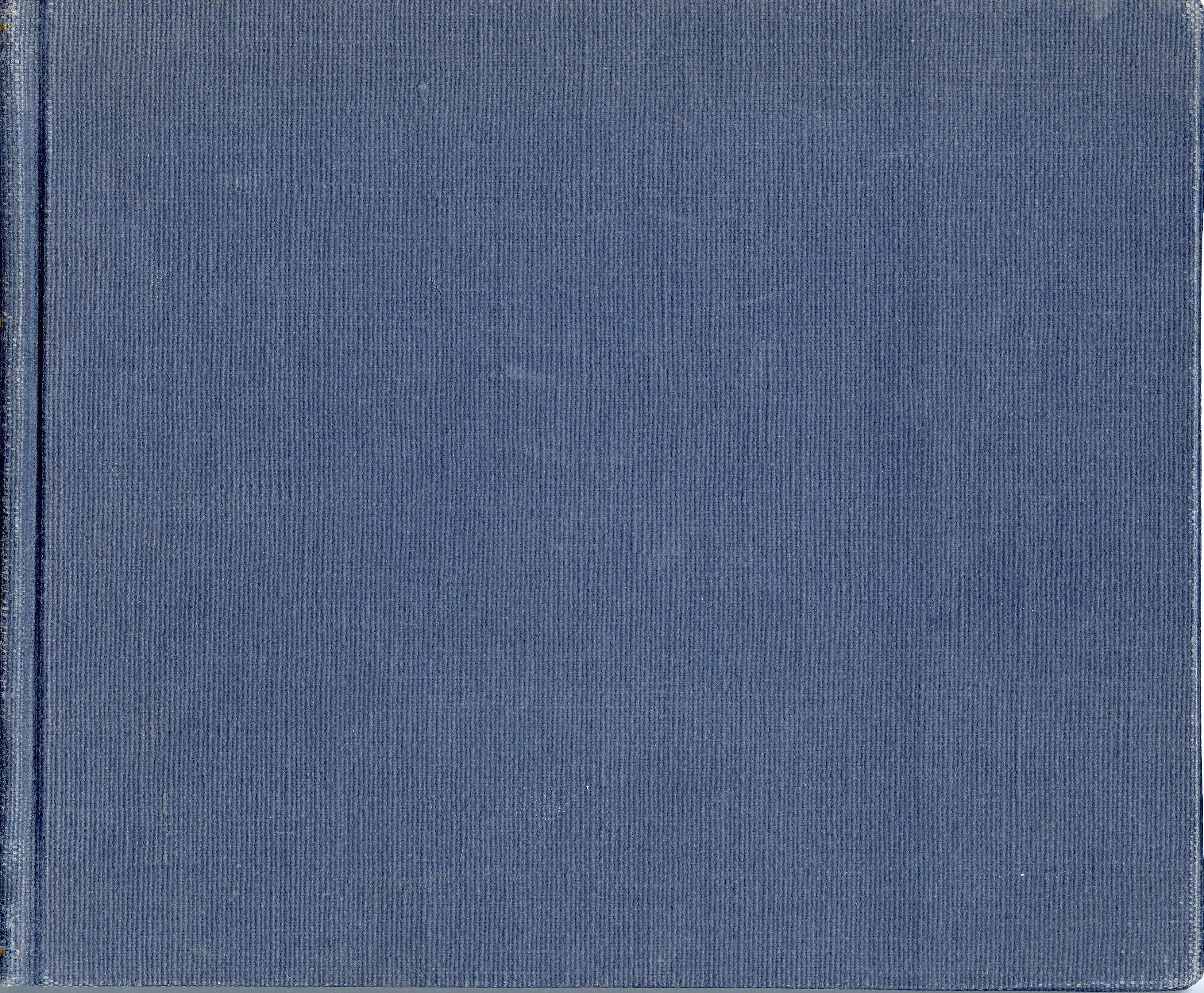

THE RECORD OF
THE
Class of Nineteen Hundred and Five OF
Friends' Central School
1900
FIFTEENTH AND RACE STREETS
1905
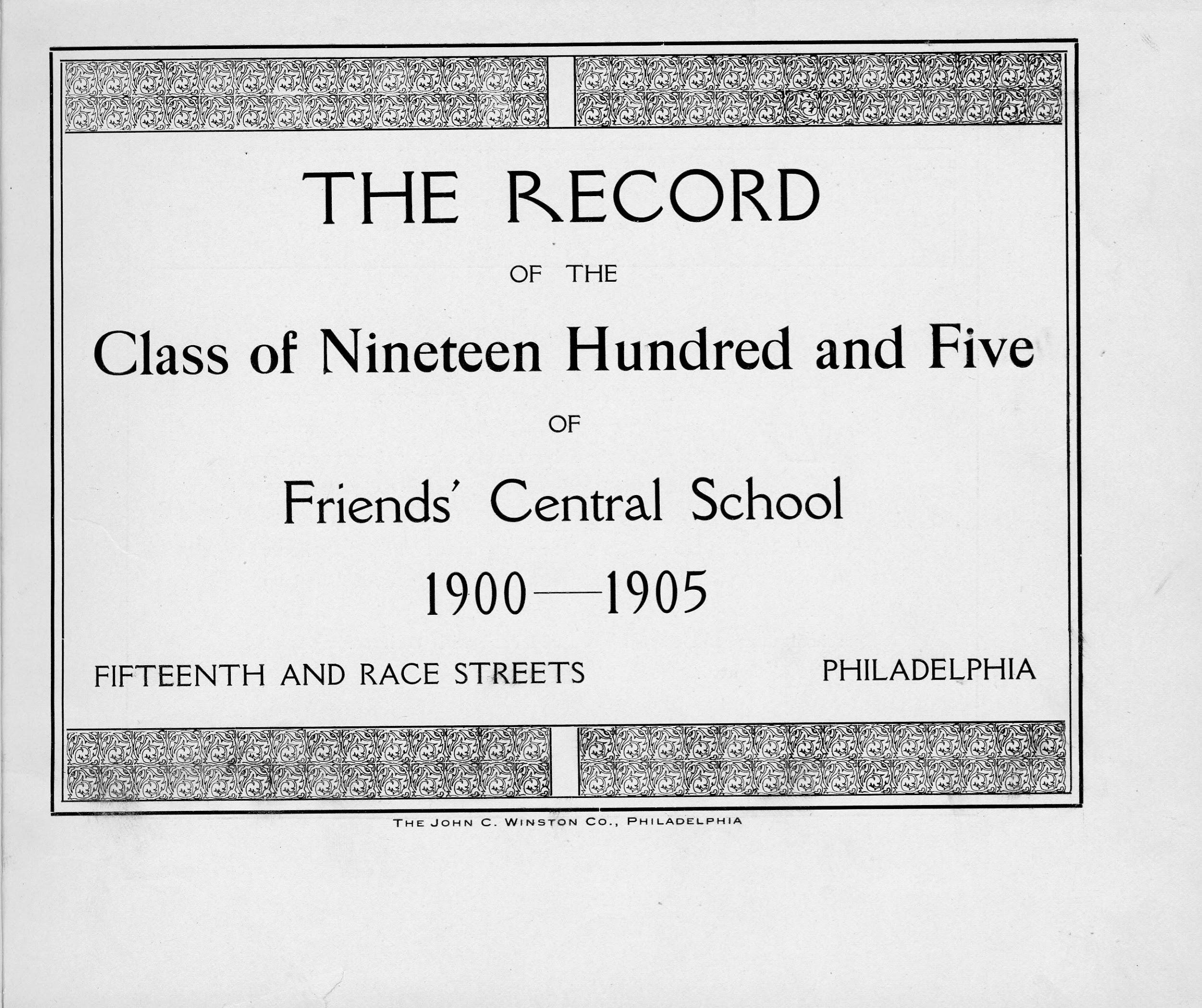
PHILADELPHIA
THE JOHN C. WINSTON CO., PHILADELPHIA
INTRODUCTION

EAR FRIENDS, before you open me to read my contents, laugh perhaps at my jokes, and to feel proud, I am sure, of the achievements of my classmates, let me humbly tell you that I profess to contain no great literary gems nor works of art. But that my purpose in the world is, to bring to the minds of my friends the happy hours spent in school and the many difficulties overcome, and in long years to come, that one, picking me up, may go back to their school days and have a good old chat with their comrades at Friends' Central.

J.

BOYS' FACULTY
Eugene Baker, William E. Barrett,
Garrett W. Thompson,
Percival T. Rex, E. Wilson Cober, Holliday R. Jackson,
Mary H. Whitson, L. Florence Holbrook, Flora L. White, Sarah C.
William A. Case, Arthur L. Yoder, Pennypacker, H. W. Flickinger, Charles W. White.
GIRLS' FACULTY
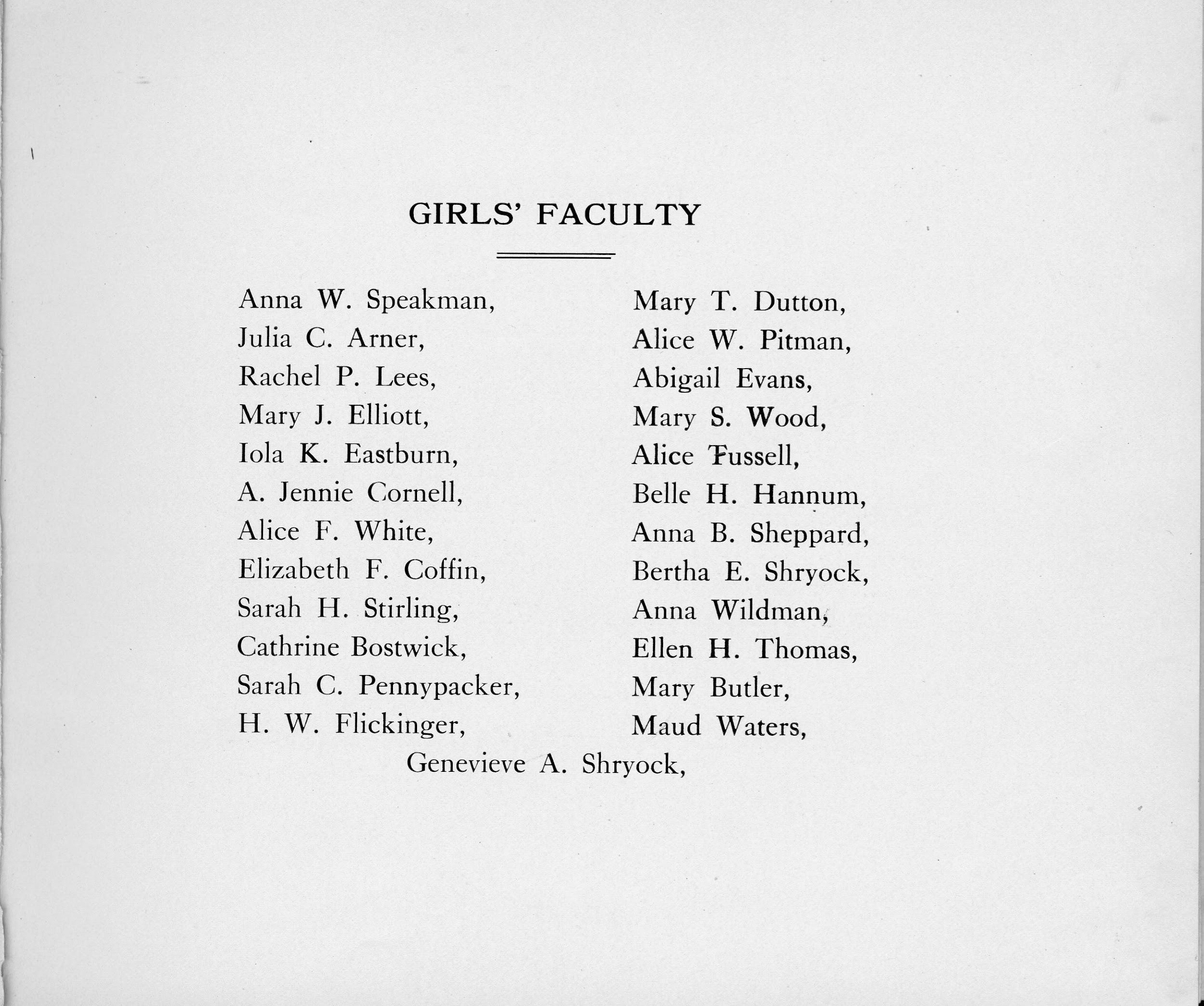
Anna W. Speakman,
Julia C. Arner,
Rachel P. Lees,
Mary J. Elliott, Iola K. Eastburn,
A. Jennie Cornell,
Alice F. White,
Elizabeth F. Coffin, Sarah H. Stirling,
Cathrine Bostwick, Sarah C. Pennypacker, H. W. Flickinger, Genevieve A.
Mary T. Dutton, Alice W. Pitman, Abigail Evans,
Mary S. Wood, Alice Fussell,
Belle H. Hannum, Anna B. Sheppard,
Bertha E. Shryock, Anna Wildman,
Ellen H. Thomas, Mary Butler, Maud Waters, Shryock,
Editorial Staff Editor
George Brackett Seitz,
Marjorie Frances Piers, Assistant Editor
Sara S. Hawkins
Alexander McK. Swain
Grace C. Pennypacker
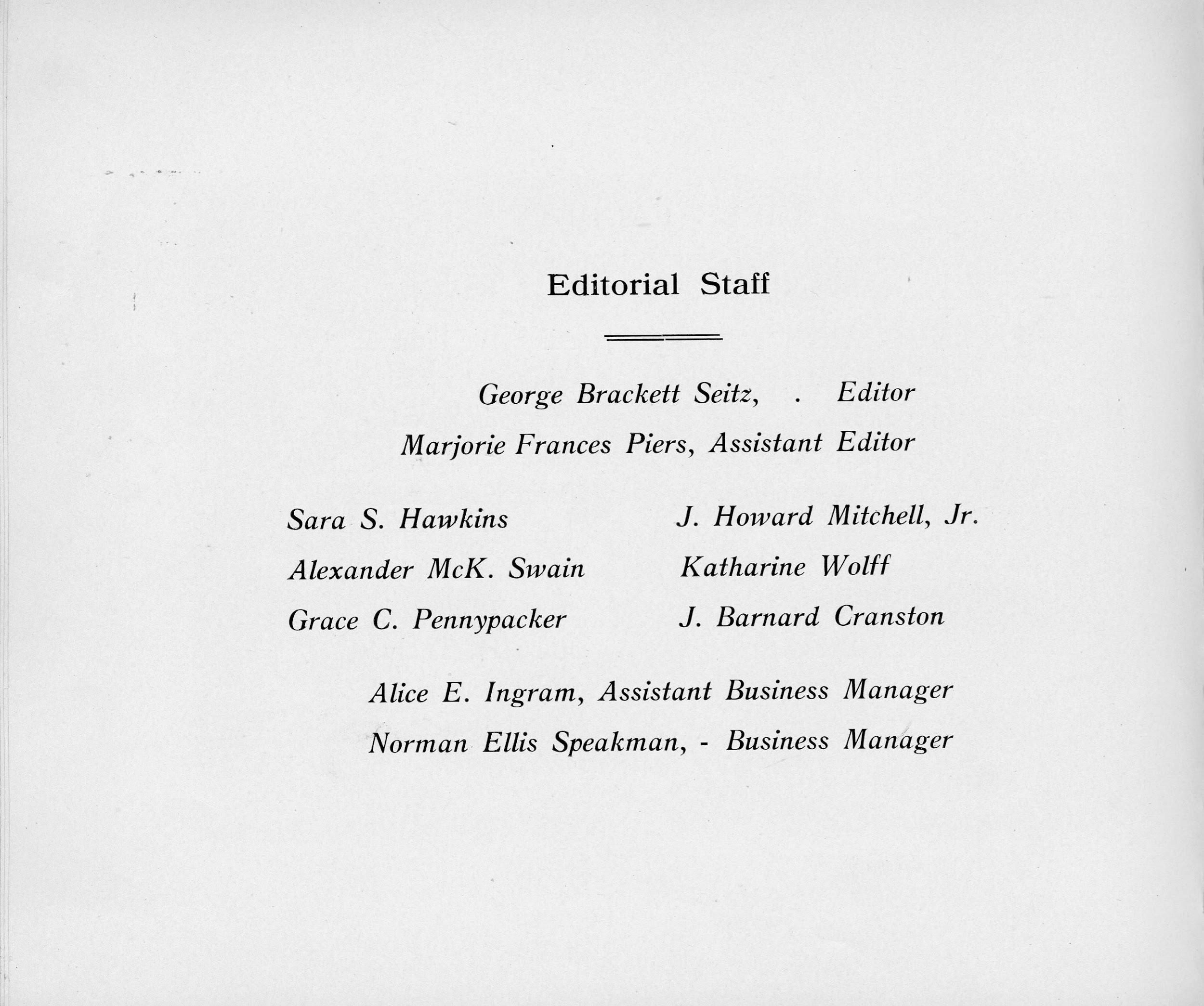
J. Howard Mitchell, Jr.
Katharine Wolff
J. Barnard Cranston
Alice E. Ingram, Assistant Business Manager
Norman Ellis Speakman, - Business Manager
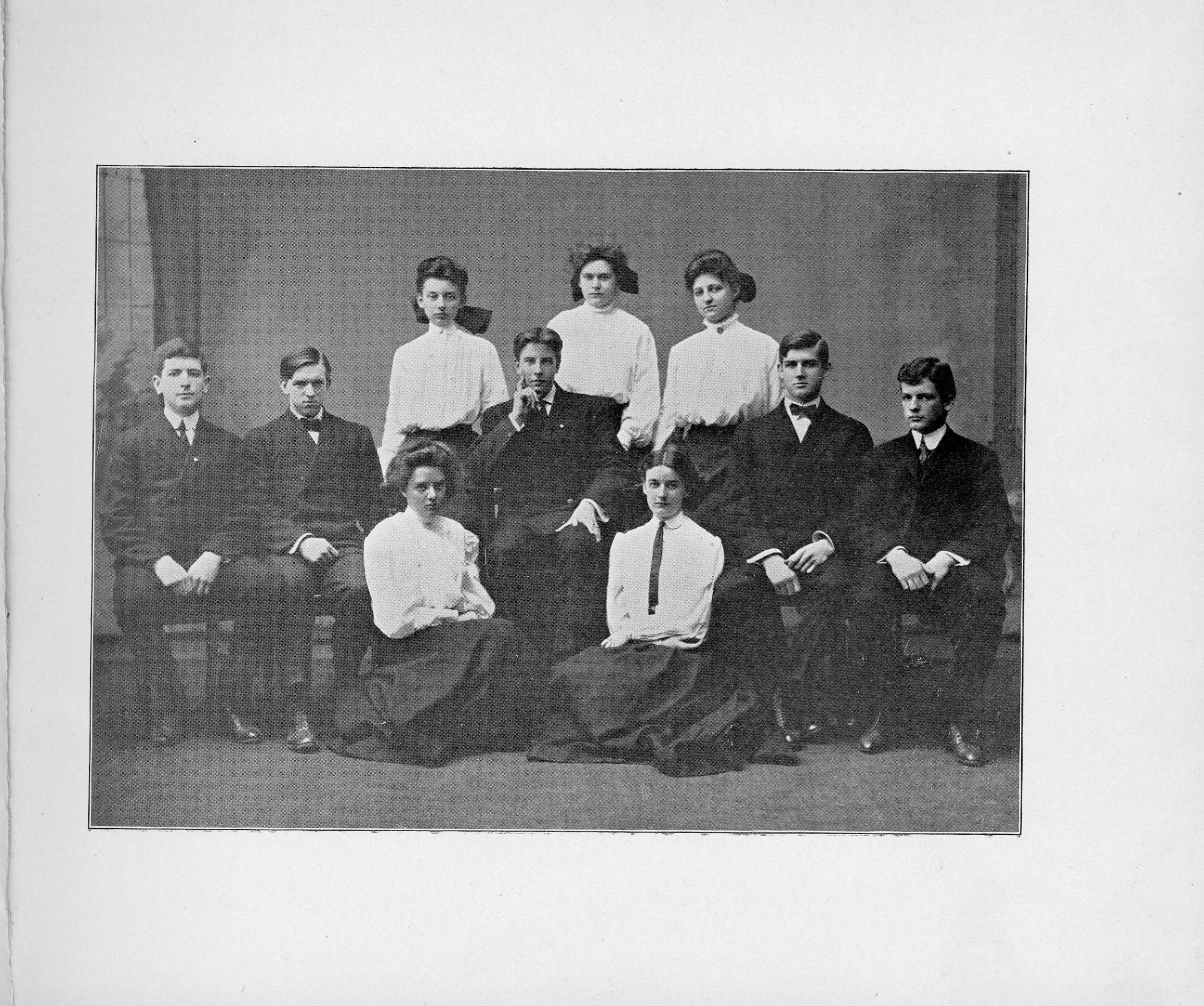

Salutatory
N the name of the Class of Nineteen Hundred and Five, I extend to you all a hearty welcome. We hope that you will enjoy to-day, and remember it for our sakes; and although it cannot mean as much to you as it does to us, it is our earnest wish that you will feel repaid for your interest.
Our Class Day has come at last. The five long years of study and fun are over and our schooldays are at an end. We would not be children forever, but when the time comes to leave dear old Friends' Central, we find it a bit hard, and we linger regretfully over the farewell.
To-day, as we look back over our school course, we realize more fully than ever before just how much it has meant to us. What happy years they have been, what good times we have had, and what loyal friendships we have formed! After to-morrow we must say good-bye to our school days forever; we must leave behind this care-free, little world of ours, and face, instead, the great, wide world without.
Dear classmates: may this new and broader life hold as much of good and happiness as have the dear old days.
But now, let's think of to-day, our Class Day; let us enjoy it to the utmost ; fitting close to the glorious annals of the Class of Nineteen Hundred and Five.
ALICE
let us make it a E. INGRAM.

Personals
CORRINE BLUMENTHAL,
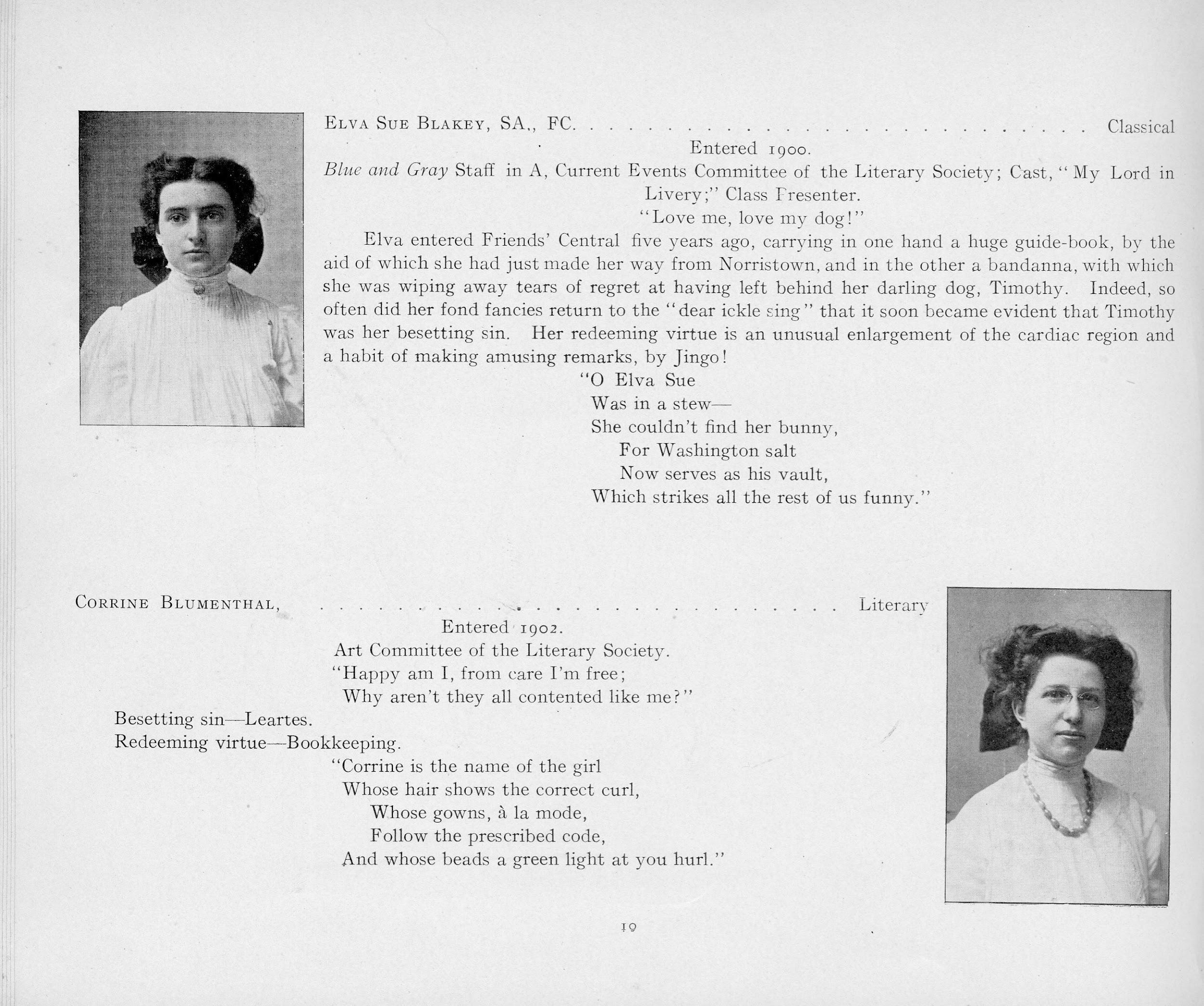
Besetting sin—Leartes.
ELVA SUE BLAKEY, SA., EC.
Entered 1900. Classical
Blue and Gray Staff in A, Current Events Committee of the Literary Society; Cast, " My Lord in Liverv ;" Class Presenter.
Love me, love my dog! "
Elva entered Friends' Central five years ago, carrying in one hand a huge guide-book, by the aid of which she had just made her way from Norristown, and in the other a bandanna, with which she was wiping away tears of regret at having left behind her darling dog, Timothy. Indeed, so often did her fond fancies return to the " dear ickle sing " that it soon became evident that Timothy was her besetting sin. Her redeeming virtue is an unusual enlargement of the cardiac region and a habit of making amusing remarks, by Jingo !
"0 Elva sue
Was in a stew—
She couldn't find her bunny, For Washington salt
Now serves as his vault, Which strikes all the rest of us funny.
Entered 1902.
Art Committee of the Literary Society.
"Happy am I, from care I'm free; Why aren't they all contented like me? "
Redeeming virtue—Bookkeeping.
"Corrine is the name of the girl
Whose hair shows the correct curl, Whose gowns, la mode, Follow the prescribed code, And whose beads a green light at you hurl."
Literarv
EDITH SELLERS BUNTING,
WVNIFRED BOERICKE,
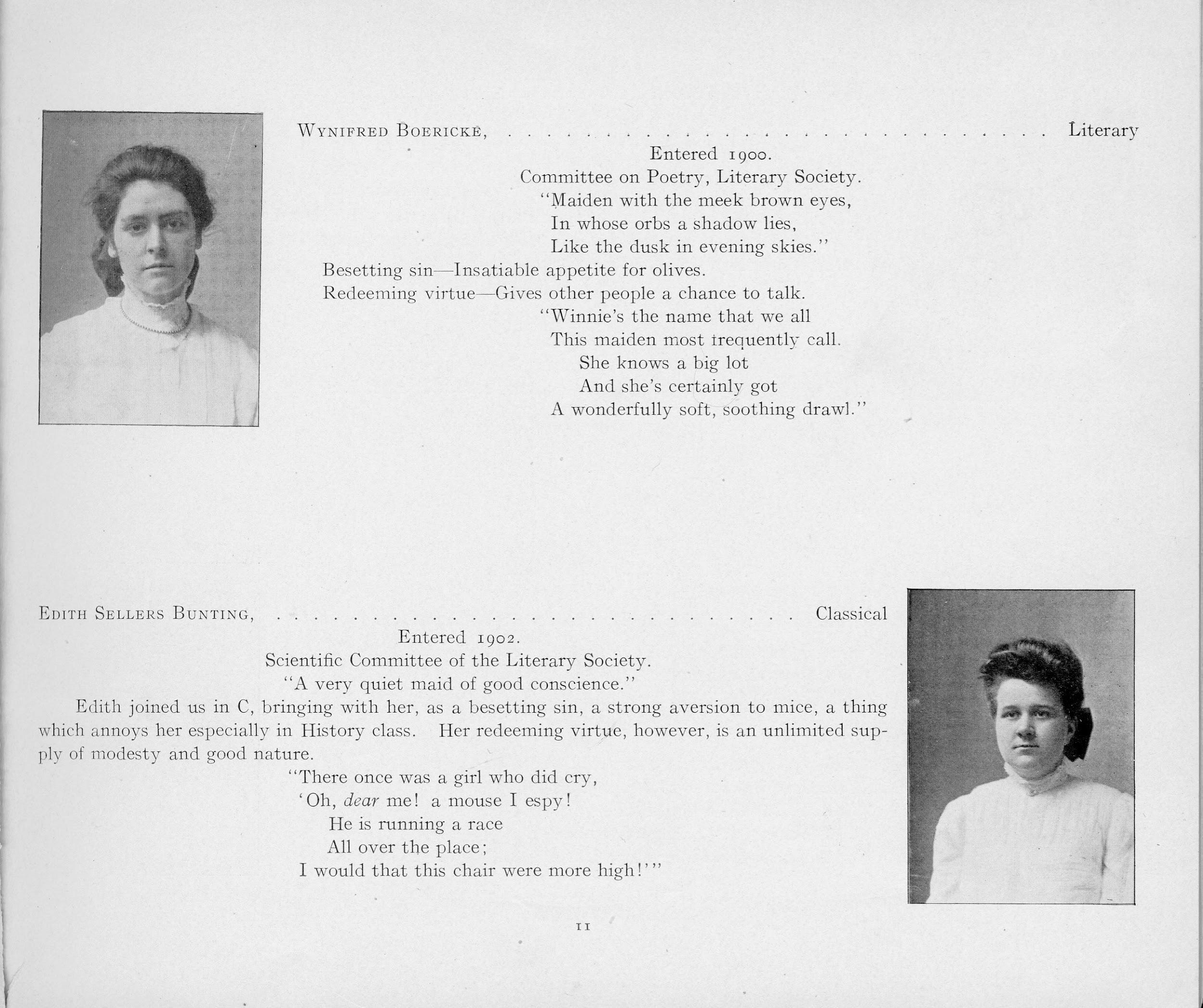
Entered 1900.
Committee on Poetry, Literary Society.
"Maiden with the meek brown eyes,
In whose orbs a shadow lies, Like the dusk in evening skies. "
Besetting sin—lnsatiable appetite for olives.
Redeeming virtue—Gives other people a chance to talk.
"Winnie's the name that we all
This maiden most irequently call.
She knows a big lot
And she's certainly got A wonderfully soft, soothing drawl. "
Classical
Entered 1902.
Scientific Committee of the Literary Society.
'A very quiet maid of good conscience."
Edith joined us in C, bringing with her, as a besetting sin, a strong aversion to mice, a thing which annoys her especially in History class. Her redeeming virtue, however, is an unlimited supply of modesty and good nature.
'There once was a girl who did cry, 'Oh, dear me! a mouse I espy!
He is running a race
All over the place ; I would that this chair were more high! ' "
Literary
CHARLOTTE Z. DUNGAN, SA.
HILDA
DOOLITTLE, FC.

Entered 1902.
Class• Day Committee, Scientific Committee of the Literary Society.
"A face with gladness overspread, Soft smiles by human kindness bred."
Hilda's besetting sin is her desire in French class to occupy the entire back bench. Her ability in playing basketball, and especially in overawing her opponents, is one of her redeeming virtues, while her charming affability is another.
"In the yard at recess every day Tall Hilda at 'pass-ball ' did play, While the Ds all did stand
And say, 'Isn't she grand! Let's buy her some cake right away.' "
Literary
Entered 1900.
Committee on Arts, Literary Society, Sociable Committee, Paper Committee.
'Her air, her manners, all who saw admired; Courteous, though coy, and gentle, though retired."
Besetting sin—Lives in Bustleton. (For further information, apply to the North American.)
Redeeming virtue—Whist1ing.
'There was a young girl who could whistle, Her notes were as clear as is crystal.
Bob White she would call The notes ring through the hall And he'd come were he way off in Bristol."
EDWINA C. ESHLEMAN, SA.
DAISY F. ELLIOT, SA.
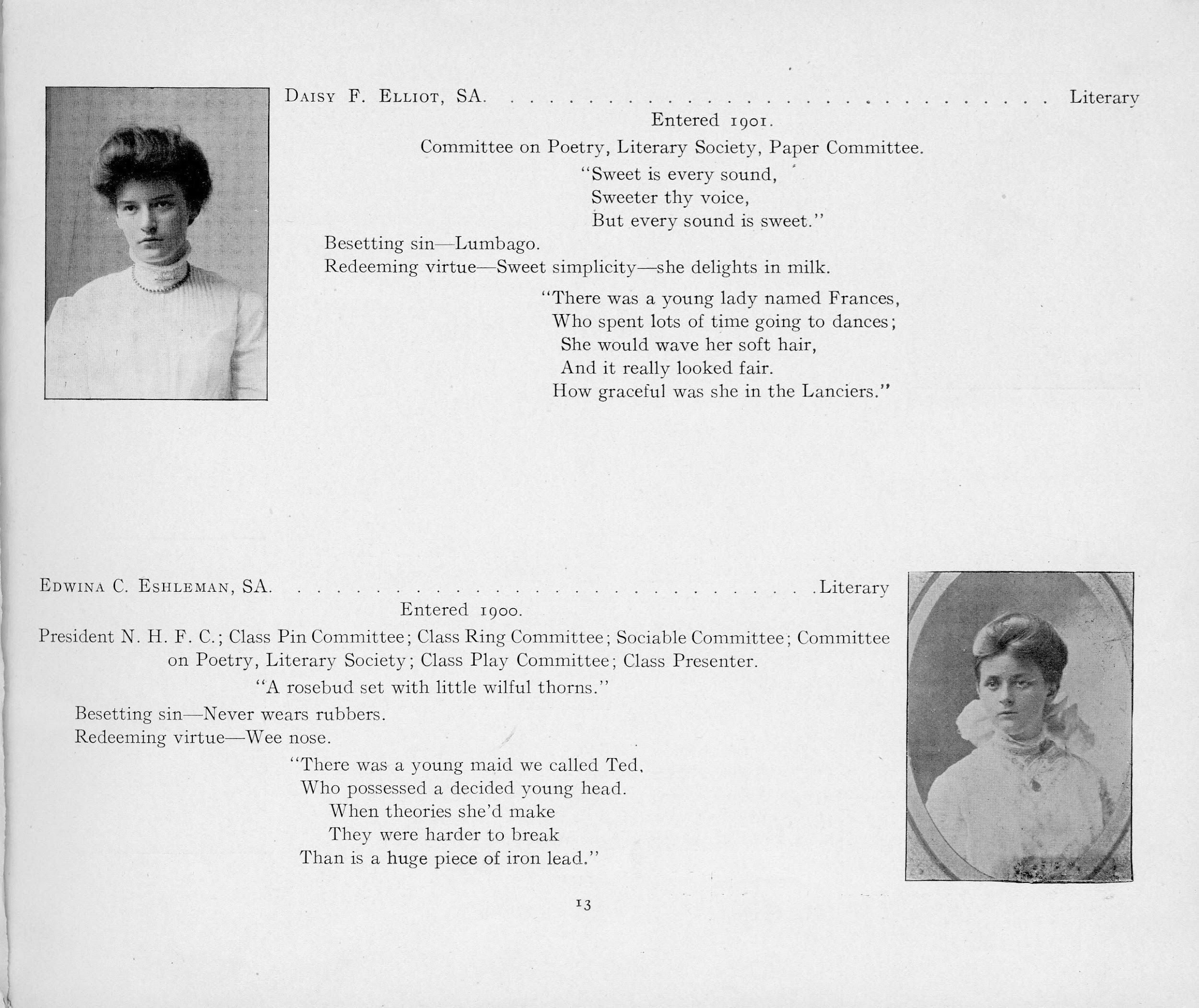
Entered 1901.
Committee on Poetry, Literary Society, Paper Committee.
'Sweet is every sound, Sweeter thy voice, But every sound is sweet. "
Besetting sin—Lumbago.
Redeeming virtue—Sweet simplicity—she delights in milk.
"There was a young lady named Frances, Who spent lots of time going to dances ; She would wave her soft hair, And it really looked fair. How graceful was she in the Lanciers."
Literary Entered 1900.
President N. H. F. C. ; Class Pin Committee; Class Ring Committee; Sociable Committee; Committee on Poetry, Literary Society; Class Play Committee ; Class Presenter. "A rosebud set with little wilful thorns. '
Besetting sin—Never wears rubbers.
Redeeming virtue—Wee nose.
"There was a young maid we called Ted. Who possessed a decided young head. When theories she'd make They were harder to break Than is a huge piece of iron lead."
Classical
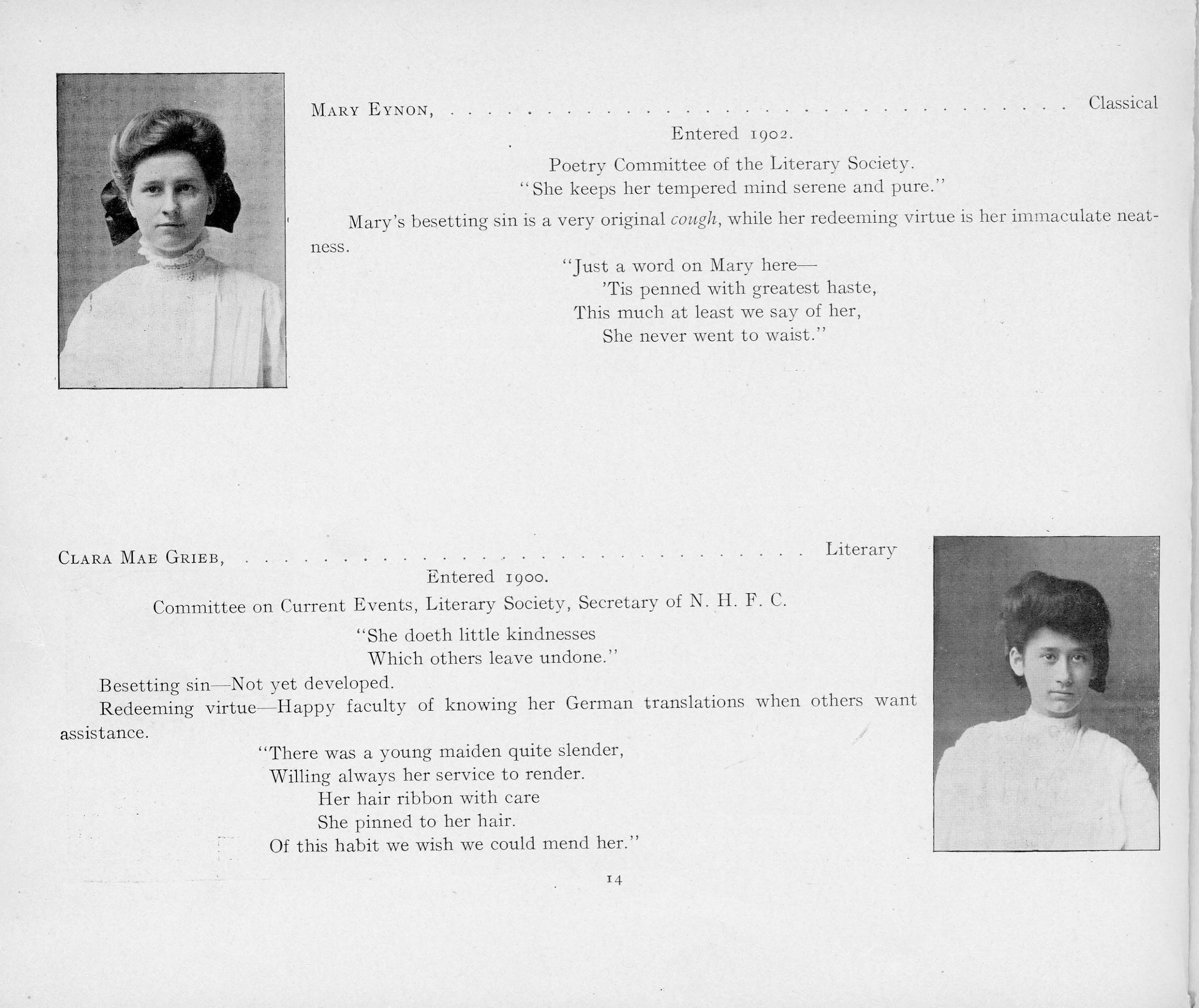
CLARA MAE GRIEB,
MARY EYNON,
Entered 1902.
Poetry Committee of the Literary Society. She keeps her tempered mind serene and pure."
Mary's besetting sin is a very original cough, while her redeeming virtue is her immaculate neatness.
' 'Just a word on Mary here—
'Tis penned with greatest haste, This much at least we say of her, She never went to waist."
Literary
Entered 1900.
Committee on Current Events, Literary Society, Secretary of N. H. F. C.
'She doeth little kindnesses Which others leave undone.
Besetting sin—Not yet developed.
Redeeming virtue Happy faculty of knowing her German translations when assistance.
"There was a young maiden quite slender, Willing always her service to render.
Her hair ribbon with care She pinned to her hair.
Of this habit we wish we could mend her."
others want
MARY K. HAKiüs, SA.
FLORENCE
HANCOCK,
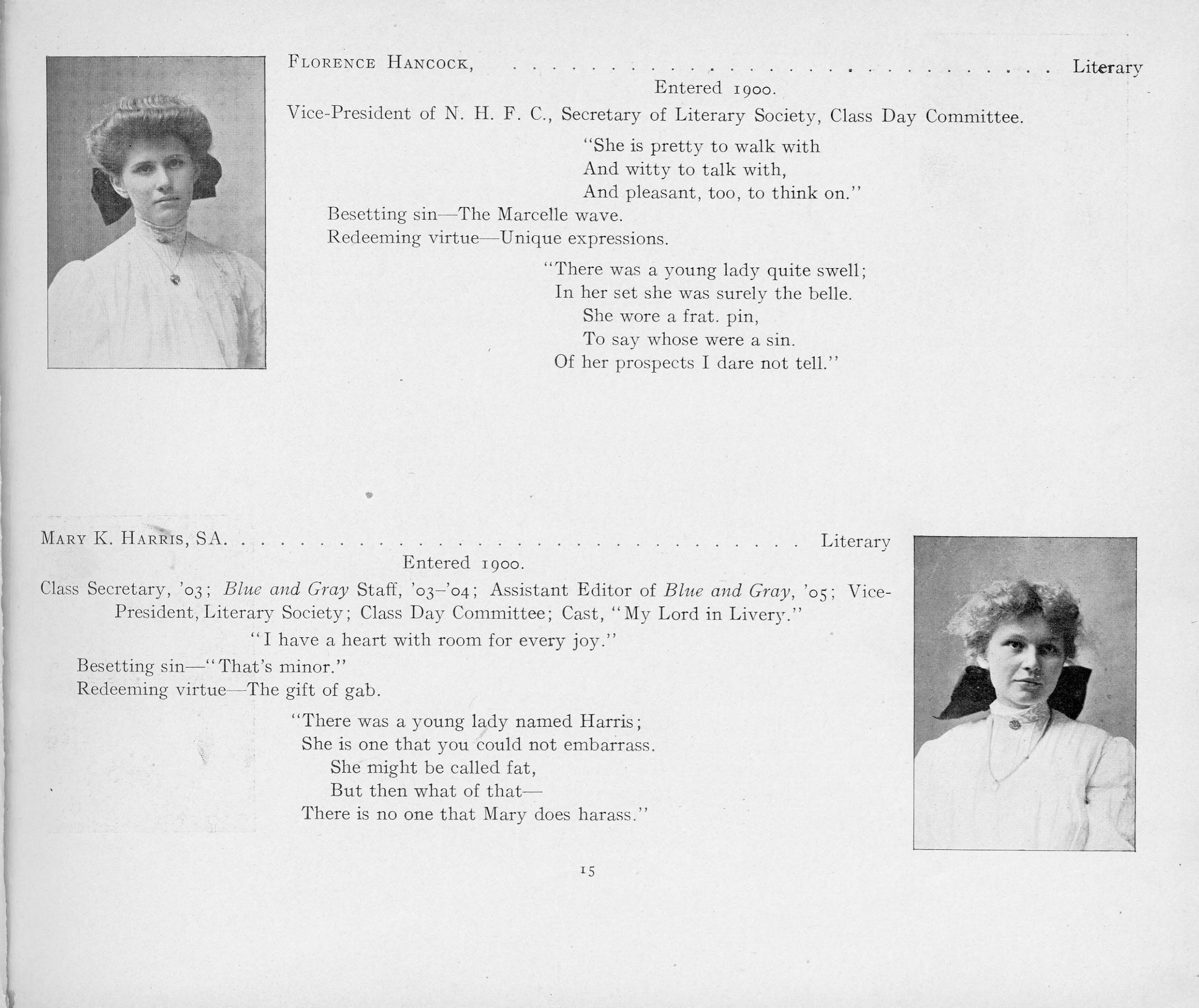
Entered 1900.
Vice-President of N. H. F. C. Secretary of Literary Society, Class Day Committee.
"She is pretty to walk with And witty to talk with, And pleasant, too, to think on."
Besetting sin—The Marcelle wave.
Redeeming virtue—Unique expressions.
"There was a young lady quite swell; In her set she was surely the belle. She wore a frat. pin, To say whose were a sin.
Of her prospects I dare not tell."
Entered 1900.
Class Secretary, '03 ; Blue and Gray Staff, '03—'04; Assistant Editor of Blue and Gray, President, Literary Society; Class Day Committee; Cast, " My Lord in Livery.'
I have a heart with room for every joy."
Besetting sin " That's minor. "
Redeeming virtue—The gift of gab.
"There was a young lady named Harris ; She is one that you could not embarrass. She might be called fat, But then what of that
There is no one that Mary does harass.
Literarv
'05 ; Vice-
SARA S. HAWKINS, FC., SA.
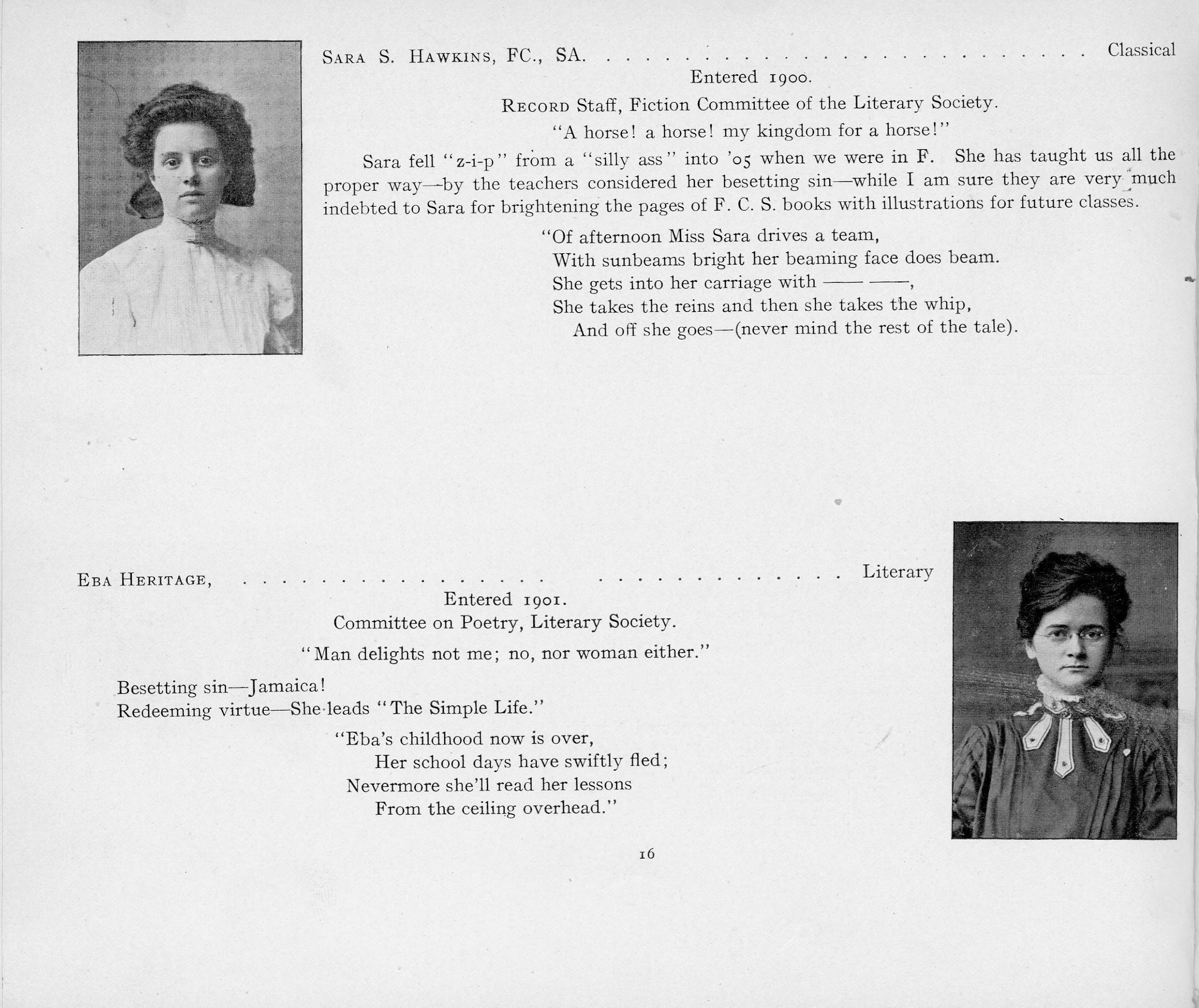
Entered 1900.
RECORD Staff, Fiction Committee of the Literary Society.
"A horse! a horse! my kingdom for a horse!"
Sara fell " z-i-p " from a "silly ass " into '05 when we were in F. She has taught us all the proper way—by the teachers considered her besetting sin—while I am sure they are very much indebted to Sara for brightening the pages of F. C. S. books with illustrations for future classes.
"Of afternoon Miss Sara drives a team, With sunbeams bright her beaming face does beam.
She gets into her carriage with She takes the reins and then she takes the whip, And off she goes—(never mind the rest of the tale).
EBA HERITAGE,
Entered 1901.
Committee on Poetry, Literary Society.
' Man delights not me; no, nor woman either."
Besetting sin—Jamaica ! Redeeming virtue—She•1eads " The Simple Life."
"Eba's childhood now is over, Her school days have swiftly fled; Nevermore she'll read her lessons
From the ceiling overhead."
Literary
E. INGRAM, FC., SA.
EMILY E. HAWSON,
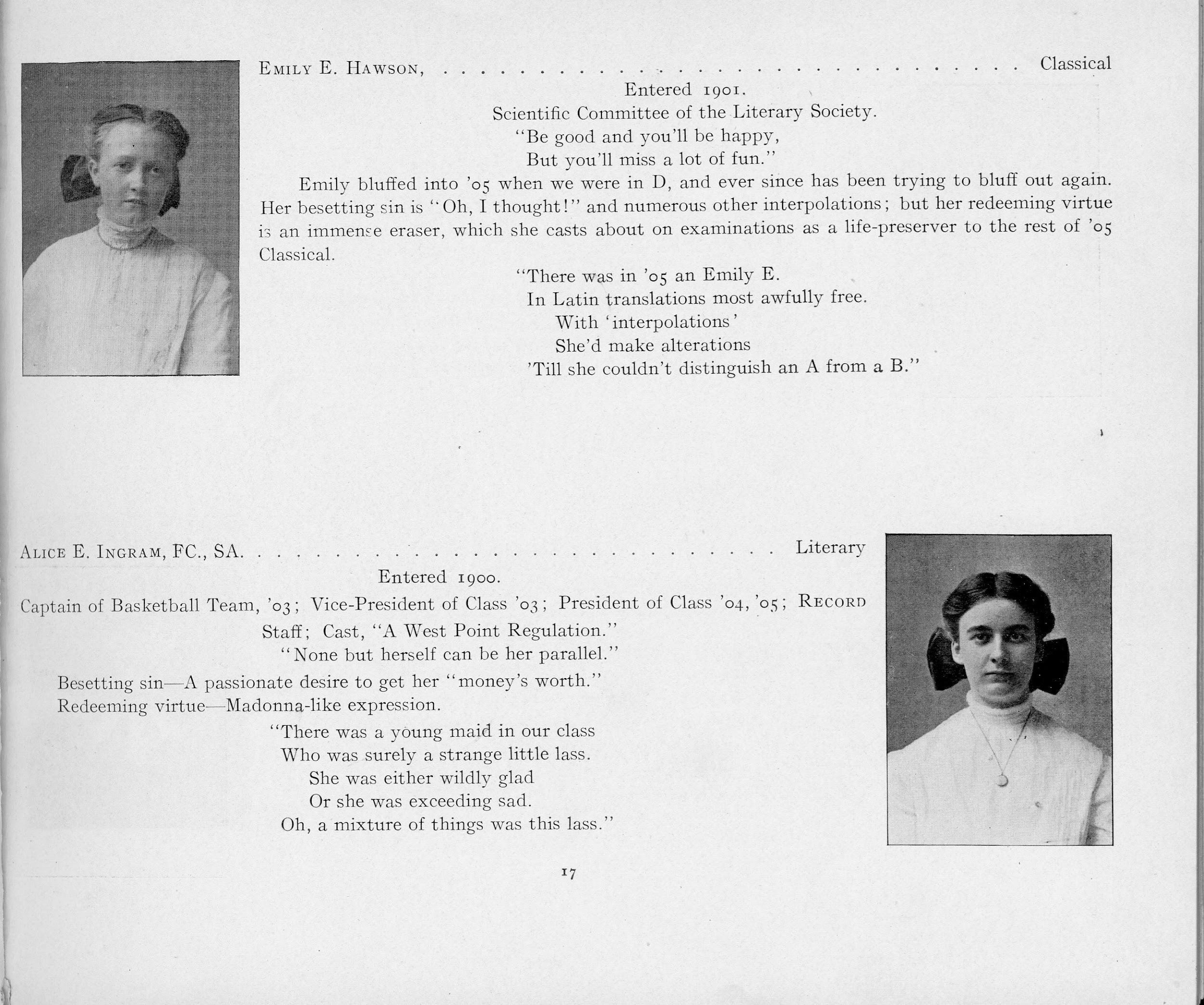
Entered 1901. Scientific Committee of the Literary Society. 'Be good and you'll be happy, But you'll miss a lot of fun." Classical
Emily bluffed into '05 when we were in D, and ever since has been trying to bluff out again. Her besetting sin is " Oh, I thought ! " and numerous other interpolations; but her redeeming virtue i; an immense eraser, which she casts about on examinations as a life-preserver to the rest of '05 Classical.
'There was in '05 an Emily E. In Latin translations most awfully free. With ' interpolations ' She'd make alterations 'Till she couldn't distinguish an A from a B."
Entered 1900.
Captain of Basketball Team, '03 ; Vice-President of Class '03 ; President of Class Staff; Cast, "A West Point Regulation."
' None but herself can be her parallel."
Besetting sin—A passionate desire to get her " money's worth."
Redeeming virtue Madonna-like expression.
"There was a young maid in our class Who was surely a strange little lass. She was either wildly glad Or she was exceeding sad. Oh, a mixture of things was this lass."
04, '05 ; Literary RECORD
ALICE
JEANNETTE
KEIM, FC., SA.
SUE DOROTHY KEENEY, SA.
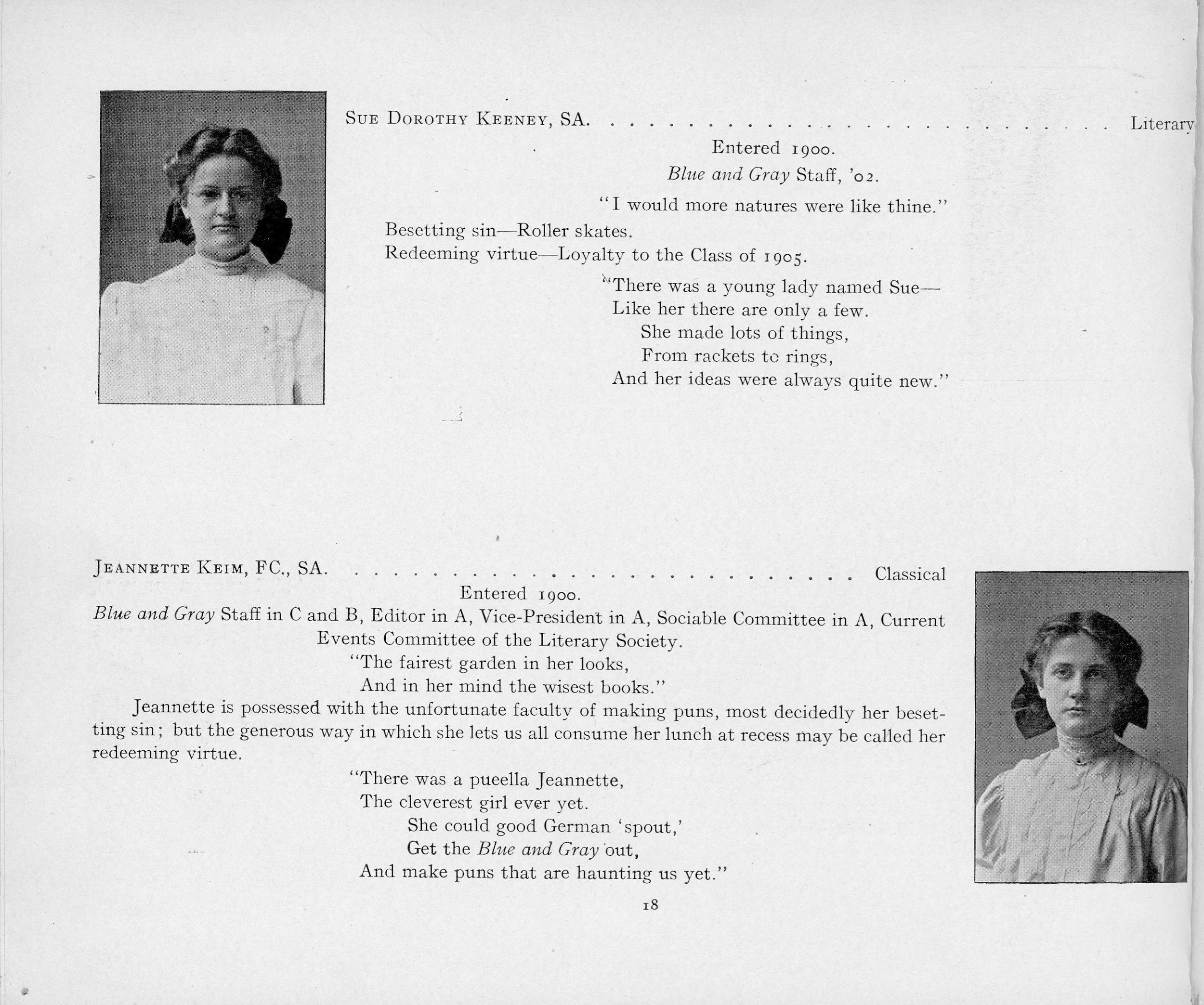
Entered 1900.
Blue and Gray Staff, '02.
I would more natures were like thine.
Besetting sin—Roller skates.
Redeeming virtue—Loyalty to the Class of r 905.
There was a young lady named Sue— Like her there are only a few. She made lots of things, From rackets to rings, And her ideas were always quite new."
Classical
Entered 1900.
Blue and Gray Staff in C and B, Editor in A, Vice-President in A, Sociable Committee in A, Current Events Committee of the Literary Society.
"The fairest garden in her looks, And in her mind the wisest books."
Jeannette is possessed with the unfortunate faculty of making puns, most decidedly her besetting sin; but the generous way in which she lets us all consume her lunch at recess may be called her redeeming virtue.
"There was a pueella Jeannette, The cleverest girl ever yet. She could good German 'spout,' Get the Blue and Gray •out, And make puns that are haunting us yet."
CORA MIRKIL,
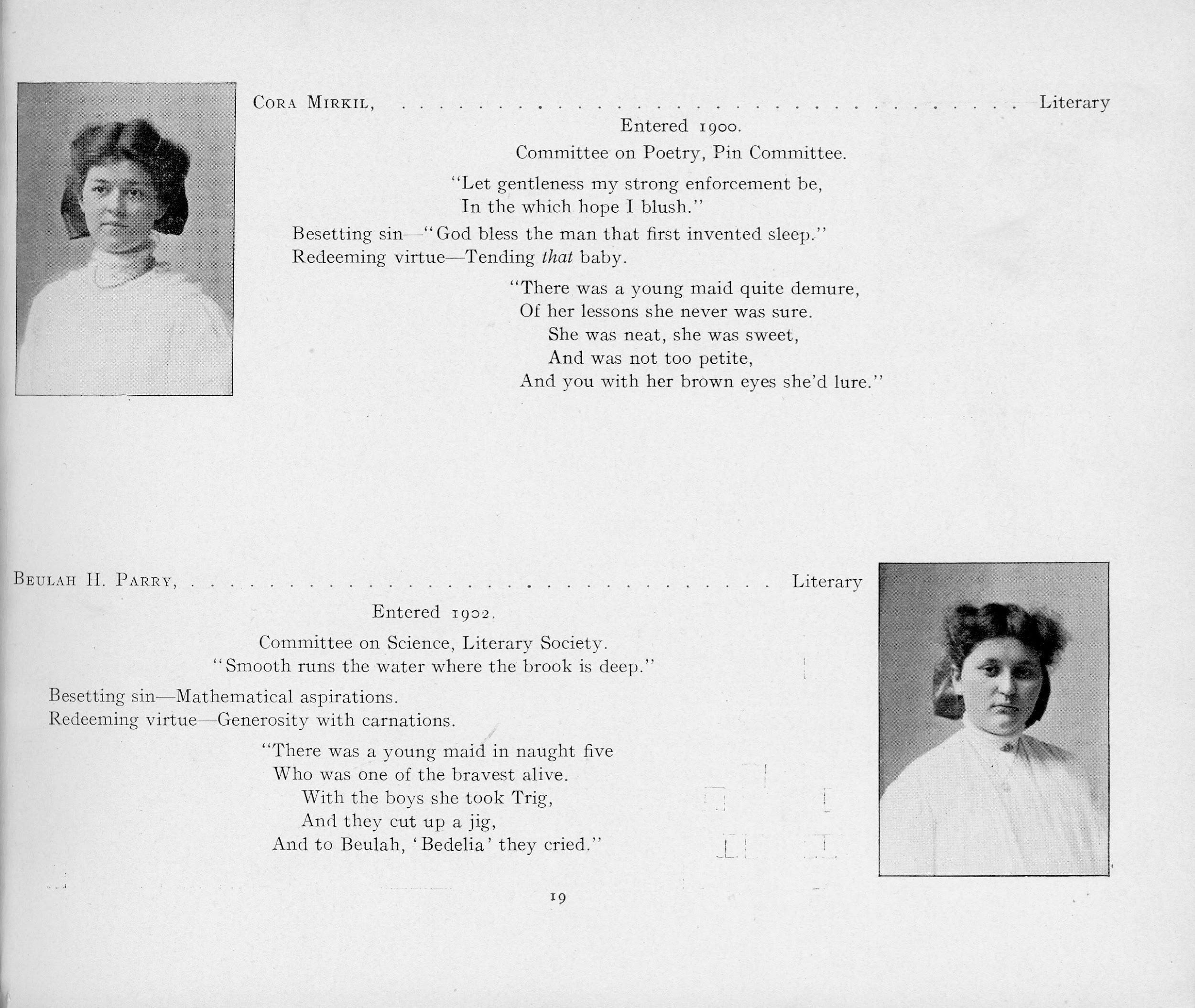
Entered 1900.
Committee on Poetry, Pin Committee.
"Let gentleness my strong enforcement be, In the which hope I blush. "
Besetting sin " God bless the man that first invented sleep." Redeeming virtue—Tending that baby.
"There was a young maid quite demure, Of her lessons she never was sure. She was neat, she was sweet, And was not too petite, And you with her brown eyes she'd lure."
Literary
Entered 1902.
Committee on Science, Literary Society. Smooth runs the water where the brook is deep."
Besetting sin Mathematical aspirations. Redeeming virtue—Generosity with carnations.
"There was a young maid in naught five Who was one of the bravest alive. With the boys she took Trig, And they cut up a jig, And to Beulah, ' Bedelia' they cried.'
Literary
BEULAH H. PARRY,
MARJORIE F. PIERS, SA.
GRACE C. PENNYPACRER,
Entered 1903.
RECORD Staff, Fiction Committee of the Literary Society.
Cheerfulness is an offshoot of goodness and wisdom."
Grace's besetting sin, if. she has any, is her ability to try the patience of the monitors by her ceaseless chattering in class, while her redeeming virtue is her sweet temper.
"There was once an original Grace, Who knew how to fill 'RECORD space.'
When the book came from press
Most of us must confess We'd have liked to have punched in her face."
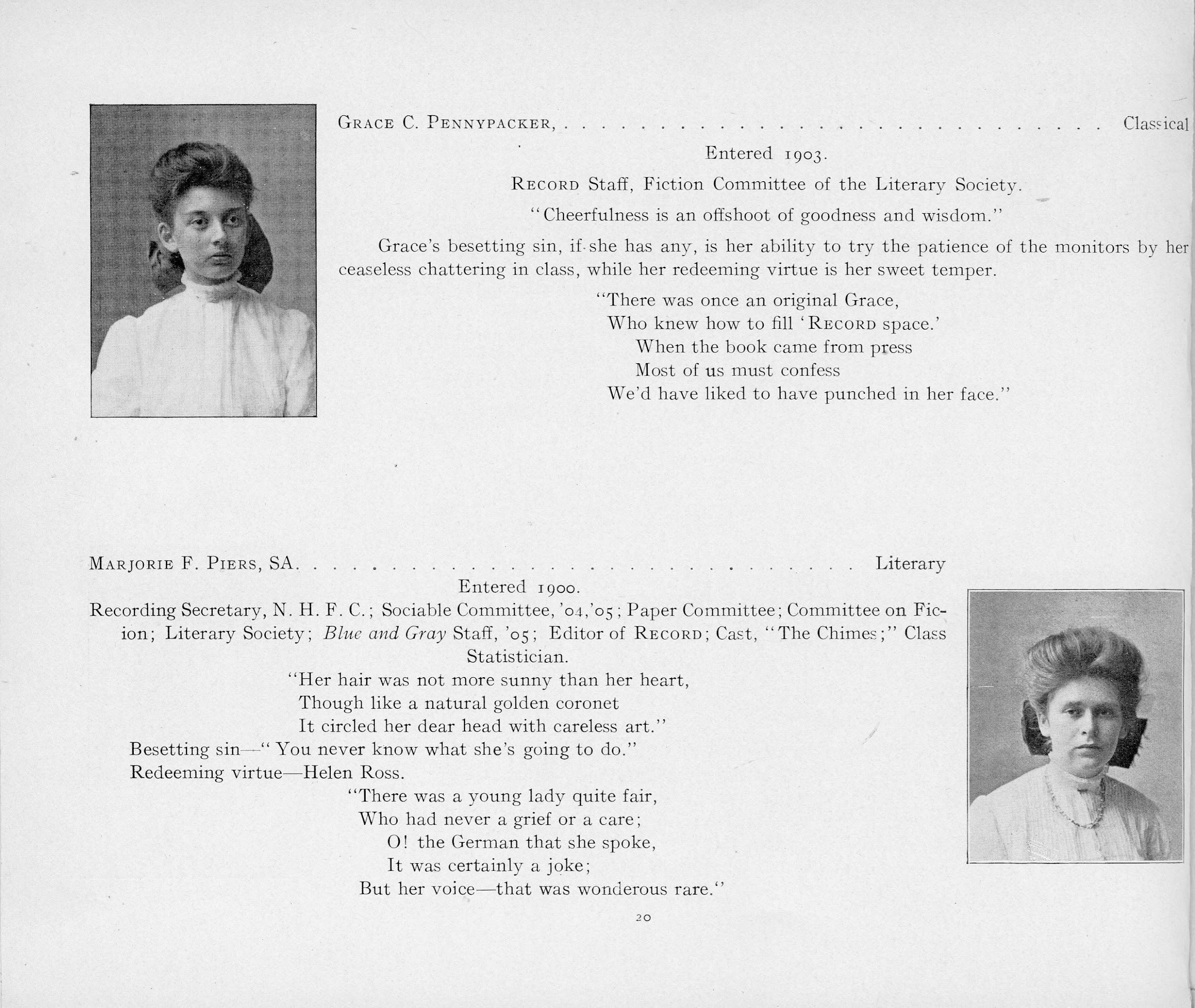
Literary
Entered 1900.
Recording Secretary, N. H. F. C. ; Sociable Committee, '04, '05 ; Paper Committee; Committee on Ficion; Literary Society; Bluc and Gray Staff, '05 ; Editor of RECORD; Cast, " The Chimes ; " Class Statistician.
'Her hair was not more sunny than her heart, Though like a natural golden coronet
It circled her dear head with careless art." Besetting sin—" You never know what she's going to do." Redeeming virtue—Helen Ross.
"There was a young lady quite fair, Who had never a grief or a care ; O! the German that she spoke, It was certainly a joke; But her voice—that was wonderous rare.'
HELEN S. Ross, SA.
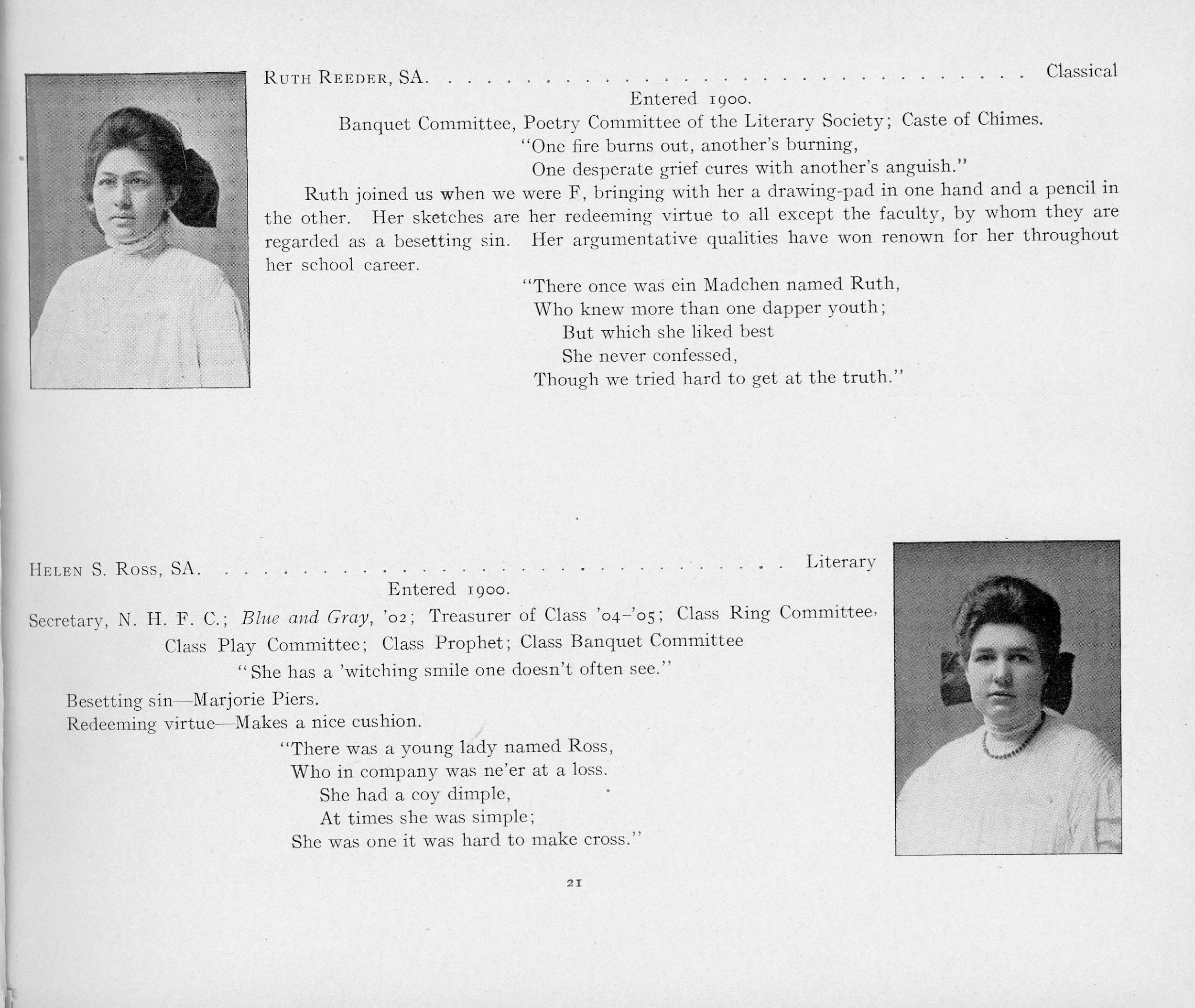
RUTH REEDER, SA.
Entered 1900.
Banquet Committee, Poetry Committee of the Literary Society; Caste of Chimes. "One fire burns out, another's burning, One desperate grief cures with another's anguish."
Ruth joined us when we were F, bringing with her a drawing-pad in one hand and a pencil in the other. Her sketches are her redeeming virtue to all except the faculty, by whom they are regarded as a besetting sin. Her argumentative qualities have won renown for her throughout her school career.
"There once was ein Madchen named Ruth, Who knew more than one dapper youth ; But which she liked best She never confessed, Though we tried hard to get at the truth."
Literary
Entered 1900.
Secretary, N. H. F. C. ; Blue and Gray, '02 ; Treasurer of Class '04—'05', Class Ring Committee, Class Play Committee; Class Prophet; Class Banquet Committee She has a 'witching smile one doesn't often see.'
Besetting sin—Marjorie Piers. Redeeming virtue—Makes a nice cushion.
"There was a young lady named Ross, Who in company was ne'er at a loss. She had a coy dimple, At times she was simple; She was one it was hard to make cross."
MARGUERITE STAUFFER,
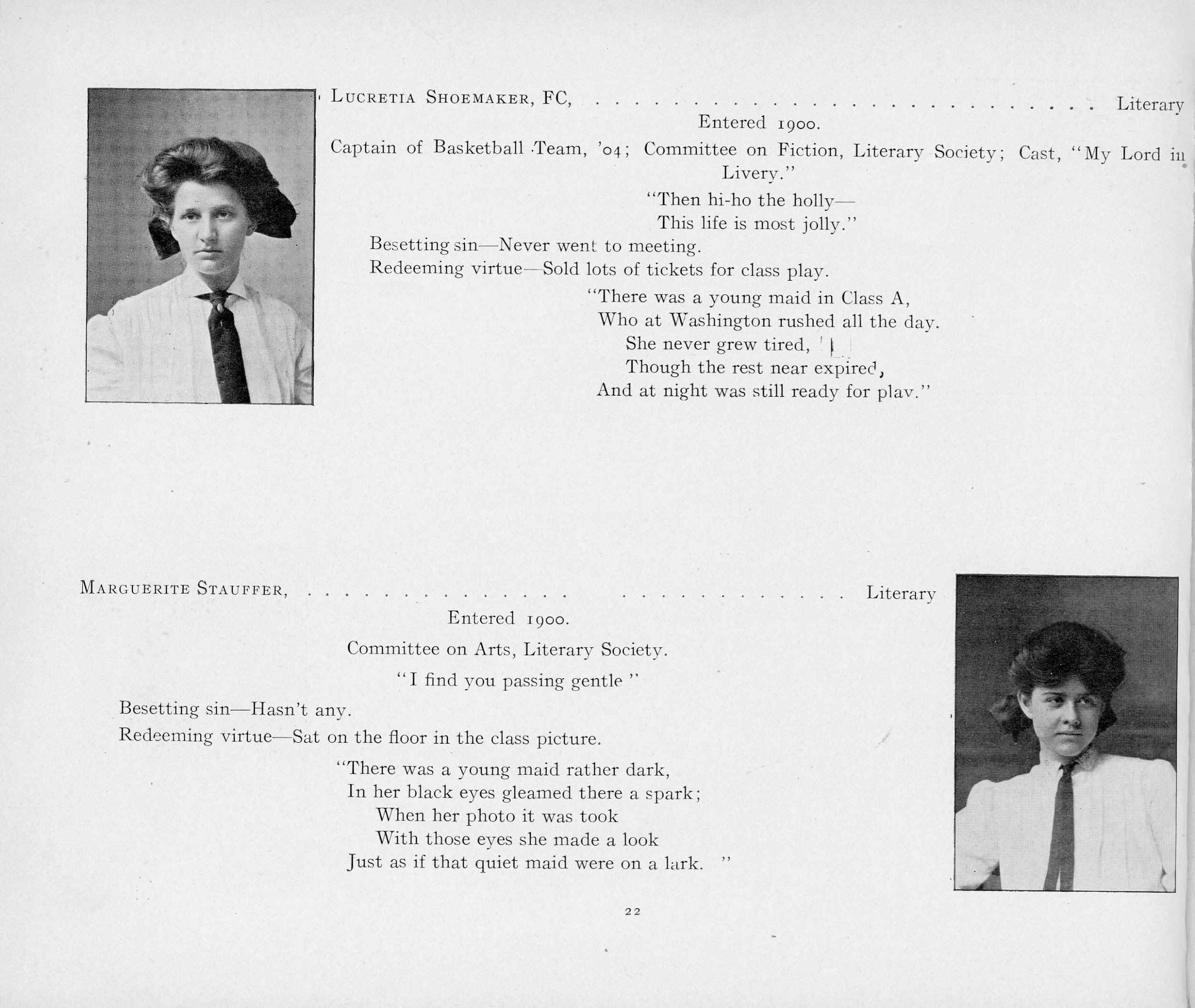
LUCRETIA SHOEMAKER, FC,
Entered 1900.
Captain of Basketball .Team, '04 ; Committee on Fiction, Literary Society ; Liverv."
"Then hi-ho the holly This life is most jolly."
Besetting sin Never went to meeting.
Redeeming virtue—Sold lots of tickets for class play.
"There was a young maid in Class A, Who at Washington rushed all the day.
She never grew tired, Though the rest near expired, And at night was still ready for plav. "
Entered 1900.
Committee on Arts, Literary Society.
I find you passing gentle
Besetting sin—Hasn't any.
Redeeming virtue—Sat on the floor in the class picture.
"There was a young maid rather dark, In her black eyes gleamed there a spark ; When her photo it was took With those eyes she made a look
Just as if that quiet maid were on a lark.
Literary
Cast
Literary 'My Lord ill
KATHARINE TENBROOK, EC,
HELENA M. TAYLOR,

Entered 1900.
Committee on Science, Literary Society. Exceedingly well read."
Besetting sin—An inordinate love for guide-books. Redeeming virtue—Good nature.
"'There was a young lady named Tavlor, As straight and as tall as a sailor. She missed lots of lessons By cutting out sessions, But her brains seemed never to fail her."
Literary
Entered 1900.
Committee on Current Events, Literary Society.
He that questioneth much will learn much."
Besetting sin—Painfu1 jokes.
Redeeming virtue—Basketball guard.
"There was a young lady most clever, To say funny things she'd endeavor. Her complexion was quite pink, Her left eye she'd often wink; In good spirits we found her ever.'
Literary
HELEN W. WILLIAMS, SA.
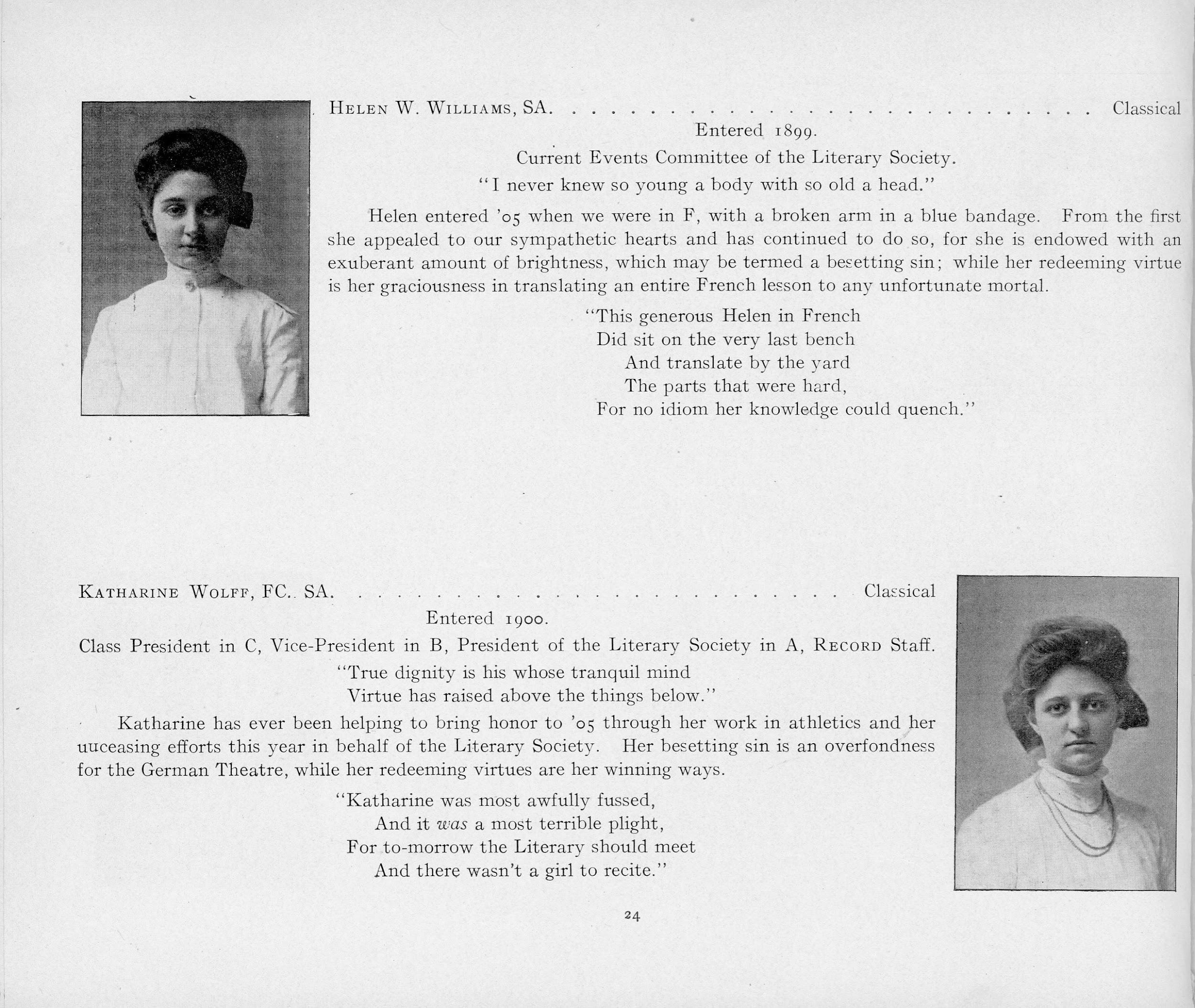
Classical
Entered 1899.
Current Events Committee of the Literary Society.
'I never knew so young a body with so old a head."
Helen entered '05 when we were in F, with a broken arm in a blue bandage. From the first she appealed to our sympathetic hearts and has continued to do so, for she is endowed with an exuberant amount of brightness, which may be termed a besetting sin; while her redeeming virtue is her graciousness in translating an entire French lesson to any unfortunate mortal.
'This generous Helen in French Did sit on the very last bench
And translate by the yard The parts that were hard, For no idiom her knowledge could quench. "
Classical
Entered 1900.
Class President in C, Vice-President in B, President of the Literary Society in A, RECORD Staff.
'True dignity is his whose tranquil mind Virtue has raised above the things below."
Katharine has ever been helping to bring honor to '05 through her work in athletics and her uuceasing efforts this year in behalf of the Literary Society. Her besetting sin is an overfondness for the German Theatre, while her redeeming virtues are her winning ways.
"Katharine was most awfully fussed, And it was a most terrible plight, For to-morrow the Literary should meet And there wasn't a girl to recite."
KATHARINE WOLFF, EC. SA.
WILLIAM BRADLEY, Gray
In the year of 1902 our little Billy dropped into our glorious aggregation from the Wilderness (New Jersey). His chief characteristic is his insane desire for learning.
His besetting sin is a bad habit of making stump speeches. His redeeming virtue is, he doesn't take up much room.
"There once was a fellow named Bill, Who lived on the side of a hill
In Camden, N. Jo
And to school every day He must come, on a boat, o'er the rill."
In A Sociable Committee, Ring Committee, School Debating Team, Class Historian, member of Jui Jitsu Club, member of Stagers Club.
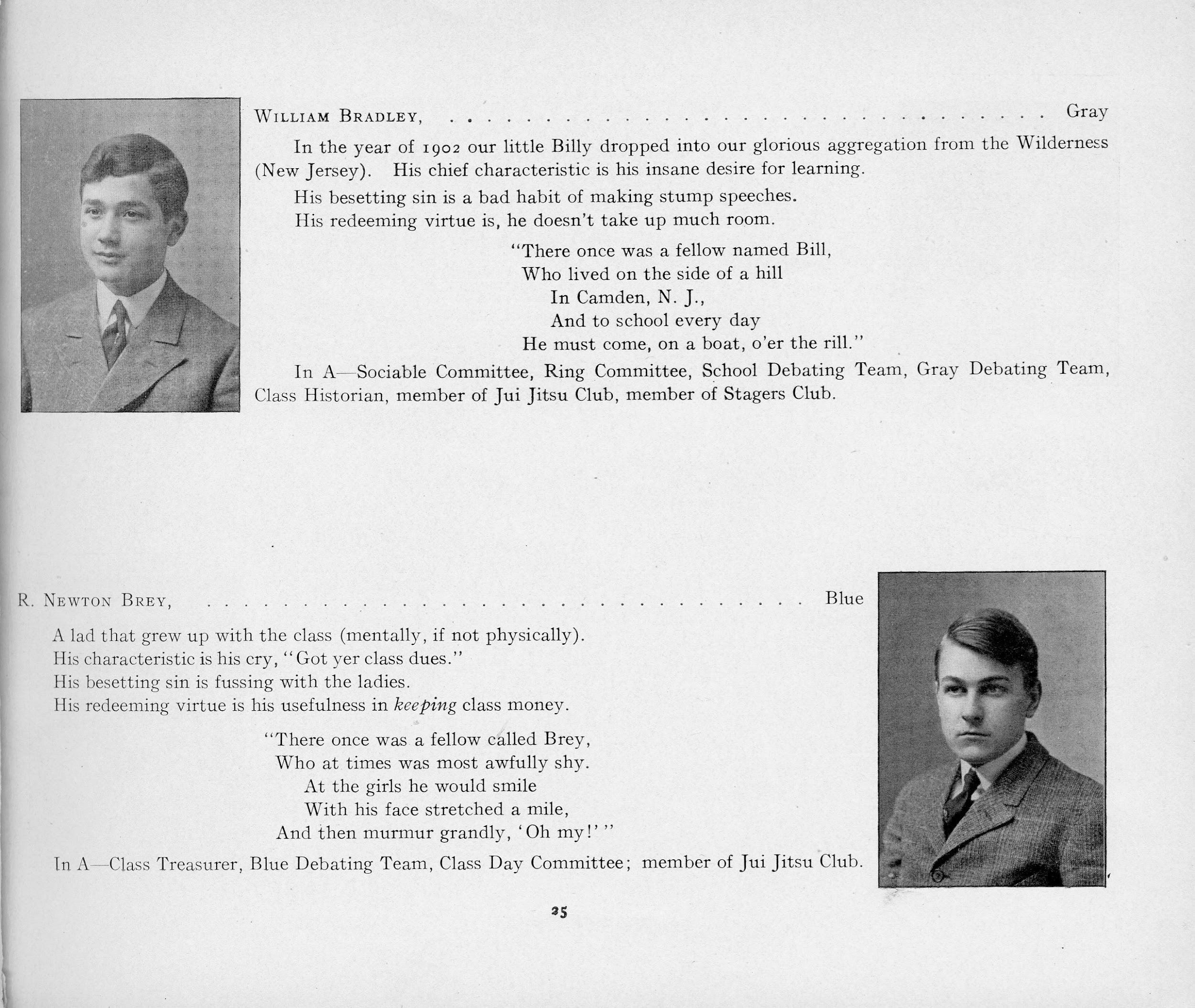
A lad that grew up with the class (mentally, if not physically).
His characteristic is his cry, " Got yer class dues. "
His besetting sin is fussing with the ladies.
His redeeming virtue is his usefulness in keeping class money.
'There once was a fellow called Brey, Who at times was most awfully shy.
At the girls he would smile
With his face stretched a mile, And then murmur grandly, ' Oh my!' "
Class Treasurer, Blue Debating Team, Class Day Committee ;
member of Jui Jitsu Club.
Gray Debating Team,
R. NEWTON BREY,
Blue
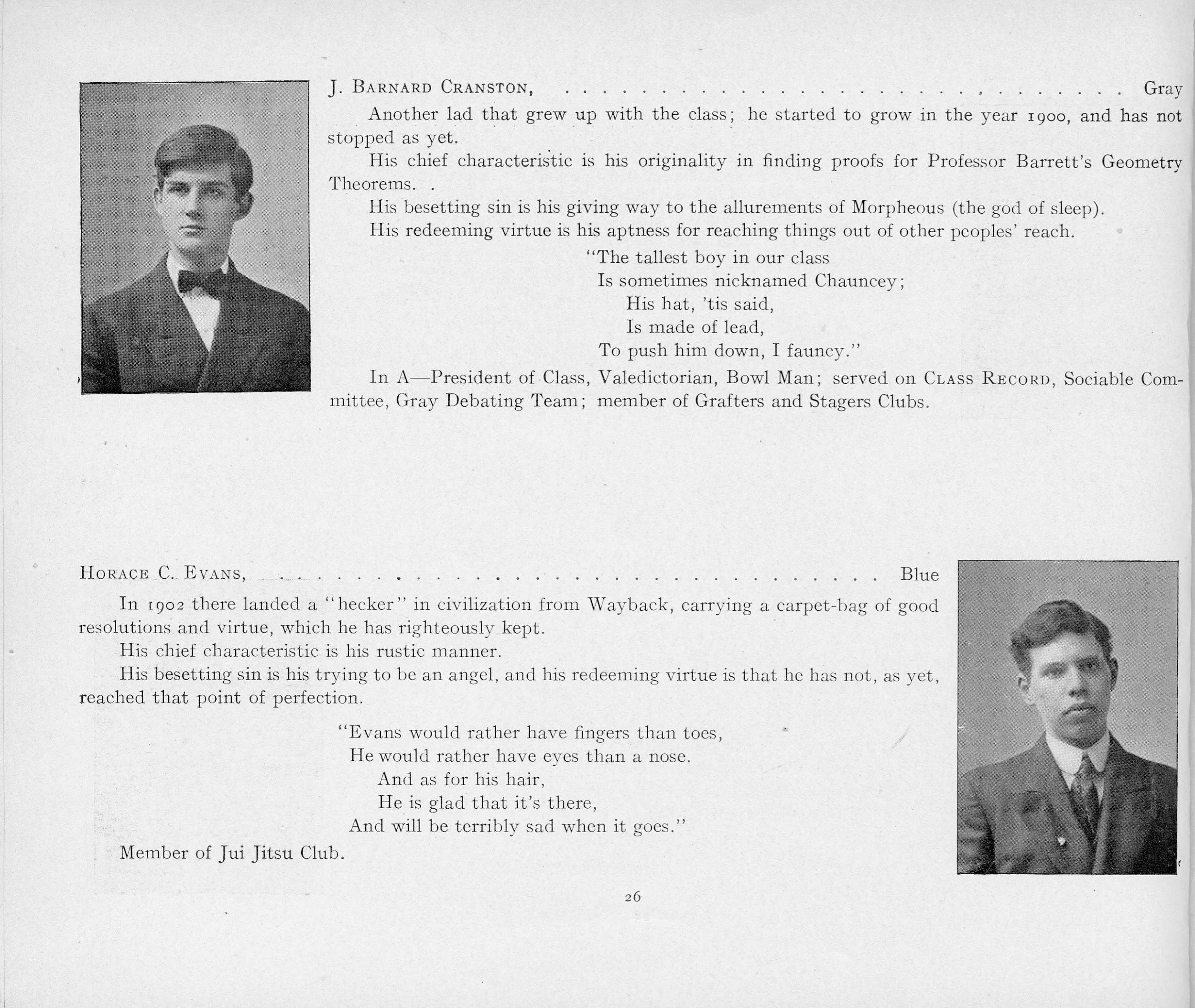
J. BARNARD CRANSTON, Gray
Another lad that grew up with the class; he started to grow in the year 1900, and has not stopped as yet.
His chief characteristic is his originality in finding proofs for Professor Barrett's Geometry Theorems.
His besetting sin is his giving way to the allurements of Morpheous (the god of sleep). His redeeming virtue is his aptness for reaching things out of other peoples' reach.
"The tallest boy in our class Is sometimes nicknamed Chauncey ; His hat, 'tis said, Is made of lead, To push him down, I fauncy."
In A—President of Class, mittee, Gray Debating Team ;
Valedictorian, Bowl Man; served on CLASS RECORD, Sociable Com-
HORACE C. EVANS, member of Grafters and Stagers Clubs.
Blue
In 1902 there landed a " hecker " in civilization from Wayback, carrying a carpet-bag of good resolutions and virtue, which he has righteously kept.
His chief characteristic is his rustic manner.
His besetting sin is his trying to be an angel, and his redeeming virtue is that he has not, as yet, reached that point of perfection.
' 'Evans would rather have fingers than toes, He would rather have eyes than a nose.
And as for his hair,
He is glad that it's there, And will be terribly sad when it goes."
Member of Jui Jitsu Club.
JOHN F. JACOBV,
In 1903 the " nought fivers " were surprised to see Apollo step down from Olympus and grace their lovely presence.
His characteristic is his bright and jolly disposition. His begetting sin is continual kicking, simply for kicking's sake.
His redeeming virtue is his studiousness (?).
There once was a fellow named John, Who got up every morning at dawn And ran sixteen miles
With his face wreathed in smiles, This very industrious John."
In A—Captain of Football Team, Captain of Baseball Team, member of Banquet Committee, and Cane Man. In B—Captain of Football Team and Baseball Team, Main Mucky Muck of Grafters' Club.
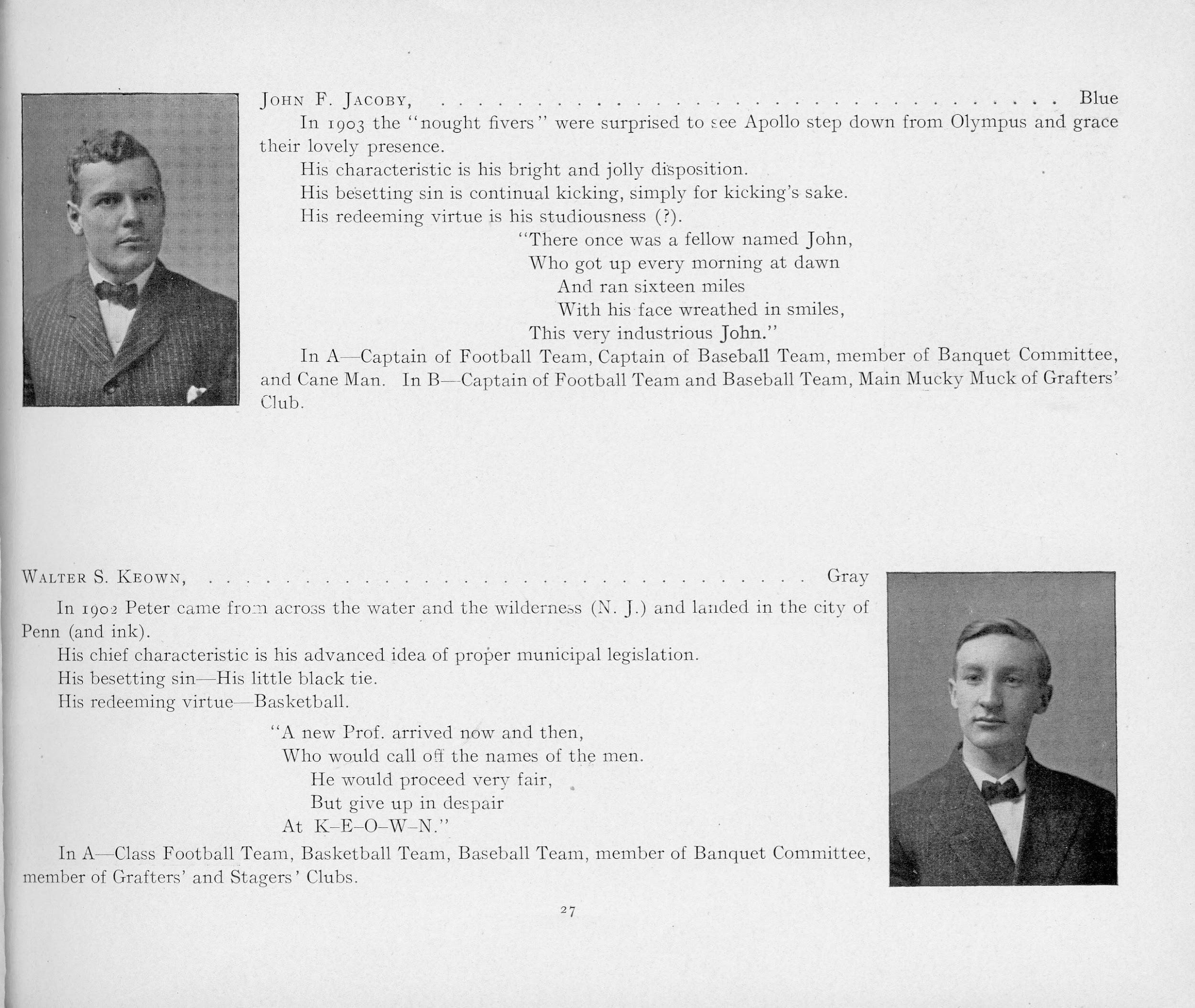
WALTER S. KEOWN,
In 1902 Peter came across the water and the wilderness (N. J.) and lauded in the city of Penn (and ink).
His chief characteristic is his advanced idea of proier municipal legislation. His besetting sin—His little black tie. His redeeming virtue—Basketba11.
"A new Prof. arrived now and then, Who would call off the names of the men. He would proceed very fair, But give up in despair At K-E-O-W-N."
In A—Class Football Team, Basketball Team, Baseball Team, member of Banquet Committee, member of Grafters' and Stagers ' Clubs.
Blue
Gray
HOWARD M. LUTZ,
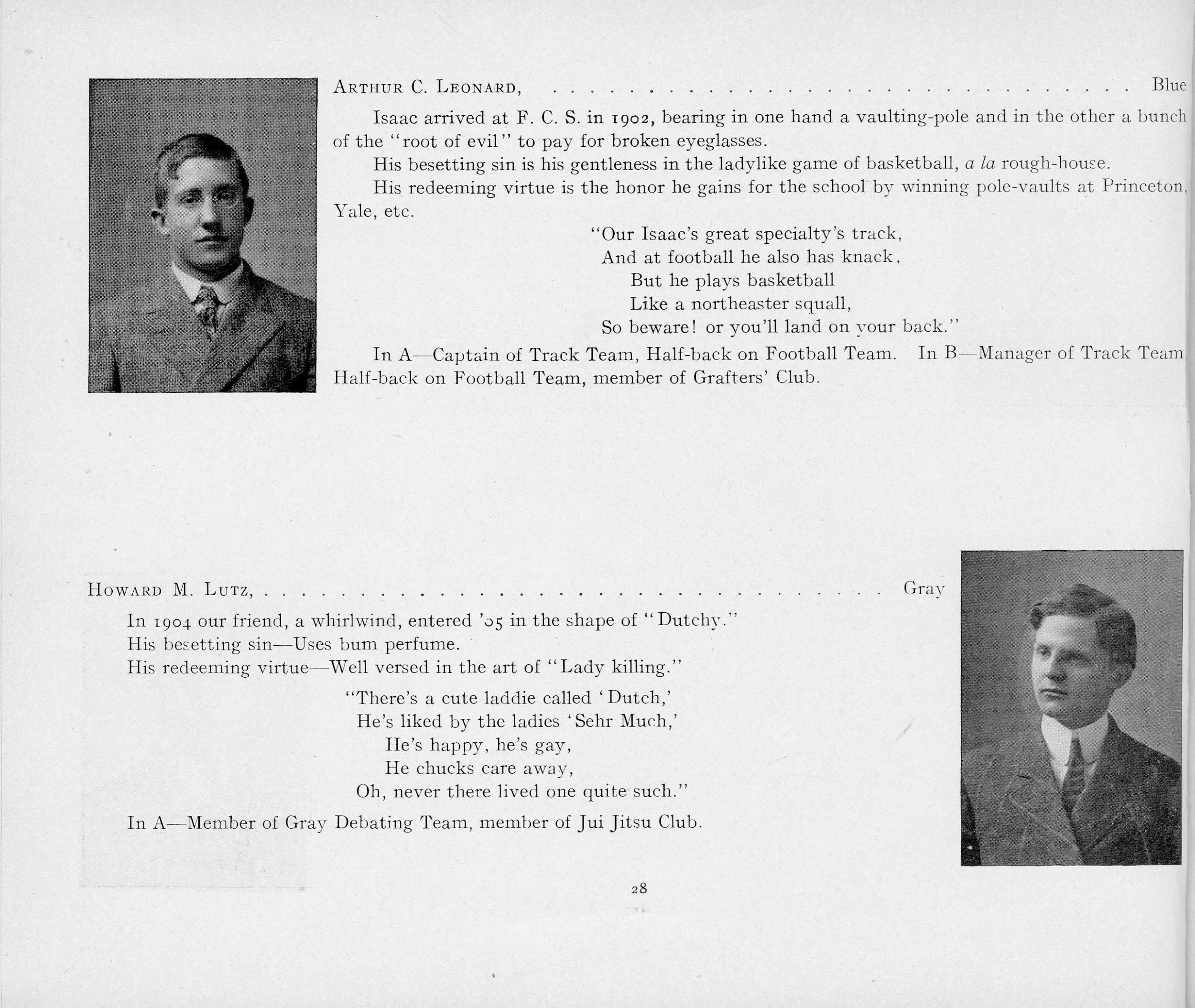
ARTHUR C. LEONARD, Blue
Isaac arrived at F. C. S. in 1902, bearing in one hand a vaulting-pole and in the other a bunch of the " root of evil " to pay for broken eyeglasses.
His besetting sin is his gentleness in the ladylike game of basketball, a la rough-house. His redeeming virtue is the honor he gains for the school by winning pole-vaults at Princeton, Yale, etc.
"Our Isaac's great specialty's track, And at football he also has knack
But he plays basketball
Like a northeaster squall, So beware! or you'll land on your back. "
In A—Captain of Track Team, Half-back on Football Team. In B Half-back on Football Team, member of Grafters' Club.
Grav Manager of Track Team
In 1904 our friend, a whirlwind, entered '05 in the shape of " Dutchy. His besetting sin—Uses bum perfume. His redeeming virtue—Well versed in the art of " Lady killing."
'There's a cute laddie called ' Dutch,' He's liked by the ladies 'Sehr Much,'
He's happy, he's gay, He chucks care away,
Oh, never there lived one quite such."
Member of Gray Debating Team, member of Jui Jitsu Club.
HENRY E. MADDOCK,
In 1901 Hennery (not chicken-house) came into the class and started things humming, and they are humming yet.
His chief characteristics are his curly hair and his wide-spreading smile of inward content.
His besetting sin is his affinity for all games of chance.
His redeeming virtue is his knowledge of all things pertaining to curling-irons, etc.
'Maddock, he has curly hair, With which he cuts a caper, And so each night, To keep it right, He does it up in paper.'
In A—Member of Grafters Club (Grand High Grub Tender), Centre Field on Baseball Team, member of Class Football Team. In B—Member of Baseball Team.
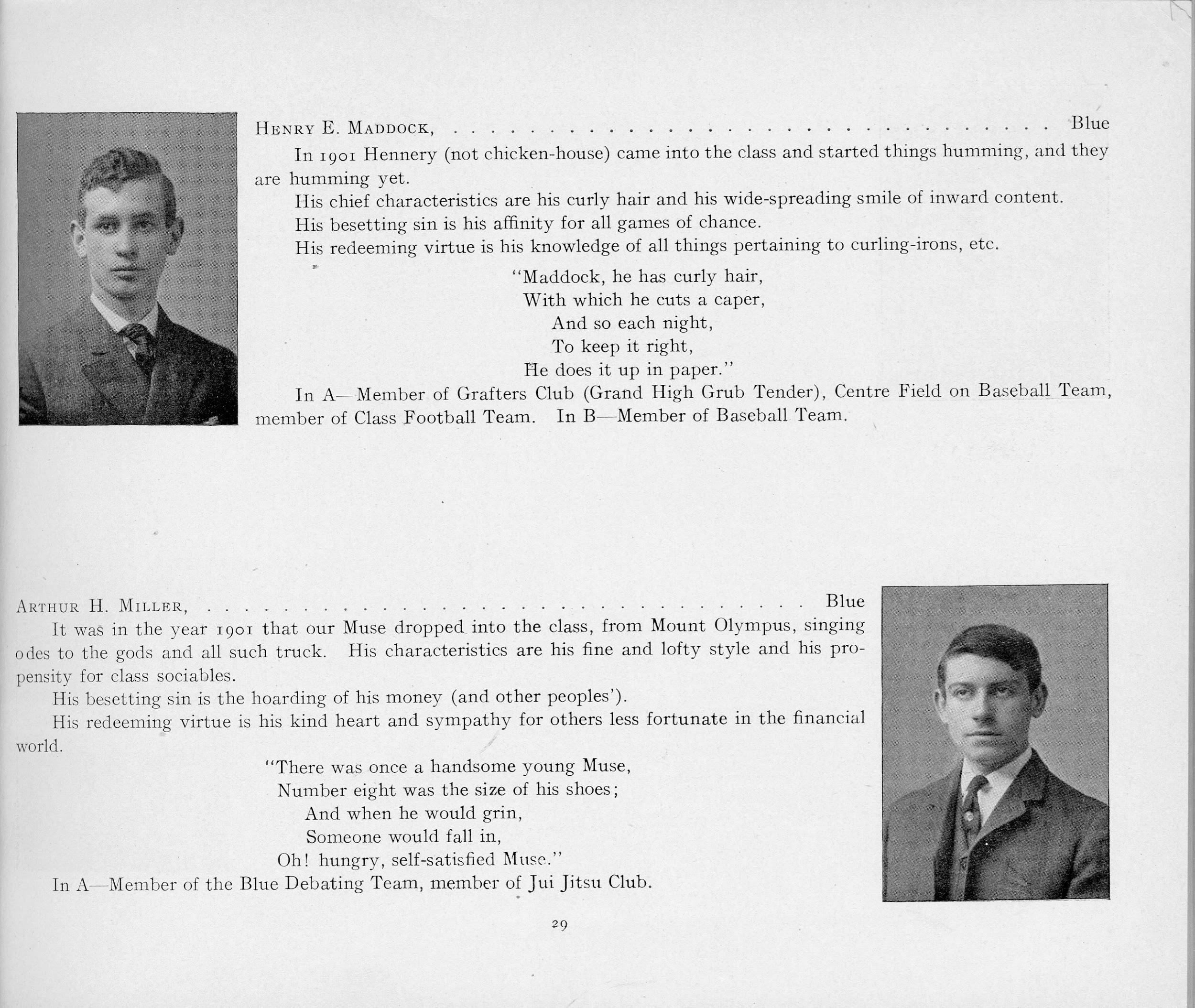
ARTHUR H. MILLER,
It was in the year 1901 that our Muse dropped into the class, from Mount Olympus, singing odes to the gods and all such truck. His characteristics are his fine and lofty style and his propensity for class sociables.
His besetting sin is the hoarding of his money (and other peoples'). His redeeming virtue is his kind heart and sympathy for others less fortunate in the financial world.
"There was once a handsome young Muse, Number eight was the size of his shoes ; And when he would grin, Someone would fall in,
Oh! hungry, self-satisfied Muse."
Member of the Blue Debating Team, member of Jui Jitsu Club.
Blue
Blue
J. BURLEIGH MYERS,
J.
HOWARD MITCHELL,
J. H. joined in 19.00, toddling into E with many good resolutions.
His characteristic is his curleigh hair.
His besetting sin is the use of a curling-iron to make " that little dingleberry curl in front. "
"The Ebbit House Mitchell recalls with a vim, And now, if you only just mention to him
The word asafoetida,
And he finds out who-said-it-he Will render his chances for life rather slim. "
Blue
In A—Member of RECORD Staff, Guard on Football Team, member of Basketball Team, Right Field on Baseball Team, member of Grafters Club.
Another fellow that gave us the extreme honor of his presence in 1901.
His chief characteristic is his undeniable French accent.
His besetting sin is his attendance of boxing bouts and placing at stake his hard-earned cash.
His redeeming virtue He's trying his best to look handsome, (He has just dyed his hair—red.)
'Oh, there's our friend called Burleigh, His hair is pink and curleigh. In ' English ' he
Does stunts, you see, Our friend that we call Burleigh.'

Melliber of Jui Jitsu Club.
Blue

TIARRY C. NUSS, Gray
This laddie just arrived this year. He had been sequestering mostly with the B boys, but graduates with us. He's one-hali the College Prep. Class. His characteristic is his interest in all things pertaining to muscular development. His besetting sin is his solemnness, he was never known to laff! His redeeming virtue—He's Irish (?).
'There once was a short bov named Nuss, He kicked up a terrible fuss. He ran out on a track, And never came back.
Oh, wasn't he a cute little cuss ! "
In A—Manager of Track Team, Second Basketball Team. this noted book.)
GEORGE B. SEITZ, (Wrote the Washington Trip for Gray
In our C year we were joined by a Mr. G. Brackett Seitz from the city of baked beans and It was he who first performed the flying fairy stunt on the gym rings, and later ' clevah ideas." with those of the class. He has lovely rosy cheeks and is altogether so bewitching that the feminine tribe flocked to the sociables for the purpose of " Seitz " seeing. His besetting sin is undoubtedly his use of cosmetics, and his redeeming virtue is his beauty, which is thus created.
"There was once a committee on rings, And a hard time it had with the things.
For, although very rash, They gave Seitz the cash, But he couldn't 'freeze on ' to the rings."
In A Class Prophet, Editor of CLASS RECORD, Quarter-back on Football Team, Left Field on Baseball Team, Second Basketball Team. In B—Quarter-back on Second Football Team, Second Baseball Team, member of Grafters' and Stagers' Clubs.
EDWIN SHOEMAKER,
The other half of the College Prep. Class.
His chief characteristic is his superb acting. His besetting sin is his studiousness.
His redeeming virtue is his ability to keep the other half of the College Prep. Class nearly within the bounds of law and order.
"Oh, there once was a maker of shoes, Who would sit by the fire and muse
Of the fair day to come When Eddie could bum. Oh, this lu-gu-gubrious maker of shoes.
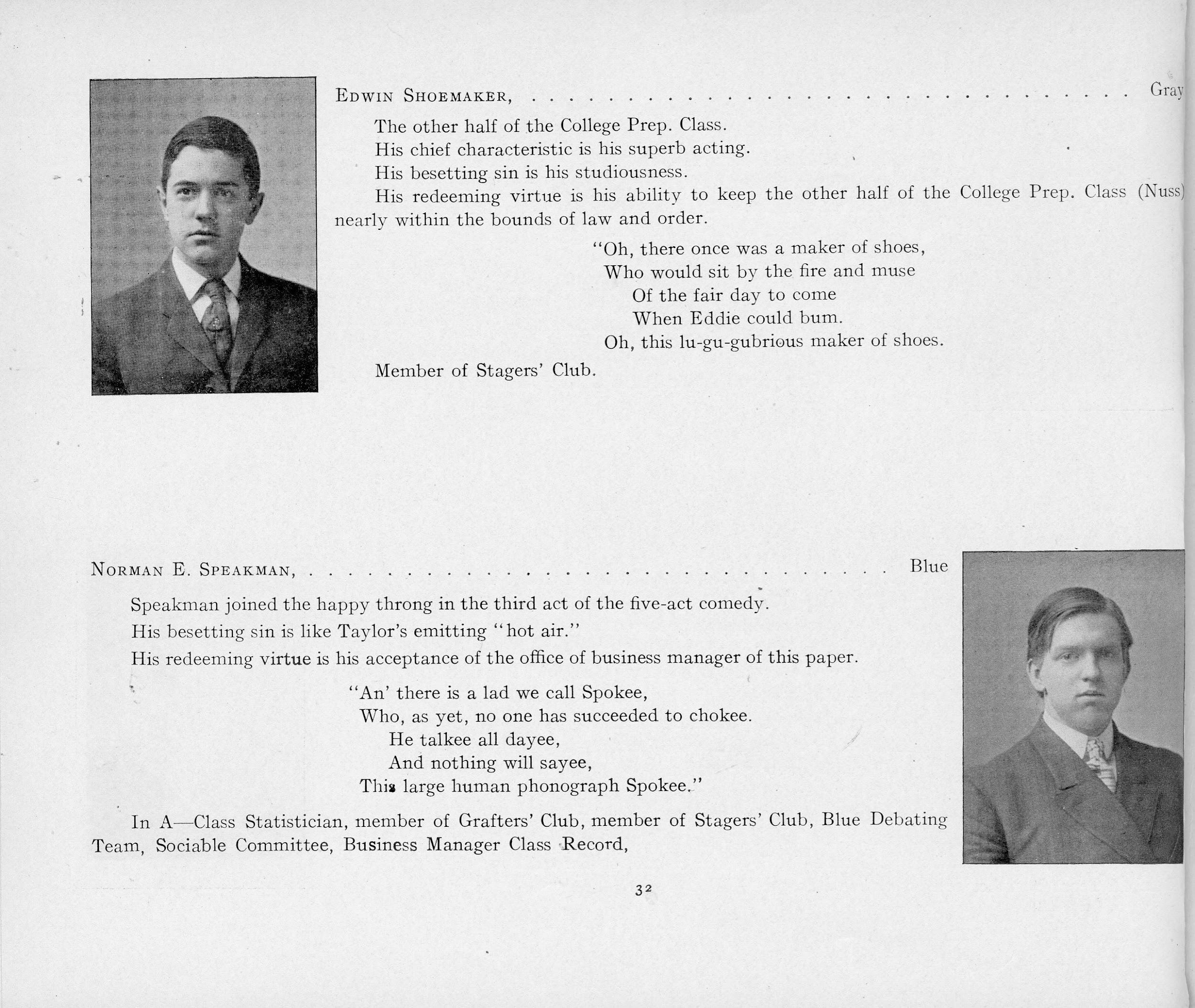
Member of Stagers' Club.
NORMAN E. SPEARMAN,
Speakman joined the happy throng in the third act of the five-act comedy.
His besetting sin is like Taylor's emitting " hot air."
His redeeming virtue is his acceptance of the office of business manager of this paper.
"An' there is a lad we call Spokee, Who, as yet, no one has succeeded to chokee. He talkee all dayee, And nothing will sayee,
This large human phonograph Spokee."
In A—Class Statistician, member of Grafters' Club, member of Stagers' Team, Sociable Committee, Business Manager Class •Record,
Club, Blue Blue Debating
Gravl (Nuss)
GRANVILLE TAYLOR,
ALEXANDER
McK. SWAIN,
In E our Alex love !! joined us.
His chief characteristic is his beautiful all-burnt hair. His besetting sin—He a woman hater !! Blue
His redeeming virtue is his athletic ability and being an all-around good fellow and one that would do anything for you.
"Alex is a handsome lad, Toward redness he doth lean, And so in bed He soaks his head In oil and vaseline."
In A—-Member of RECORD Staff, Half-back on Football Team, Captain of Basketball Team, member of Track Team, Bowl Man. In B—Basketba11 Team, Track Team, member of Grafters' Club.
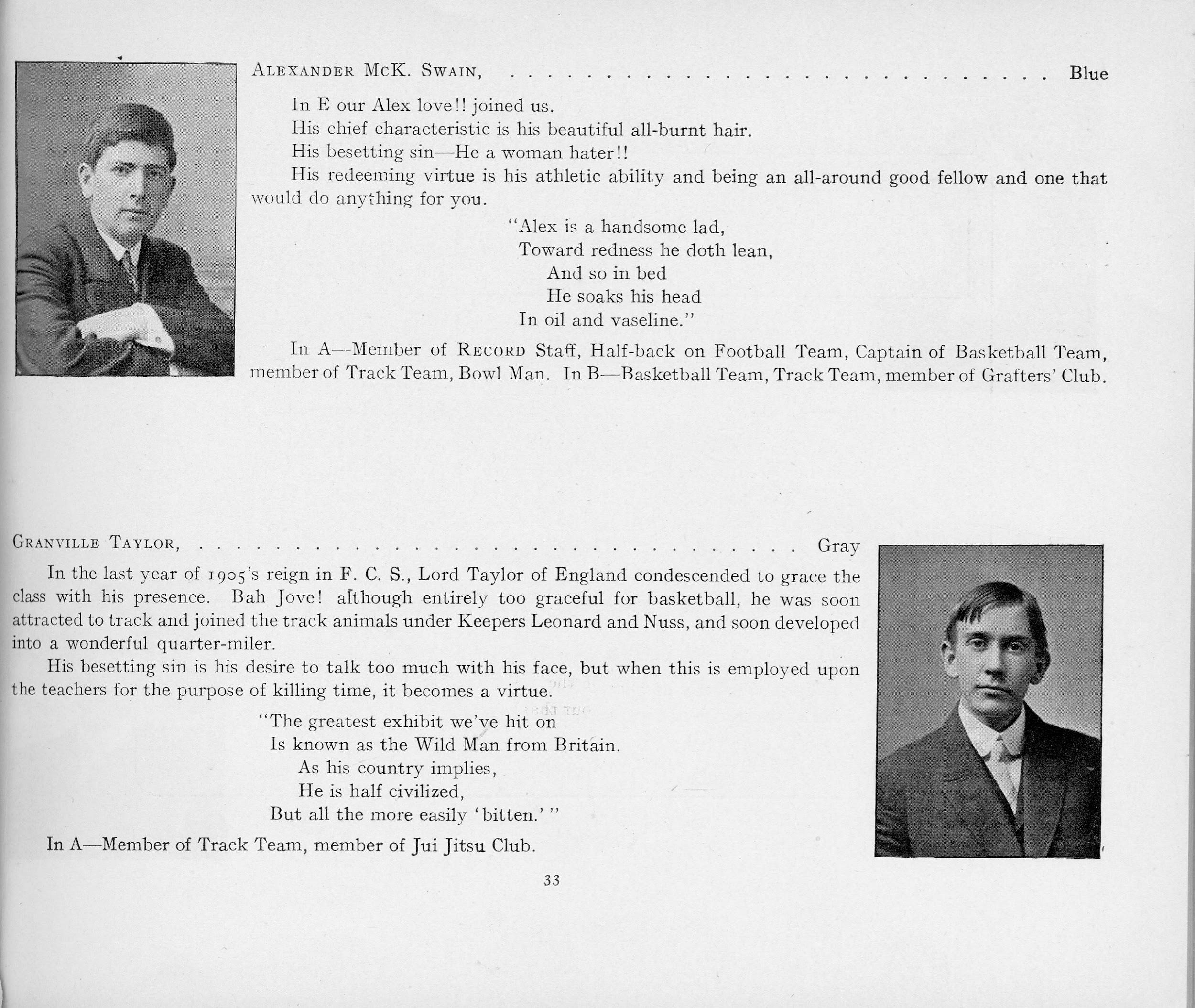
Gray
In the last year of 1905 's reign in F. C. S. , Lord Taylor of England condescended to grace the class with his presence. Bah Jove! afthough entirely too graceful for basketball, he was soon attracted to track and joined the track animals under Keepers Leonard and Nuss, and soon developed into a wonderful quarter-miler.
His besetting sin is his desire to talk too much with his face, but when this is employed upon the teachers for the purpose of killing time, it becomes a virtue.
'The greatest exhibit we've hit on Is known as the Wild Man from Britain.
As his country implies, He is half civilized, But all the more easily 'bitten.' "
Member of Track Team, member of Jui Jitsu Club. 33
SOCIAL
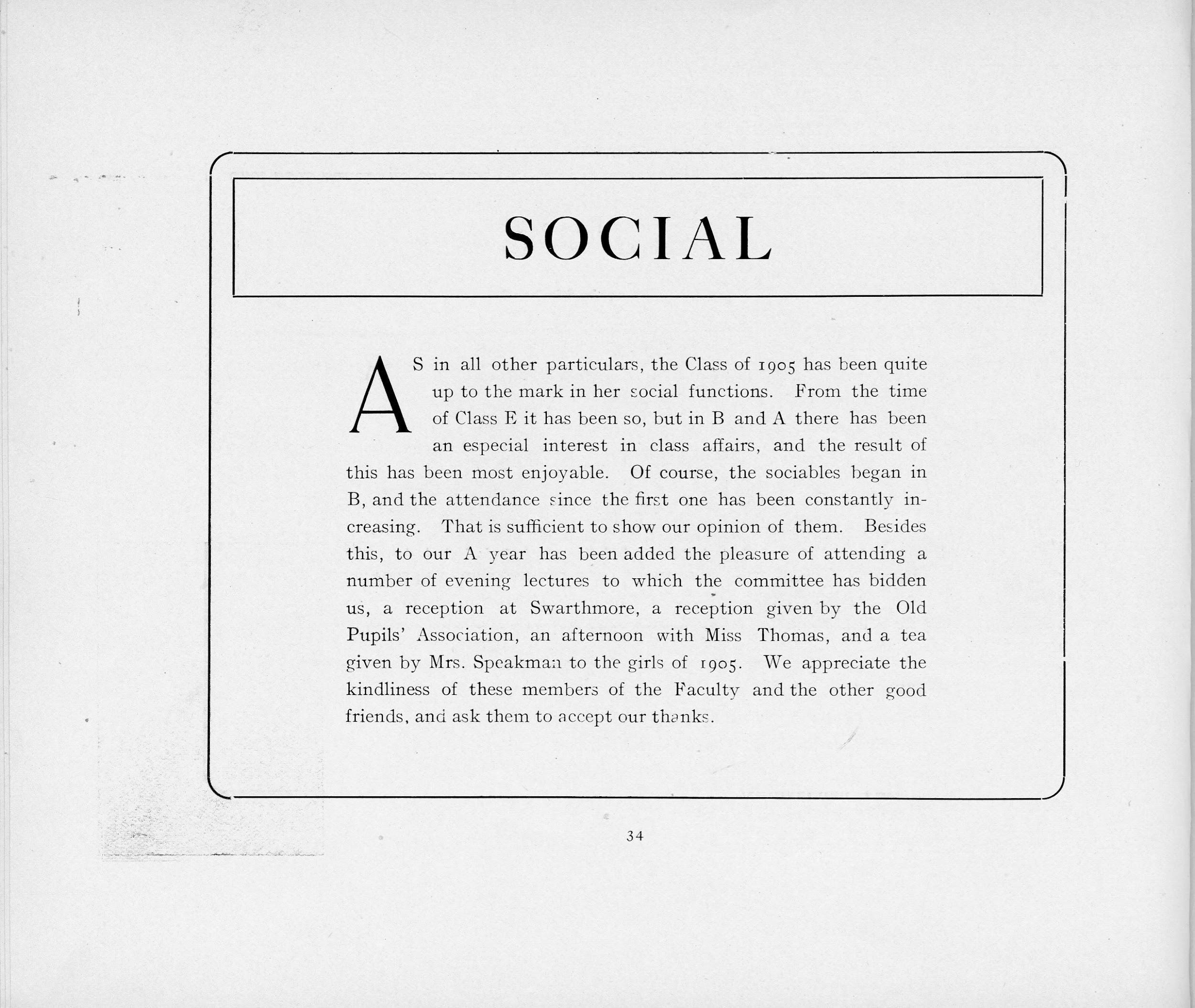
S in all other particulars, the Class of 1905 has been quite up to the mark in her social functions. From the time of Class E it has been so, but in B and A there has been an especial interest in class affairs, and the result of this has been most enjoyable. Of course, the sociables began in B, and the attendance since the first one has been constantly increasing. That is sufficient to show our opinion of them. Besides this, to our A year has been added the pleasure of attending a number of evening lectures to which the committee has bidden us, a reception at Swarthmore, a reception given by the Old Pupils' Association, an afternoon with Miss Thomas, and a tea given by Mrs. Speakman to the girls of r 905. We appreciate the kindliness of these members of the Faculty and the other good friends, and ask them to accept our thanks.
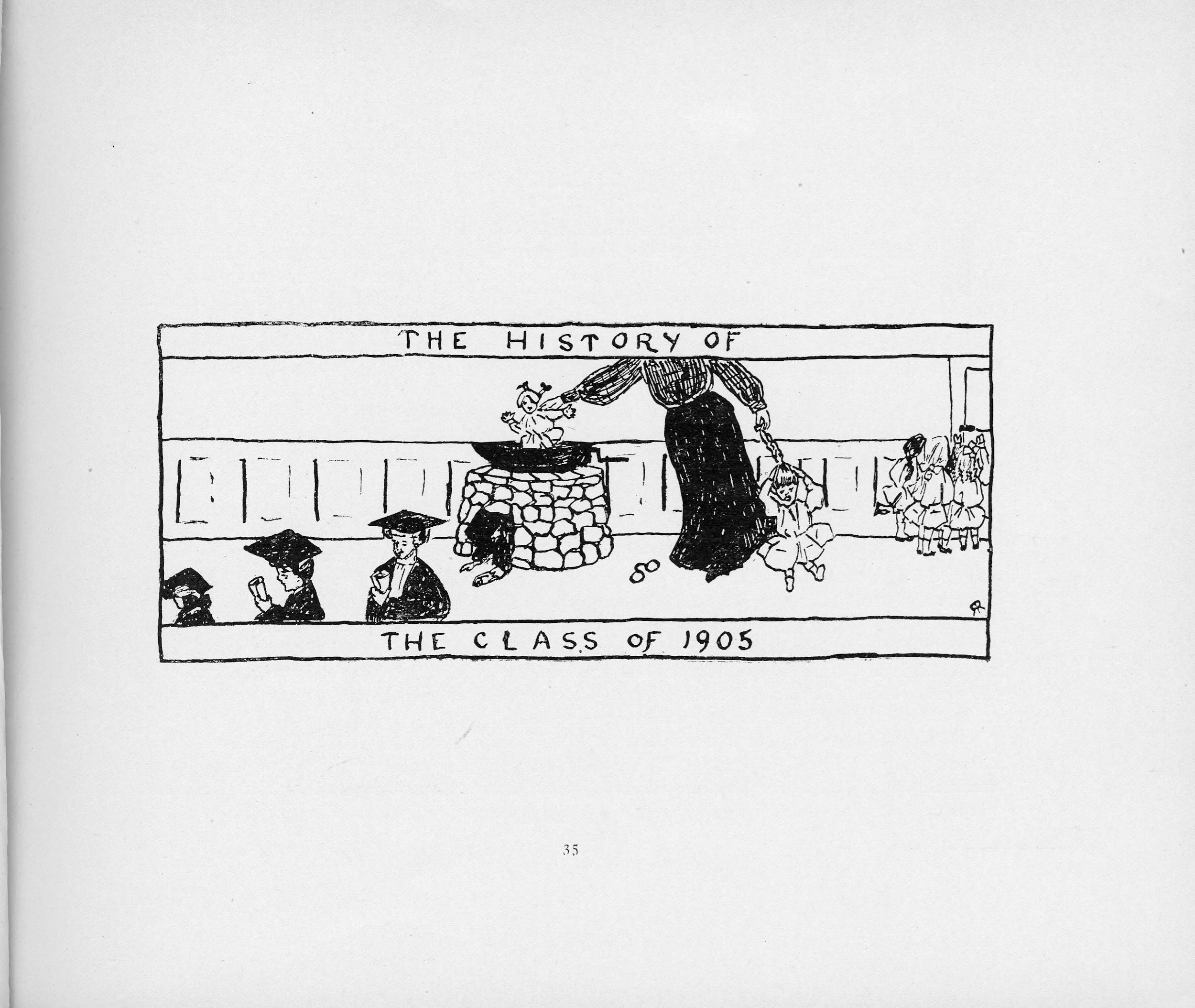
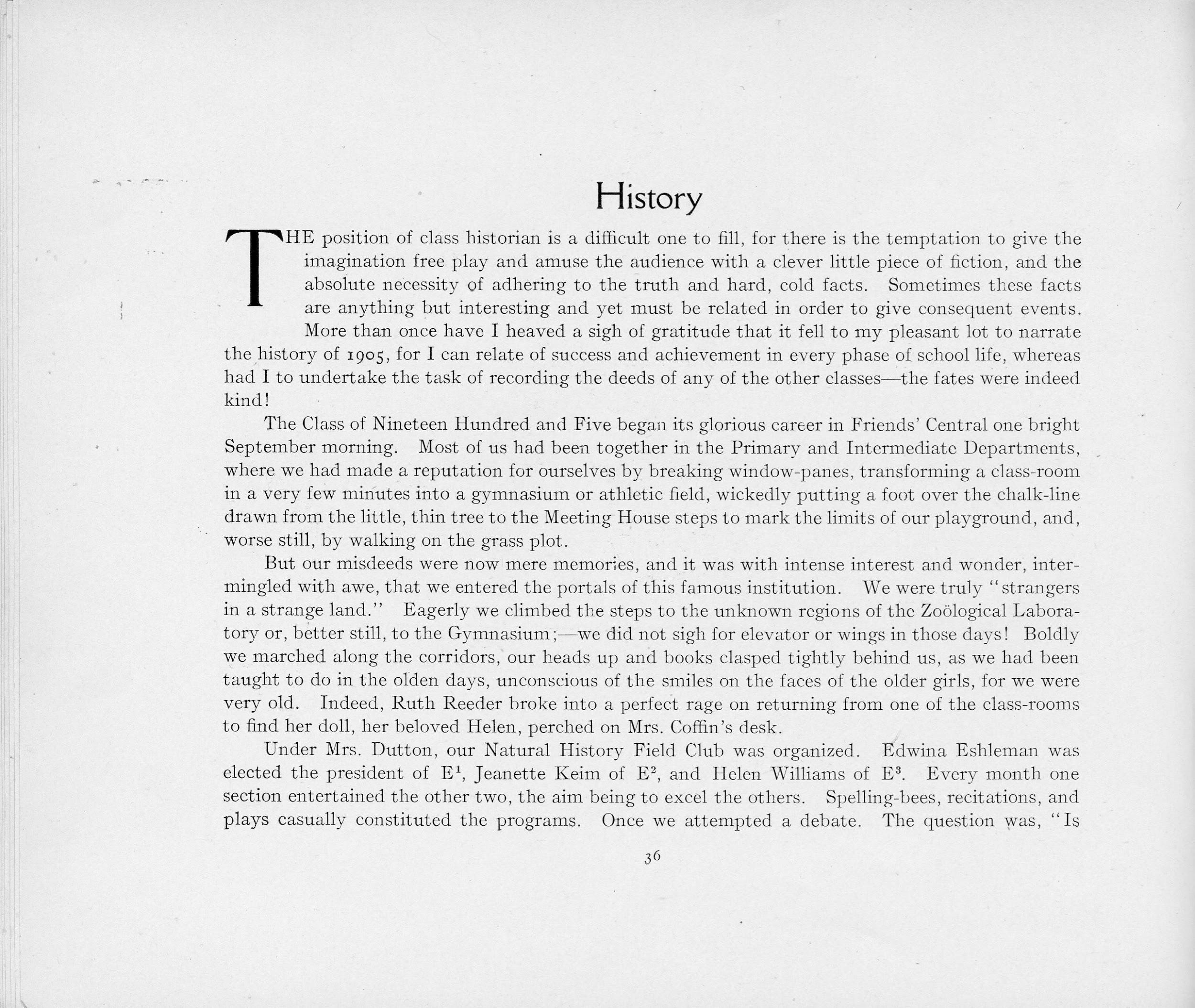
History
HE position of class historian is a difficult one to fill, for there is the temptation to give the imagination free play and amuse the audience with a clever little piece of fiction, and the absolute necessity of adhering to the truth and hard, cold facts. Sometimes these facts are anything but interesting and yet must be related in order to give consequent events. More than once have I heaved a sigh of gratitude that it fell to my pleasant lot to narrate the history of 1905, for I can relate of success and achievement in every phase of school life, whereas had I to undertake the task of recording the deeds of any of the other classes—the fates were indeed kind !
The Class of Nineteen Hundred and Five began its glorious career in Friends' Central one bright September morning. Most of us had been together in the Primary and Intermediate Departments, where we had made a reputation for ourselves by breaking window-panes, transforming a class-room in a very few minutes into a gymnasium or athletic field, wickedly putting a foot over the chalk-line drawn from the little, thin tree to the Meeting House steps to mark the limits of our playground, and, worse still, by walking on the grass plot.
But our misdeeds were now mere memories, and it was with intense interest and wonder, intermingled with awe, that we entered the portals of this famous institution. We were truly " strangers in a strange land." Eagerly we climbed the steps to the unknown regions of the Zoölogical Laboratory or, better still, to the Gymnasium ;—we did not sigh for elevator or wings in those days! Boldly we marched along the corridors, our heads up and books clasped tightly behind us, as we had been taught to do in the olden days, unconscious of the smiles on the faces of the older girls, for we were very old. Indeed, Ruth Reeder broke into a perfect rage on returning from one of the class-rooms to find her doll, her beloved Helen, perched on Mrs. Coffin's desk.
Under Mrs. Dutton, our Natural History Field Club was organized. Edwina Eshleman was elected the president of El Jeanette Reim of E2, and Helen Williams of E3. Every month one section entertained the other two, the aim being to excel the others. Spelling-bees, recitations, and plays casually constituted the programs. Once we attempted a debate. The question was, " Is
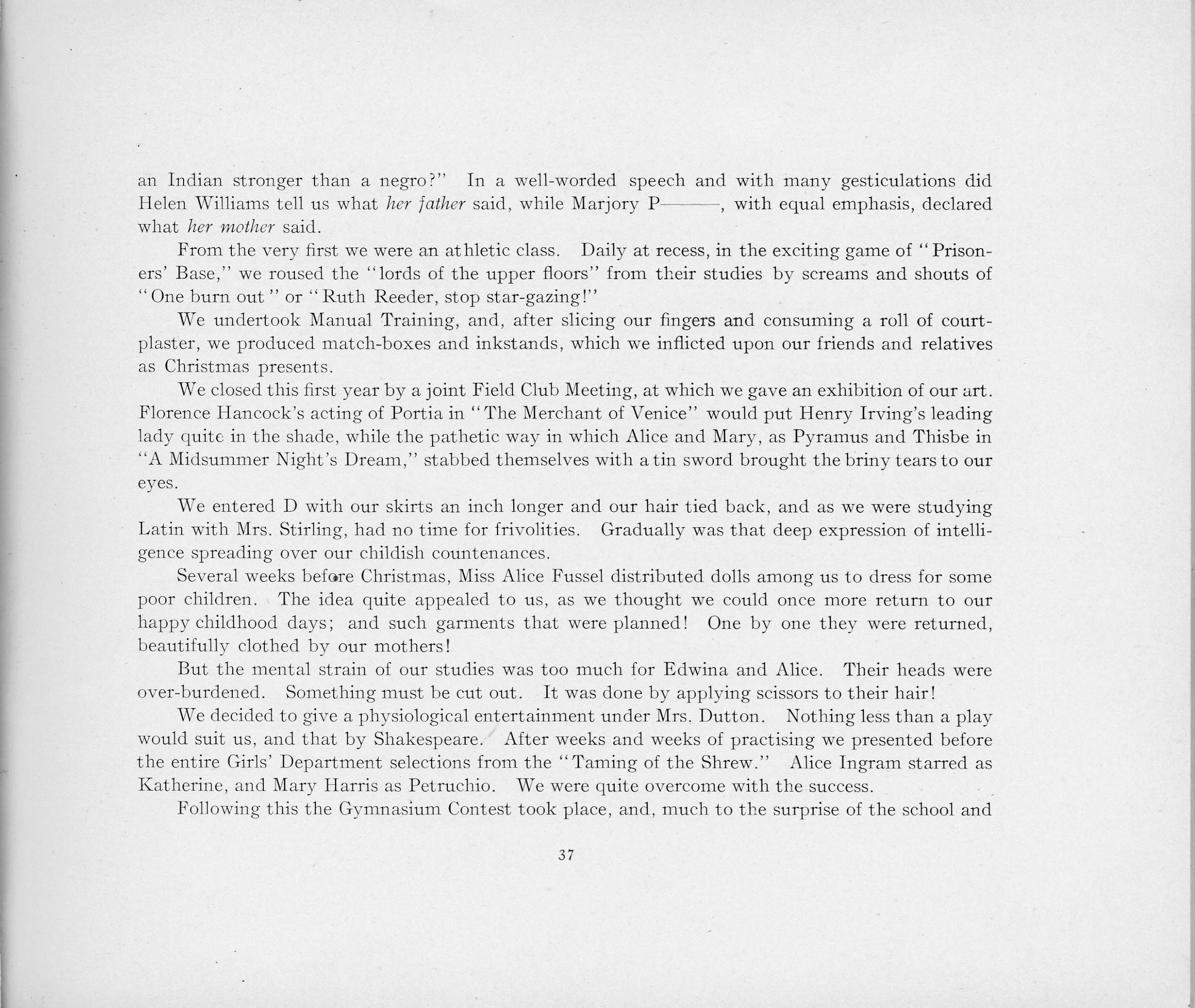
an Indian stronger than a negro ? " In a well-worded speech and with many gesticulations did Helen Williams tell us what her father said, while Marjory P with equal emphasis, declared what her mother said.
From the very first we were an athletic class. Daily at recess, in the exciting game of " Prisoners' Base," we roused the "lords of the upper floors" from their studies by screams and shouts of One burn out " or " Ruth Reeder, stop star-gazing!"
We undertook Manual Training, and, after slicing our fingers and consuming a roll of courtplaster, we produced match-boxes and inkstands, which we inflicted upon our friends and relatives as Christmas presents.
We closed this first year by a joint Field Club Meeting, at which we gave an exhibition of our art. Florence Hancock's acting of Portia in " The Merchant of Venice" would put Henry Irving's leading lady quite in the shade, while the pathetic way in which Alice and Mary, as Pyramus and Thisbe in "A Midsummer Night's Dream," stabbed themselves with a tin sword brought the briny tears to our eyes.
We entered D with our skirts an inch longer and our hair tied back, and as we were studying Latin with Mrs. Stirling, had no time for frivolities. Gradually was that deep expression of intelligence spreading over our childish countenances.
Several weeks before Christmas, Miss Alice Fussel distributed dolls among us to dress for some poor children. The idea quite appealed to us, as we thought we could once more return to our happy childhood days; and such garments that were planned! One by one they were returned, beautifully clothed by our mothers !
But the mental strain of our studies was too much for Edwina and Alice. Their heads were over-burdened. Something must be cut out. It was done by applying scissors to their hair!
We decided to give a physiological entertainment under Mrs. Dutton. Nothing less than a play would suit us, and that by Shakespeare. After weeks and weeks of practising we presented before the entire Girls' Department selections from the " Taming of the Shrew." Alice Ingram starred as Katherine, and Mary Harris as Petruchio. We were quite overcome with the success.
Following this the Gymnasium Contest took place, and, much to the surprise of the school and
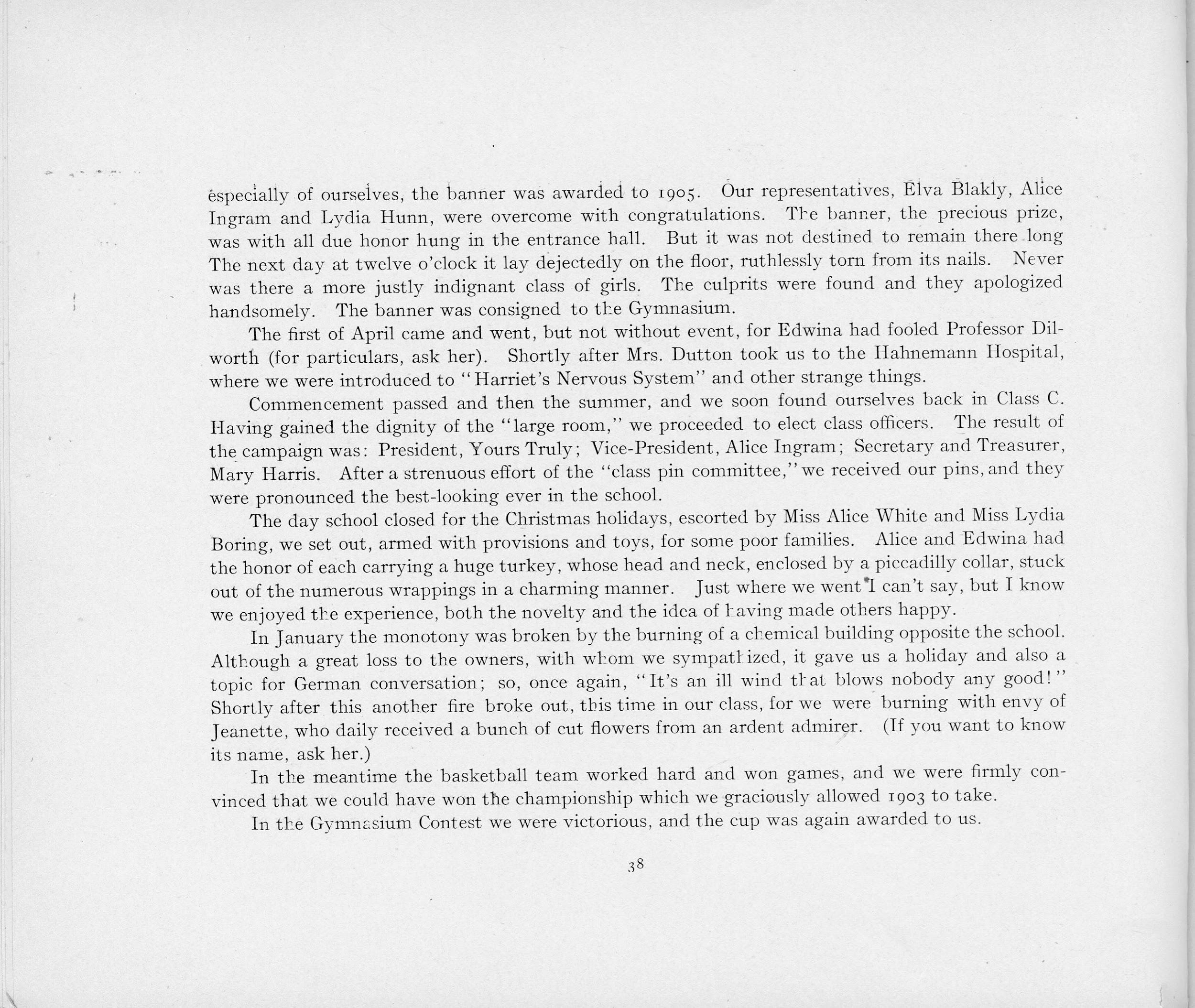
éspeclally of ourselves, the Banner was awarded to 1905. Our representatives, Elva Blakly, Alice Ingram and Lydia Hunn, were overcome with congratulations. The banner, the precious prize, was with all due honor hung in the entrance hall. But it was not destined to remain there long The next day at twelve o'clock it lay dejectedly on the floor, ruthlessly torn from its nails. Never was there a more justly indignant class of girls. The culprits were found and they apologized handsomely. The banner was consigned to the Gymnasium.
The first of April came and went, but not without event, for Edwina had fooled Professor Dilworth (for particulars, ask her). Shortly after Mrs. Dutton took us to the Hahnemann Hospital, where we were introduced to " Harriet's Nervous System" and other strange things.
Commencement passed and then the summer, and we soon found ourselves back in Class C. Having gained the dignity of the " large room," we proceeded to elect class officers. The result of the campaign was: President, Yours Truly; Vice-President, Alice Ingram; Secretary and Treasurer, Mary Harris. After a strenuous effort of the "class pin committee," we received our pins, and they were pronounced the best-looking ever in the school.
The day school closed for the Christmas holidays, escorted by Miss Alice White and Miss Lydia Boring, we set out, armed with provisions and toys, for some poor families. Alice and Edwina had the honor of each carrying a huge turkey, whose head and neck, enclosed by a piccadilly collar, stuck out of the numerous wrappings in a charming manner. Just where we went 'I can't say, but I know we enjoyed the experience, both the novelty and the idea of I-aving made others happy.
In January the monotony was broken by the burning of a chemical building opposite the school. Although a great loss to the owners, with whom we sympatl ized, it gave us a holiday and also a topic for German conversation; so, once again, " It's an ill wind t} at blows nobody any good! "
Shortly after this another fire broke out, this time in our class, for we were burning with envy of Jeanette, who daily received a bunch of cut flowers from an ardent admirer. (If you want to know its name, ask her.)
In the meantime the basketball team worked hard and won games, and we were firmly convinced that we could have won the championship which we graciously allowed 1903 to take.
In the Gymnasium Contest we were victorious, and the cup was again awarded to us.
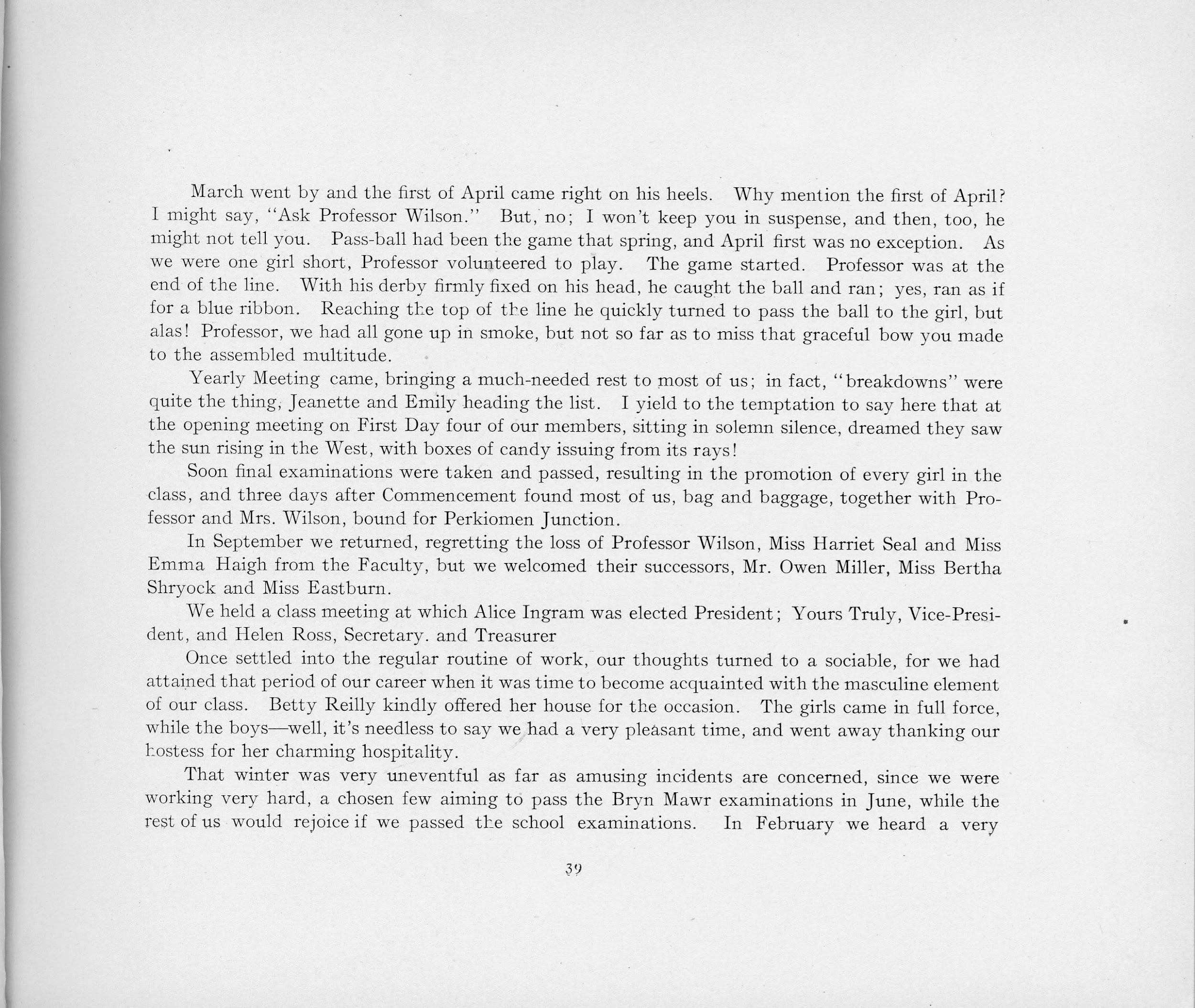
March went by and the first of April came right on his heels. Why mention the first of April? I might say, "Ask Professor Wilson." But, no; I won't keep you in suspense, and then, too, he might not tell you. Pass-ball had been the game that spring, and April first was no exception. As we were one girl short, Professor volunteered to play. The game started. Professor was at the end of the line. With his derby firmly fixed on his head, he caught the ball and ran; yes, ran as if for a blue ribbon. Reaching the top of the line he quickly turned to pass the ball to the girl, but alas! Professor, we had all gone up in smoke, but not so far as to miss that graceful bow you made to the assembled multitude.
Yearly Meeting came, bringing a much-needed rest to most of us; in fact, "breakdowns" were quite the thing, Jeanette and Emily heading the list. I yield to the temptation to say here that at the opening meeting on First Day four of our members, sitting in solemn silence, dreamed they saw the sun rising in the West, with boxes of candy issuing from its rays !
Soon final examinations were taken and passed, resulting in the promotion of every girl in the class, and three days after Commencement found most of us, bag and baggage, together with Professor and Mrs. Wilson, bound for Perkiomen Junction.
In September we returned, regretting the loss of Professor Wilson, Miss Harriet Seal and Miss Emma Haigh from the Faculty, but we welcomed their successors, Mr. Owen Miller, Miss Bertha Shryock and Miss Eastburn.
We held a class meeting at which Alice Ingram was elected President; Yours Truly, Vice-President, and Helen Ross, Secretary. and Treasurer
Once settled into the regular routine of work, our thoughts turned to a sociable, for we had attained that period of our career when it was time to become acquainted with the masculine element of our class. Betty Reilly kindly offered her house for the occasion. The girls came in full force, while the boys—well, it's needless to say we had a very pleasant time, and went away thanking our hostess for her charming hospitality.
That winter was very uneventful as far as amusing incidents are concerned, since we were working very hard, a chosen few aiming to pass the Bryn Mawr examinations in June, while the rest of us would rejoice if we passed the school examinations. In February we heard a very
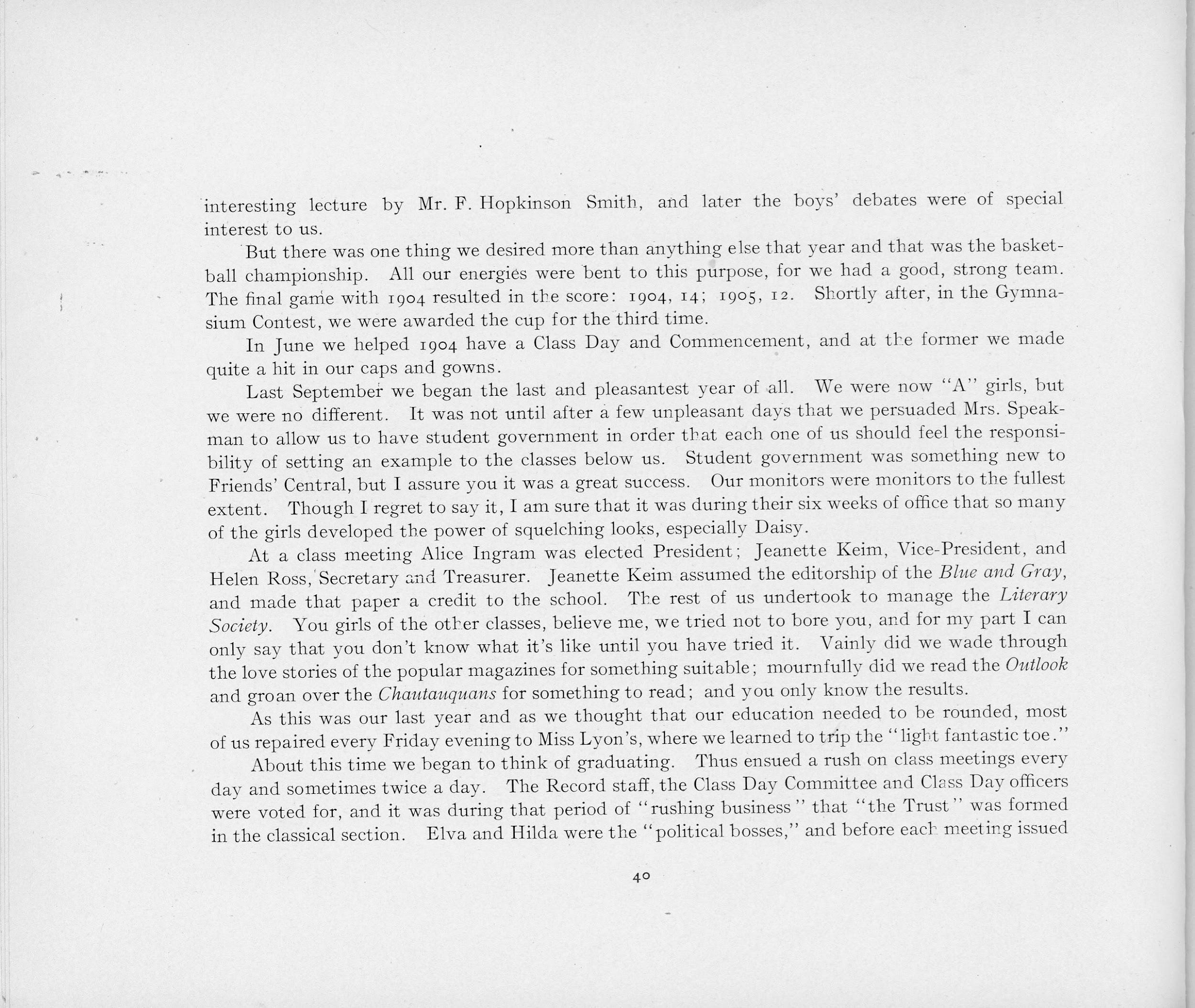
interesting lecture by Mr. F. Hopkinson Smith, and later the boys' debates were of special interest to us.
But there was one thing we desired more than anything else that year and that was the basketball championship. All our energies were bent to this purpose, for we had a good, strong team. The final ganie with 1904 resulted in the score: 1904, 14 ; 1905, 12. Shortly after, in the Gymnasium Contest, we were awarded the cup for the third time.
In June we helped 1904 have a Class Day and Commencement, and at time former we made quite a hit in our caps and gowns.
Last September we began the last and pleasantest year of all. We were now "A" girls, but we were no different. It was not until after a few unpleasant days that we persuaded Mrs. Speakman to allow us to have student government in order that each one of us should feel the responsibility of setting an example to the classes below us. Student government was something new to Friends' Central, but I assure you it was a great success. Our monitors were monitors to the fullest extent. Though I regret to say it, I am sure that it was during their six weeks of office that so many of the girls developed the power of squelching looks, especially Daisy.
At a class meeting Alice Ingram was elected President; Jeanette Keim, Vice-President, and Helen Ross, Secretary and Treasurer. Jeanette Keim assumed the editorship of the Blue and Gray, and made that paper a credit to the school. The rest of us undertook to manage the Literary Society. You girls of the other classes, believe me, we tried not to bore you, and for my part I can only say that you don't know what it's like until you have tried it. Vainly did we wade through the love stories of the popular magazines for something suitable; mournfully did we read the Outlook and groan over the Chautauquans for something to read; and you only know the results.
As this was our last year and as we thought that our education needed to be rounded, most of us repaired every Friday evening to Miss Lyon 's, where we learned to trip the " light fantastic toe "
About this time we began to think of graduating. Thus ensued a rush on class meetings every day and sometimes twice a day. The Record staff, the Class Day Committee and Class Day officers were voted for, and it was during that period of " rushing business " that "the Trust " was formed in the classical section. Elva and Hilda were the " political bosses," and before each meeting issued
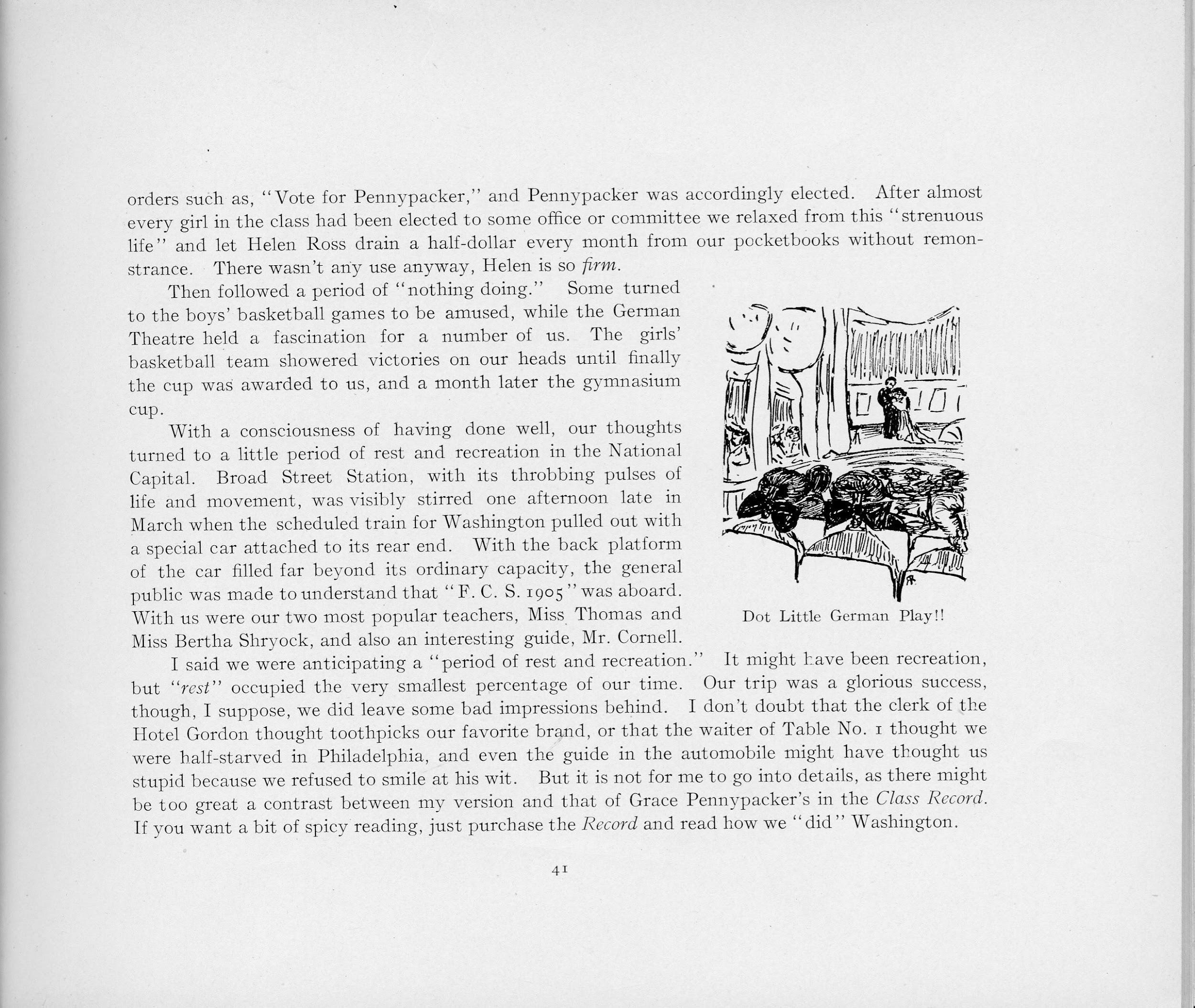
orders such as, " Vote for Pennypacker," and Pennypacker was accordingly elected. After almost every girl in the class had been elected to some office or committee we relaxed from this " strenuous life " and let Helen Ross drain a half-dollar every month from our pocketbooks without remonstrance. There wasn't any use anyway, Helen is so firm.
Some turned Then followed a period of " nothing doing." to the boys' basketball games to be amused, while the German Theatre held a fascination for a number of us. The girls' basketball team showered victories on our heads until finally the cup was awarded to us, and a month later the gymnasium cup.
With a consciousness of having done well, our thoughts turned to a little period of rest and recreation in the National Capital. Broad Street Station, with its throbbing pulses of life and movement, was visibly stirred one afternoon late in March when the scheduled train for Washington pulled out with a special car attached to its rear end. With the back platform of the car filled far beyond its ordinary capacity, the general public was made to understand that " F. C. S. 1905 " was aboard. With us were our two most popular teachers, Miss Thomas and Miss Bertha Shryock, and also an interesting guide, Mr. Cornell.
I said we were anticipating a "period of rest and recreation.
It might Eave been recreation, but "rest" occupied the very smallest percentage of our time. Our trip was a glorious success, though, 1 suppose, we did leave some bad impressions behind. I don't doubt that the clerk of the Hotel Gordon thought toothpicks our favorite brand, or that the waiter of Table No. T thought we were half-starved in Philadelphia, and even the guide in the automobile might have thought us stupid because we refused to smile at his wit. But it is not for me to go into details, as there might be too great a contrast between my version and that of Grace Pennypacker's in the Class Rccord. If you want a bit of spicy reading, just purchase the Record and read how we " did " Washington.
Dot Little German Play!!

After our return from Washington we began work again in real earnest, realizing that our race was almost done. The Record staff began to wear inky fingers and look wise; the Class Day Committee held daily sittings with the agents of various printing houses, while the principals in our dramatic shows held weekly rehearsals, sometimes lasting until midnight.
But it is high time to draw this chronicle to a close. I have merely attempted to recall a few of the experiences that have brightened our five years of close intercourse, for as a class this intercourse ends to-day, and henceforth we shall be one in thought and memories only.
We go out from this school to-morrow—rich in the knowledge we have gained, at the same time realizing we have still much to learn, rich in memories and especially rich in Friendship.
KATHERINE WOLFF.
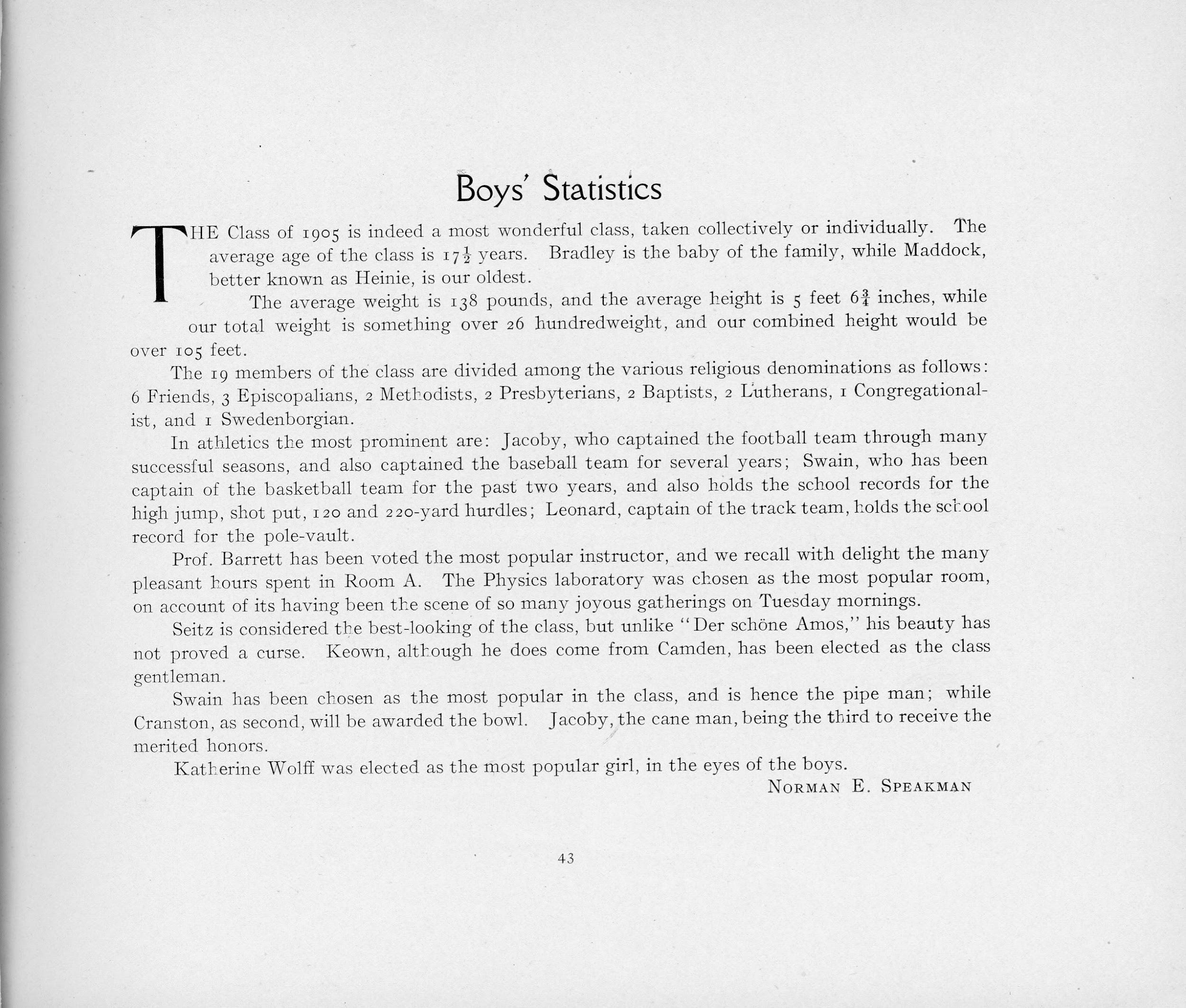
Boys' Statistics
HE Class of 1905 is indeed a most wonderful class, taken collectively or individually. The average age of the class is 17b years. Bradley is the baby of the family, while Maddock, better known as Heinie, is our oldest.
The average weight is 138 pounds, and the average height is 5 feet 6} inches, while our total weight is something over 26 hundredweight, and our combined height would be over 105 feet.
The 19 members of the class are divided among the various religious denominations as follows : 6 Friends, 3 Episcopalians, 2 Methodists, 2 Presbyterians, 2 Baptists, 2 Liltherans, 1 Congregationalist, and 1 Swedenborgian.
In athletics the most prominent are: Jacoby, who captained the football team through many successful seasons, and also captained the baseball team for several years; Swain, who has been captain of the basketball team for the past two years, and also holds the school records for the high jump, shot put, 120 and 220-yard hurdles; Leonard, captain of the track team, holds the scl:ool record for the pole-vault.
Prof. Barrett has been voted the most popular instructor, and we recall with delight the many pleasant hours spent in Room A. The Physics laboratory was chosen as the most popular room, on account of its having been the scene of so many joyous gatherings on Tuesday mornings.
Seitz is considered the best-looking of the class, but unlike " Der schöne Amos," his beauty has not proved a curse. Keown, although he does come from Camden, has been elected as the class gentleman.
Swain has been chosen as the most popular in the class, and is hence the pipe man; while Cranston, as second, will be awarded the bowl. Jacoby, the cane man, being the third to receive the merited honors.
Katherine Wolff was elected as the most popular girl, in the eyes of the boys.
NORMAN E. SPEARMAN
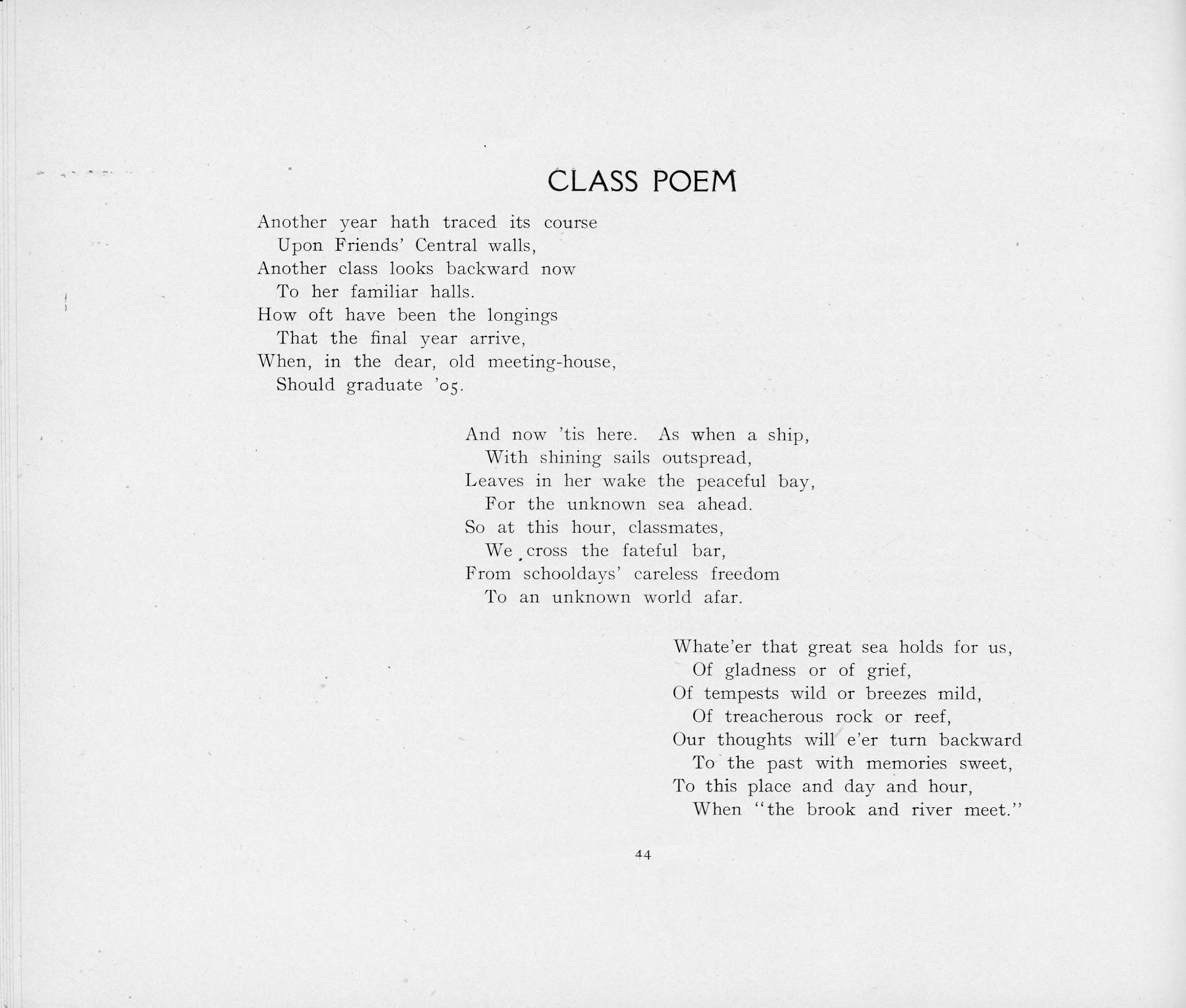
CLASS POEM
Another year hath traced its course
Upon Friends' Central walls, Another class looks backward now
To her familiar halls. How oft have been the longings That the final year arrive, When, in the dear, old meeting-house, Should graduate '05.
And now 'tis here. As when a ship, With shining sails outspread, Leaves in her wake the peaceful bay, For the unknown sea ahead.
So at this hour, classmates, We cross the fateful bar, From schooldays' careless freedom To an unknown world afar.
Whate'er that great sea holds for us, Of gladness or of grief, Of tempests wild or breezes mild, Of treacherous rock or reef, Our thoughts will e'er turn backward To the past with memories sweet, To this place and day and hour, When "the brook and river meet. "
To the times, now left behind us, When, with perseverance bold, We toiled o'er Cæsar's mighty deeds, In the brave days of old; Or on Cicero's long orations
Spent the weary midnight hour, Or found in depths of algebra How limited our power.
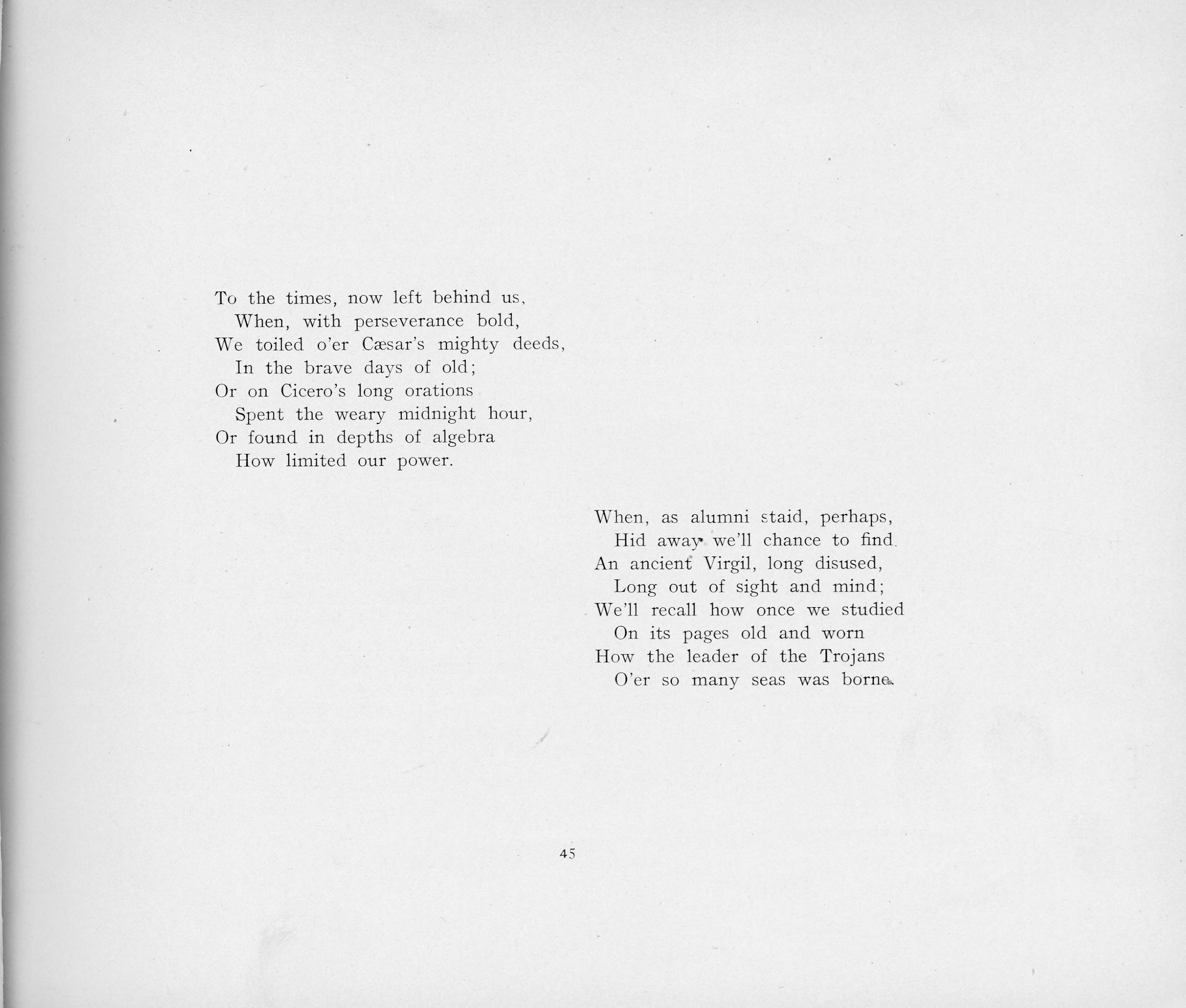
When, as alumni staid, perhaps, Hid away we 'II chance to find
An ancient' Virgil, long disused, Long out of sight and mind ; We'll recall how once we studied
On its pages old and worn How the leader of the Trojans O'er so many seas was borne,
And on the margin of a page, By idle fingers traced,
The figures of the class we. loved, A '05, half-effaced, Will bear us back to days long past,
Days filled with strong intent
To keep those symbols well aloft Where'er our sails were bent,
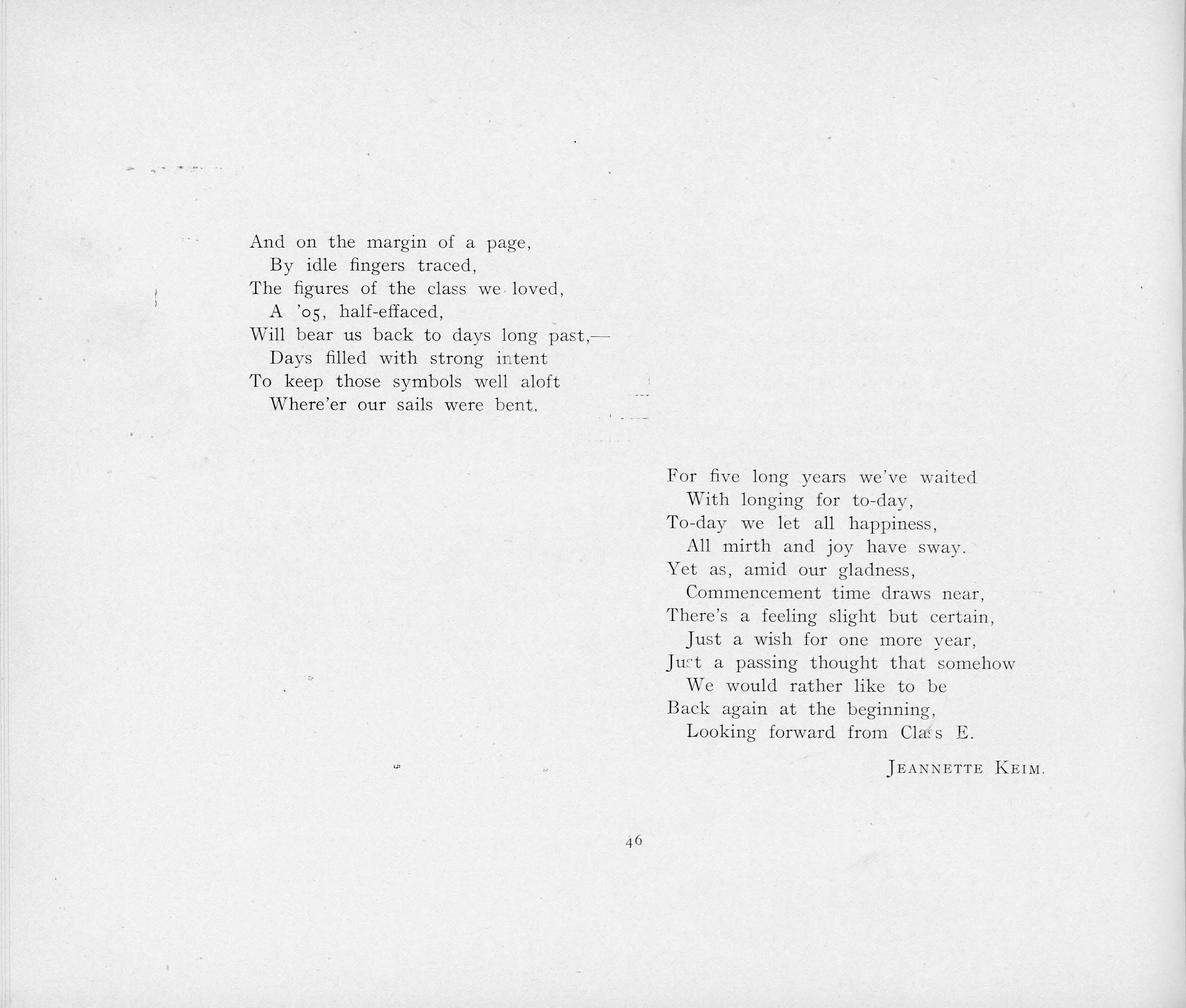
For five long years we've waited With longing for to-day, To-day we let all happiness, All mirth and joy have sway.
Yet as, amid our gladness, Commencement time draws near, There's a feeling slight but certain, Just a wish for one more vear, Juct a passing thought that somehow We would rather like to be
Back again at the beginning, Looking forward from Class E.
JEANNETTE KEIM.


Prophecy
O not think, friends, that this tale which you are about to hear is mere fiction, invented by some one for the sole purpose of amusing you. Nay, on the other hand, it is history, and will go down on the records of history as such.
It was in the year 1930 A. D. that I had just landed at the International Air Ship Station which was situated on the top of the North American Building in Philadelphia. I walked to the edge of the building, and, leaning on the rail, looked over, and a sight met my eyes which would have held you spellbound could you have seen it. Air ships were flitting here and there, the atmosphere was full of the buzz of the wireless telephone messages, and the streets were crowded with people, some walking, some riding in automobiles, but the most of them flying, close to the (1 ground, on the new auto-wings invented by the prominent inventor of the times, Nuss (?) always knew he would be an inventor, because in his school days he could invent such fine tales.)
Pretty soon the friend that was to meet me slapped me on the back, and with a hearty handshake I had been and many exclamations of the pleasure of meeting me again, we started off to the hotel.
away from the country for the last twenty years, being very busy in Africa setting up a refrigerating plant for the ruler of Abyssinia, which was to keep the public highways of this country cool. We reached the hotel,. and after a good wash, because the airship which I was on had passed through a cloud composed of Schuylkill water and I needed a wash, we had dinner and then settled down
I told my companion that the newspapers were not very regularly published for a good old chat. in the heart of Africa, and though I had heard of some great change in the government of the United States I would like the full particulars. My friend then began the following tale: Well, said he, it was about the year 1910 that the society called the Grafters' Club was brought into prominence. Ever since 1905, when we graduated, this club had grown in members and resources until it became the great secret society of the nation. Its membership was about twice as large as all the other societies in America combined, the Masons and Odd Fellows included. The Congressmen of the country were mostly all members of this league, and in 1910 we got a Grafter President in the office. Of course this increased the power of the society most wonderfully, and the chief of it became the
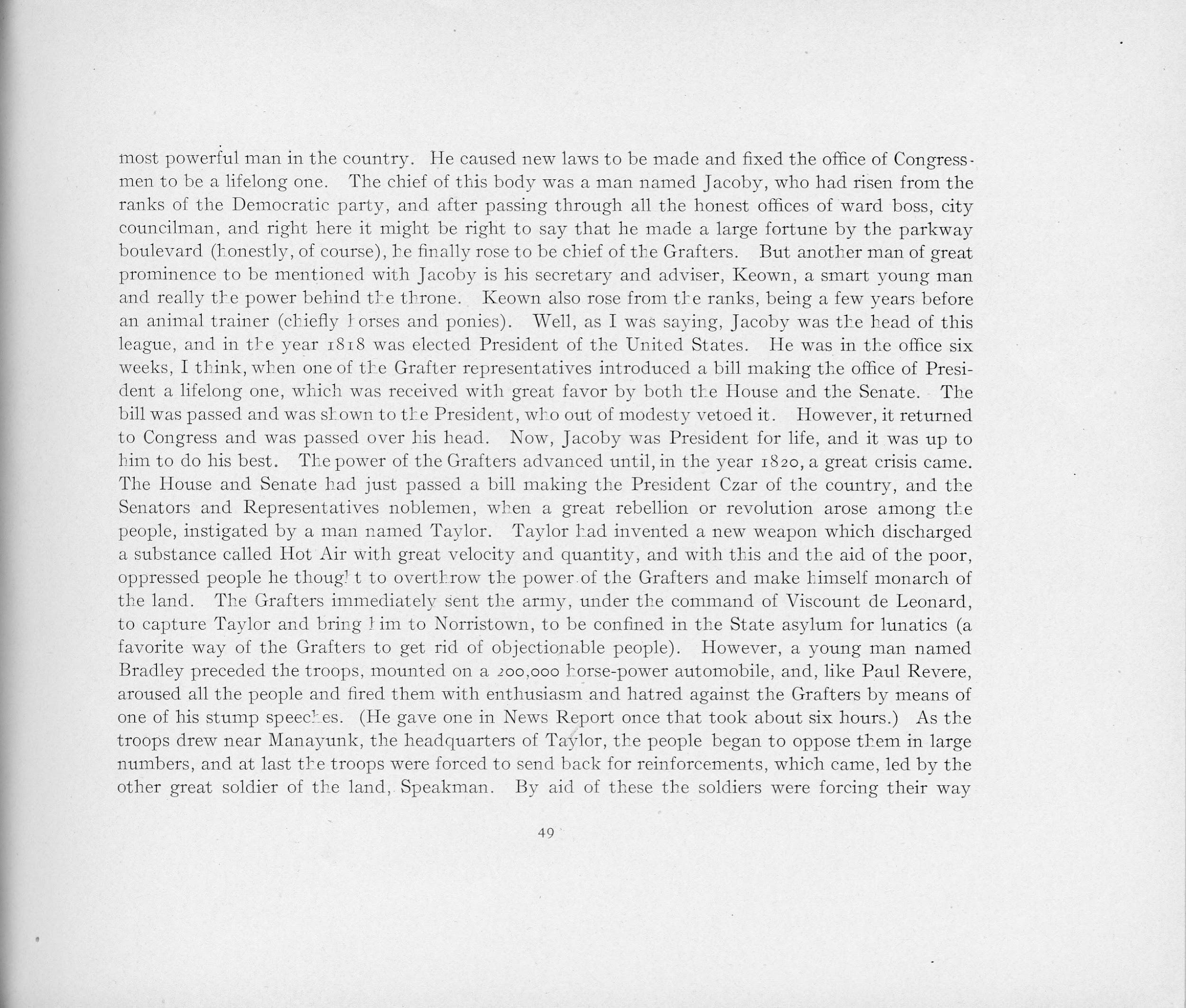
most powerful man in the country. He caused new laws to be made and fixed the office of Congressmen to be a lifelong one. The chief of this body was a man named Jacoby, who had risen from the ranks of the Democratic party, and after passing through all the honest offices of ward boss, city councilman, and right here it might be right to say that he made a large fortune by the parkway boulevard (honestly, of course), Ye finally rose to be chief of the Grafters. But another man of great prominence to be mentioned with Jacoby is his secretary and adviser, Keown, a smart young man and really tl-e power behind tl-e throne. Keown also rose from the ranks, being a few years before an animal trainer (chiefly Yorses and ponies). Well, as I was saying, Jacoby was the head of this league, and in the year 1818 was elected President of the United States. He was in the office six weeks, I think, when one of tre Grafter representatives introduced a bill making the office of President a lifelong one, which was received with great favor by both the House and the Senate. The bill was passed and was sy own to the President, who out of modesty vetoed it. However, it returned to Congress and was passed over his head. Now, Jacoby was President for life, and it was up to bim to do his best. The power of the Grafters advanced until, in the year 1820, a great crisis came. The House and Senate had just passed a bill making the President Czar of the country, and the Senators and Representatives noblemen, when a great rebellion or revolution arose among the people, instigated by a man named Taylor. Taylor had invented a new weapon which discharged a substance called Hot Air with great velocity and quantity, and with this and the aid of the poor, oppressed people he thoug-l t to overthrow the power the Grafters and make I-rimself monarch of the land. The Grafters immediately sent the army, under the command of Viscount de Leonard, to capture Taylor and bring T im to Norristown, to be confined in the State asylum for lunatics (a favorite way of the Grafters to get rid of objectionable people). However, a young man named Bradley preceded the troops, mounted on a 200,000 horse-power automobile, and, like Paul Revere, aroused all the people and fired them with enthusiasm and hatred against the Grafters by means of one of his stump speecYes. (He gave one in News Report once that took about six hours.) As the troops drew near Manayunk, the headquarters of Taylor, the people began to oppose them in large numbers, and at last the troops were forced to send back for reinforcements, which came, led by the other great soldier of the land, Speakman. By aid of these the soldiers were forcing their way
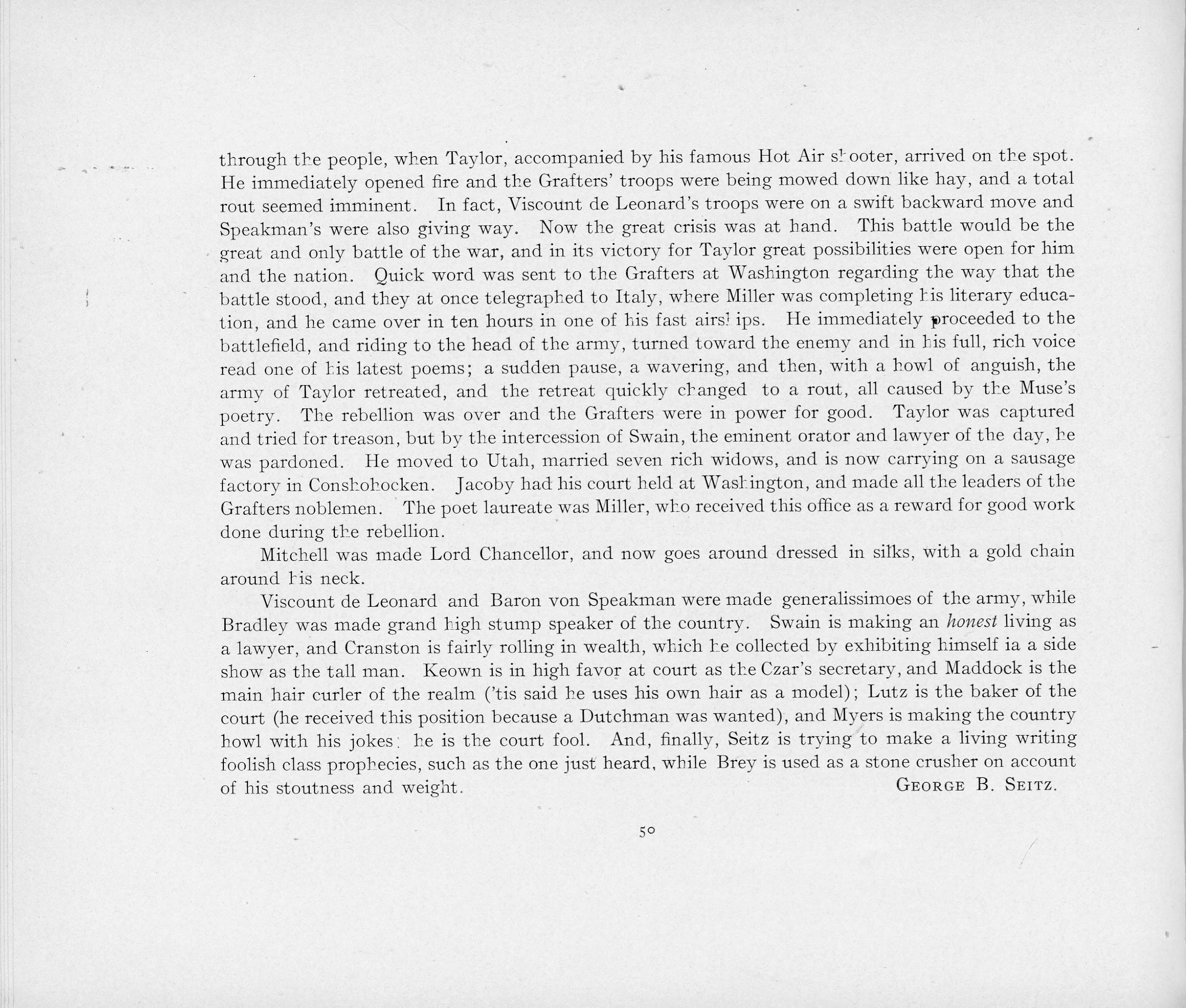
through the people, when Taylor, accompanied by his famous Hot Air s! ooter, arrived on the spot. He immediately opened fire and the Grafters' troops were being mowed down like hay, and a total rout seemed imminent. In fact, Viscount de Leonard's troops were on a swift backward move and Speakman's were also giving way. Now the great crisis was at hand. This battle would be the great and only battle of the war, and in its victory for Taylor great possibilities were open for him and the nation. Quick word was sent to the Grafters at Washington regarding the way that the battle stood, and they at once telegraphed to Italy, where Miller was completing Yis literary education, and he came over in ten hours in one of his fast airs) ips. He immediately proceeded to the battlefield, and riding to the head of the army, turned toward the enemy and in Yis full, rich voice read one of Yis latest poems; a sudden pause, a wavering, and then, with a howl of anguish, the army of Taylor retreated, and the retreat quickly changed to a rout, all caused by the Muse's poetry. The rebellion was over and the Grafters were in power for good. Taylor was captured and tried for treason, but by the intercession of Swain, the eminent orator and lawyer of the day, Ize was pardoned. He moved to Utah, married seven rich widows, and is now carrying on a sausage factory in Conshohocken. Jacoby had his court held at Washington, and made all the leaders of the Grafters noblemen. The poet laureate was Miller, who received this office as a reward for good work done during the rebellion.
Mitchell was made Lord Chancellor, and now goes around dressed in silks, with a gold chain around his neck.
Viscount de Leonard and Baron von Speakman were made generalissimoes of the army, while Bradley was made grand Iligh stump speaker of the country. Swain is making an honest living as a lawyer, and Cranston is fairly rolling in wealth, which collected by exhibiting himself ia a side show as the tall man. Keown is in high favor at court as the Czar's secretary, and Maddock is the main hair curler of the realm ('tis said he uses his own hair as a model) ; Lutz is the baker of the court (he received this position because a Dutchman was wanted), and Myers is making the country howl with his jokes. he is the court fool. And, finally, Seitz is trying to make a living writing foolish class prophecies, such as the one just heard, while Brey is used as a stone crusher on account GEORGE B. SEITZ. of his stoutness and weight.
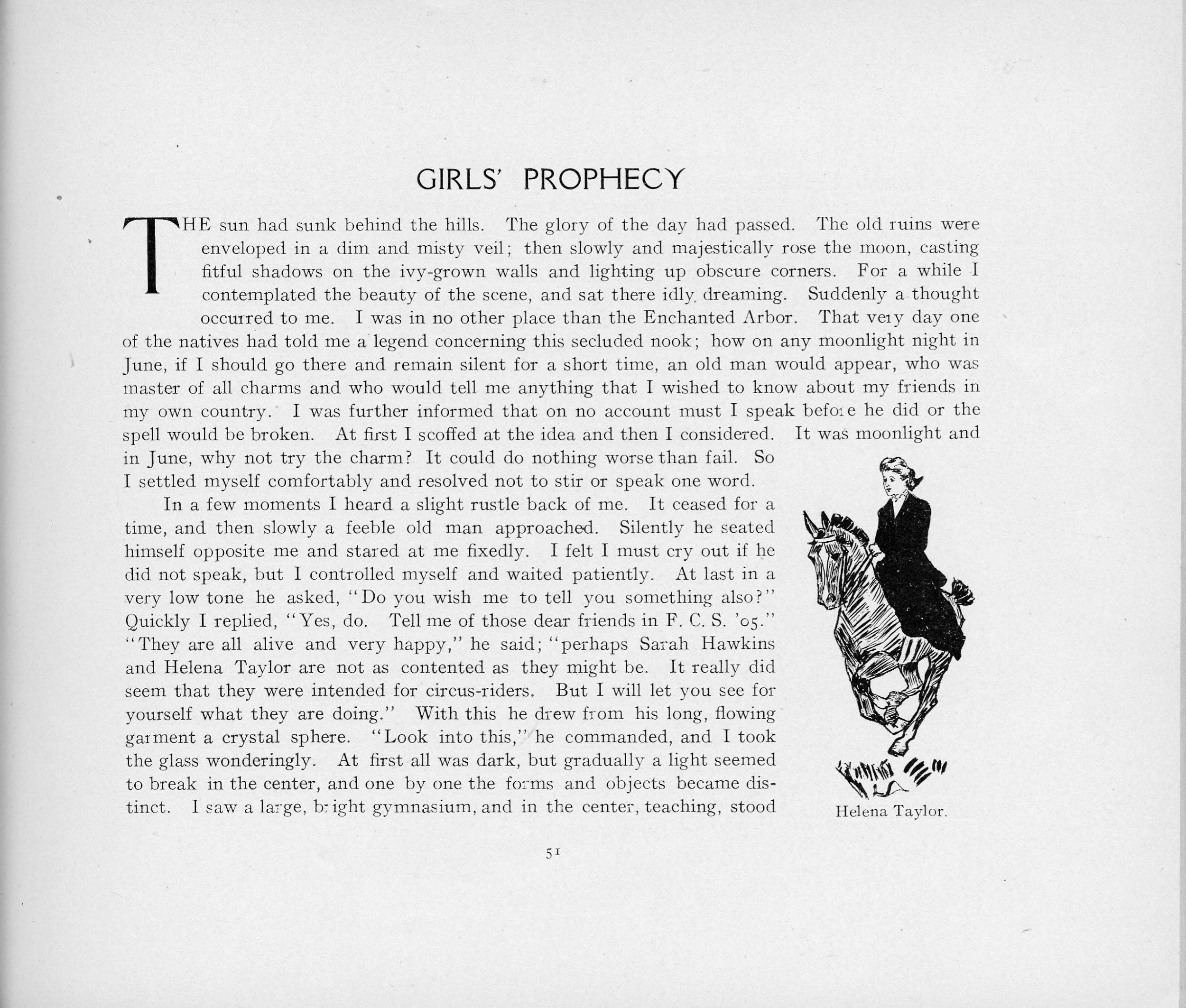
GIRLS' PROPHECY
HE sun had sunk behind the hills. The glory of the day had passed. The old ruins were enveloped in a dim and misty veil; then slowly and majestically rose the moon, casting fitful shadows on the ivy-grown walls and lighting up obscure corners. For a while I contemplated the beauty of the scene, and sat there idly dreaming. Suddenly a thought occurred to me. I was in no other place than the Enchanted Arbor. That velY day one of the natives had told me a legend concerning this secluded nook; how on any moonlight night in June, if I should go there and remain silent for a short time, an old man would appear, who was master of all charms and who would tell me anything that I wished to know about my friends in my own country. I was further informed that on no account must I speak befo:e he did or the spell would be broken. At first I scoffed at the idea and then I considered. It was moonlight and in June, why not try the charm? It could do nothing worse than fail. So I settled myself comfortably and resolved not to stir or speak one word. In a few moments I heard a slight rustle back of me. It ceased for a time, and then slowly a feeble old man approached. Silently he seated himself opposite me and stared at me fixedly. I felt I must cry out if he did not speak, but I controlled myself and waited patiently. At last in a very low tone he asked, " Do you wish me to tell you something also? Quickly I replied, " Yes, do. Tell me of those dear friends in F. C. S. '05." ' They are all alive and very happy," he said; " perhaps Sarah Hawkins and Helena Taylor are not as contented as they might be. It really did seem that they were intended for circus-riders. But I will let you see for yourself what they are doing." With this he drew from his long, flowing garment a crystal sphere. " Look into this," he commanded, and I took the glass wonderingly. At first all was dark, but gradually a light seemed to break in the center, and one by one the forms and objects became dis-
I saw a large, b: ight gymnasium, and in the center, teaching, stood tinct.
Helena Taylor.

Alice Ingram, our old class president. How I do hope those pupils " get their money's worth." It's a pity Alice was so fond of gymnasium work, for what an excellent bookkeeper lost to someone! So quick, so accurate—
But the scene was changing, and instead I saw a large, low residence, with water in the distance. ' That," answered the old man, " What is the meaning of this?" I cried, " and who lives here? "
' is the home of Elva Heritage. She was the first girl in the class to be married, and now she lives in Jamaica, the place, you. know, which she always loved. If you will look carefully, you will see not far away the home of Mary Eynon. Mary married also. Her husband is a rich merchant, and she seems to be very happy in her island home."
Again the scene changed. This time I seemed to see a peaceful convent, nestling in the hills. A nun was coming up the garden path but coming at a most peculiar gait. She looked as if she wanted to
see the corners of her mouth twitching and her dimples going in and out. When she raised her head I gasped in astonishment. It was Mary Harris! Our own dear, original Mary, the author of such expressions as " That's minor" and—no, I believe Milton invented " crazy with the heat," particularly for Paradise Lost. But how could Mary be solemn enough for a black veil? She must be in continual disgrace for laughing out. How many monitors do they need in that convent, Mary?
' Here are the homes of two more school friends," said the old " Both these girls are man as I peered again into the crystal. married, and live in the country quite near each other. The first is the residence of Elva Blakey, who is thoroughly content with a man, Timothy, and Bunny-rabbit. The large farmhouse that you see is where Florence Hancock now lives. She has overcome her aversion to country life and feeds
I don't mean your American breakfast food l" he exclaimed. chickens with a zest.
Mary Harris.
' Now, let us go to New York for a while," he continued; moved there. But look into the mirror and learn for yourself." brilliant one. It was the horse-show at Madison Square Garden, and the throng of fashionably-dressed men and women seemed to be watching one central figure. A second view revealed the fact that it was Sarah Hawkins. She was diiving a magnificent team, and I am sure was quite in her element. As she passed one of the boxes she ' Is that nodded to a very handsome woman seated in it. one of our girls ? " I inquired. " Yes," replied the old man; if you were nearer, you would soon recognize her. It is
a great many of the class have The scene depicted there was a
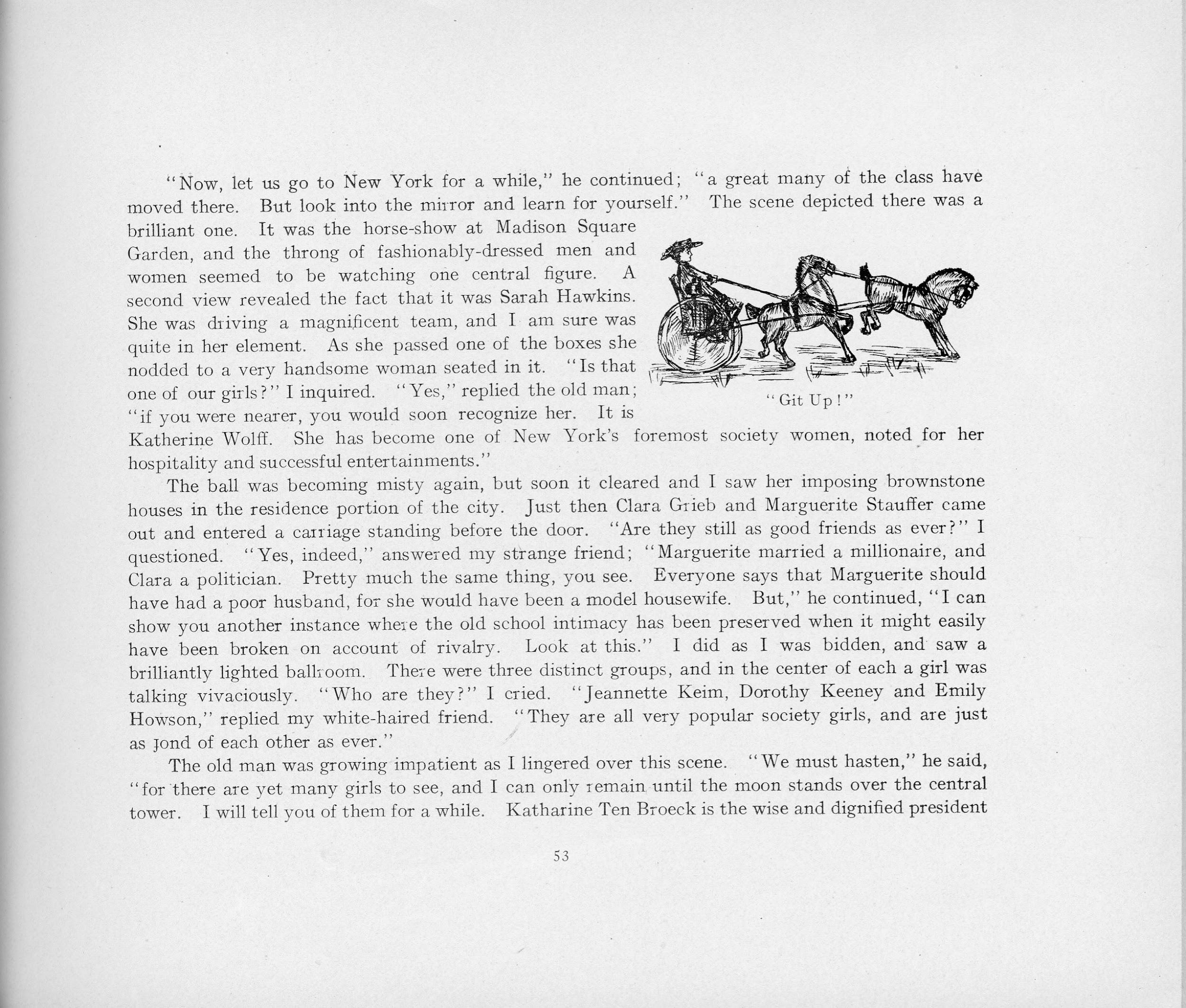
Git Up ! "
Katherine Wolff. She has become one of New York's foremost society women, noted for her hospitality and successful entertainments."
The ball was becoming misty again, but soon it cleared and I saw her imposing brownstone houses in the residence portion of the city. Just then Clara Grieb and Marguerite Stauffer came out and entered a carriage standing before the door. "Are they still as good friends as ever?" I questioned. " Yes, indeed," answered my strange friend; " Marguerite married a millionaire, and Clara a politician. Pretty much the same thing, you see. Everyone says that Marguerite should have had a poor husband, for she would have been a model housewife. But," he continued, "I can show you another instance where the old school intimacy has been preserved when it might easily I did as I was bidden, and saw a have been broken on account of rivalry. Look at this." brilliantly lighted ball-room. The-re were three distinct groups, and in the center of each a girl was
Jeannette Keim, Dorothy Keeney and Emily talking vivaciously. " Who are they?" I cried. Howson," replied my white-haired friend. " They are all very popular society girls, and are just as Jond of each other as ever.'
The old man was growing impatient as I lingered over this scene. "We must hasten," he said, 'for there are yet many girls to see, and I can only remain until the moon stands over the central tower. I will tell you of them for a while. Katharine Ten Broeck is the wise and dignified president
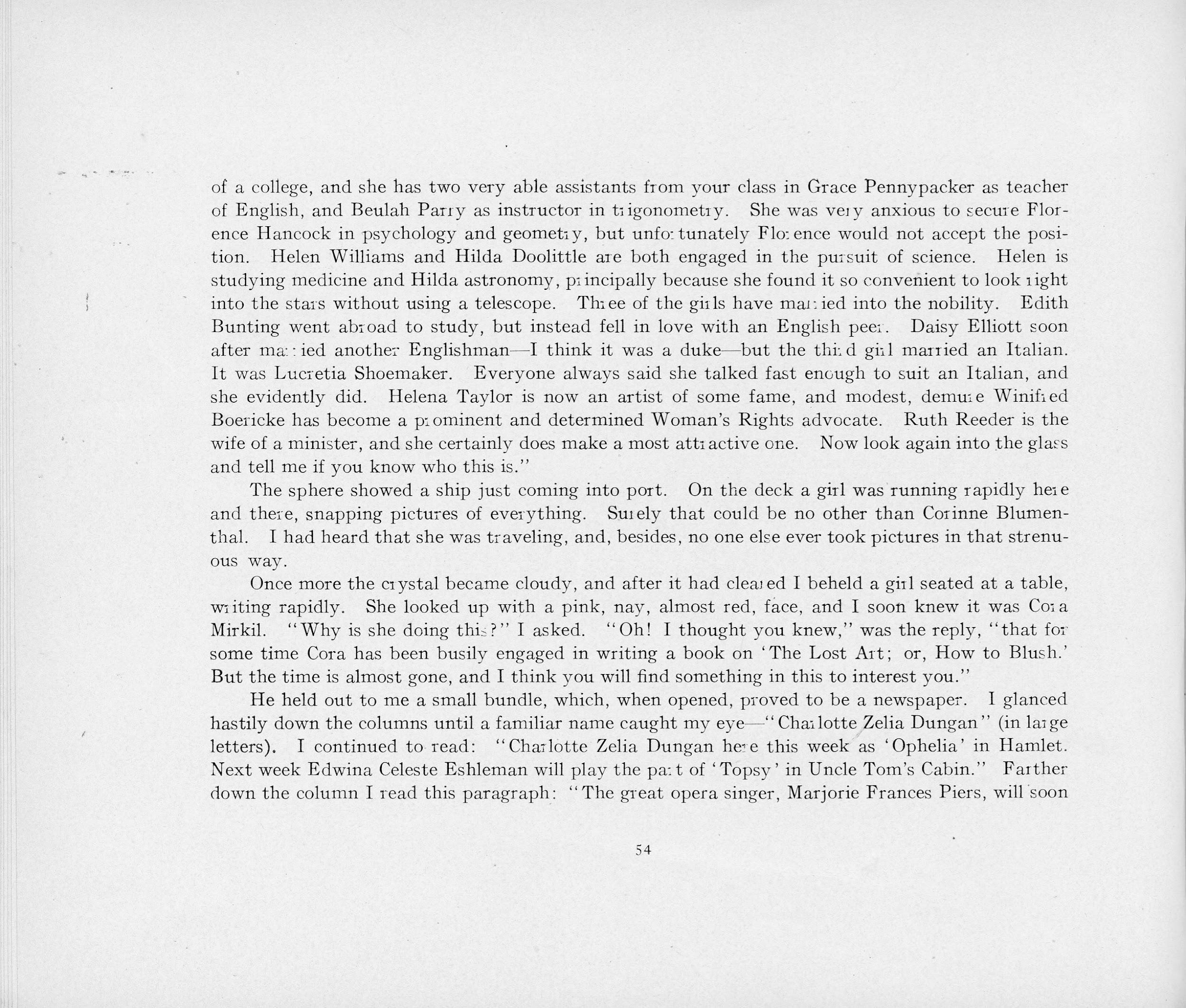
of a college, and she has two very able assistants from your class in Grace Pennypacker as teacher of English, and Beulah Parry as instructor in tigonomet1Y. She was vejy anxious to sectue Florence Hancock in psychology and geometty, but unfo: tunately Flo: ence would not accept the position. Helen Williams and Hilda Doolittle are both engaged in the pursuit of science. Helen is studying medicine and Hilda astronomy, incipally because she found it so convenient to look light into the stars without using a telescope. Thiee of the gills have mar. ied into the nobility. Edith Bunting went abtoad to study, but instead fell in love with an English peelL Daisy Elliott soon after mæ ied another Englishman—I think it was a duke—but the thil d gill married an Italian. It was Lucretia Shoemaker. Everyone always said she talked fast enough to suit an Italian, and she evidently did. Helena Taylor is now an artist of some fame, and modest, demure Winifl ed Boericke has become a p: ominent and determined Woman's Rights advocate. Ruth Reeder is the wife of a minister, and she certainly does make a most atti active one. Now look again into the glass and tell me if you know who this is."
The sphere showed a ship just coming into port. On the deck a girl was running rapidly hele and there, snapping pictures of evevything. Stil ely that could be no other than Corinne BlumenI had heard that she was traveling, and, besides, no one else ever took pictures in that strenu- thal. ous way.
Once more the ctystal became cloudy, and after it had clem ed I beheld a gill seated at a table, wtiting rapidly. She looked up with a pink, nay, almost red, face, and I soon knew it was Cot a Mirkil. "Why is she doing thi> ? " I asked. " Oh! I thought you knew," was the reply, "that fov some time Cora has been busily engaged in writing a book on 'The Lost Ait; or, How to Blush.' But the time is almost gone, and I think you will find something in this to interest you."
I glanced He held out to me a small bundle, which, when opened, proved to be a newspaper. hastily down the columns until a familiar name caught my eye—" Cha-I lotte Zelia Dungan " (in lai ge Cha710tte Zelia Dungan here this week as 'Ophelia' in Hamlet. letters). I continued to read:
Next week Edwina Celeste Eshleman will play the pa-. t of ' Topsy' in Uncle Tom's Cabin." Farther down the column I read this paragraph: " The great opera singer, Marjorie Frances Piers, will •soon
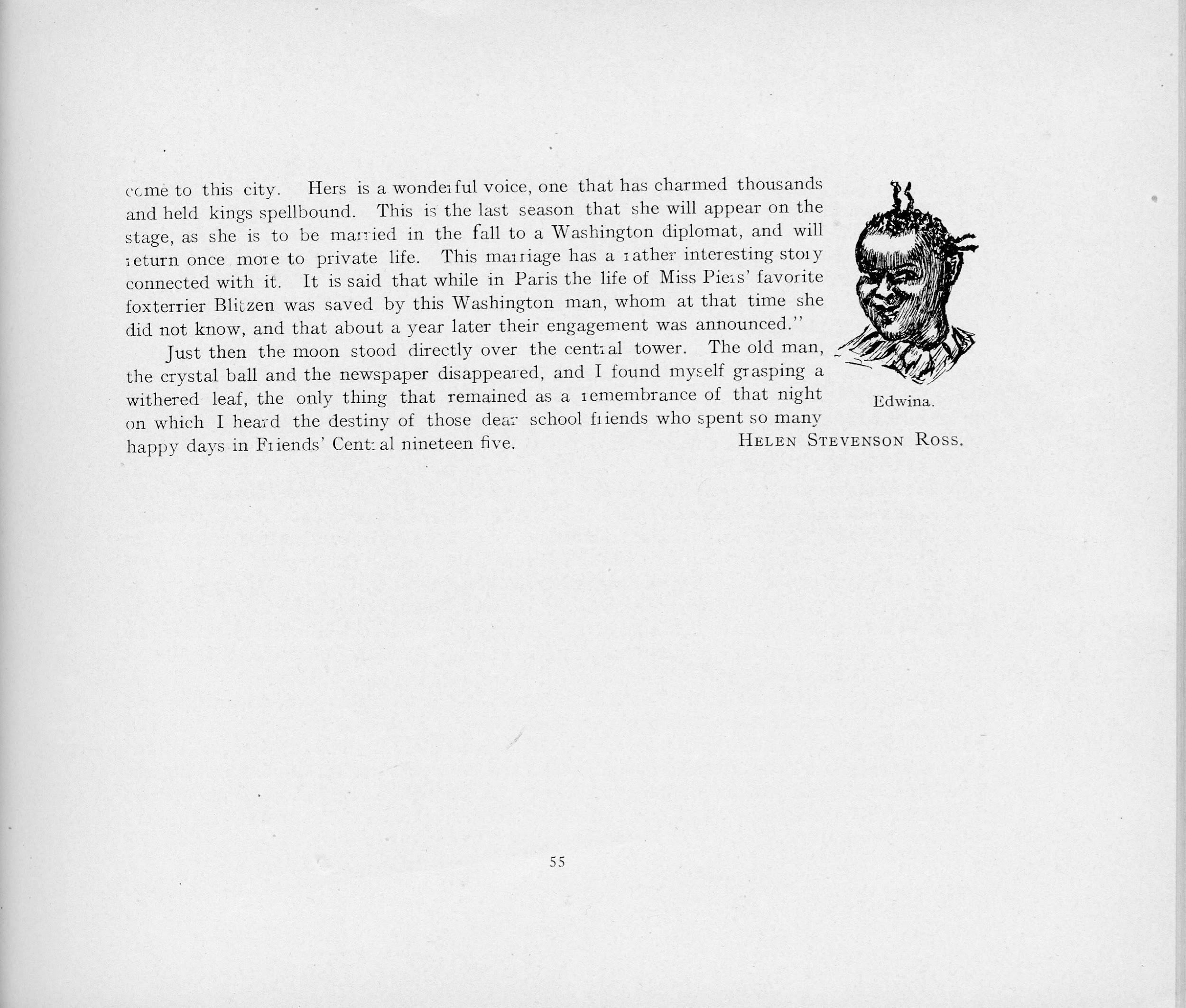
ccme to this city. Hers is a wondet ful voice, one that has charmed thousands and held kings spellbound. This is the last season that she will appear on the stage, as she is to be mar:åed in the fall to a Washington diplomat, and will 1 eturn once mote to private life. This matriage has a I ather interesting story
It is said that while in Paris the life of Miss Pie-as' favorite connected with it.
foxterrier Blitzen was saved by this Washington man, whom at that time she did not know, and that about a year later their engagement was announced."
Just then the moon stood directly over the cent-mal tower. The old man, the crystal ball and the newspaper disappeared, and I found myself grasping a withered leaf, the only thing that remained as a temembrance of that night Edwina. on which I heard the destiny of those dear school fl iends who spent so many happy days in Fl iends' Cent: al nineteen five.
STEVENSON Ross.
IIELEN
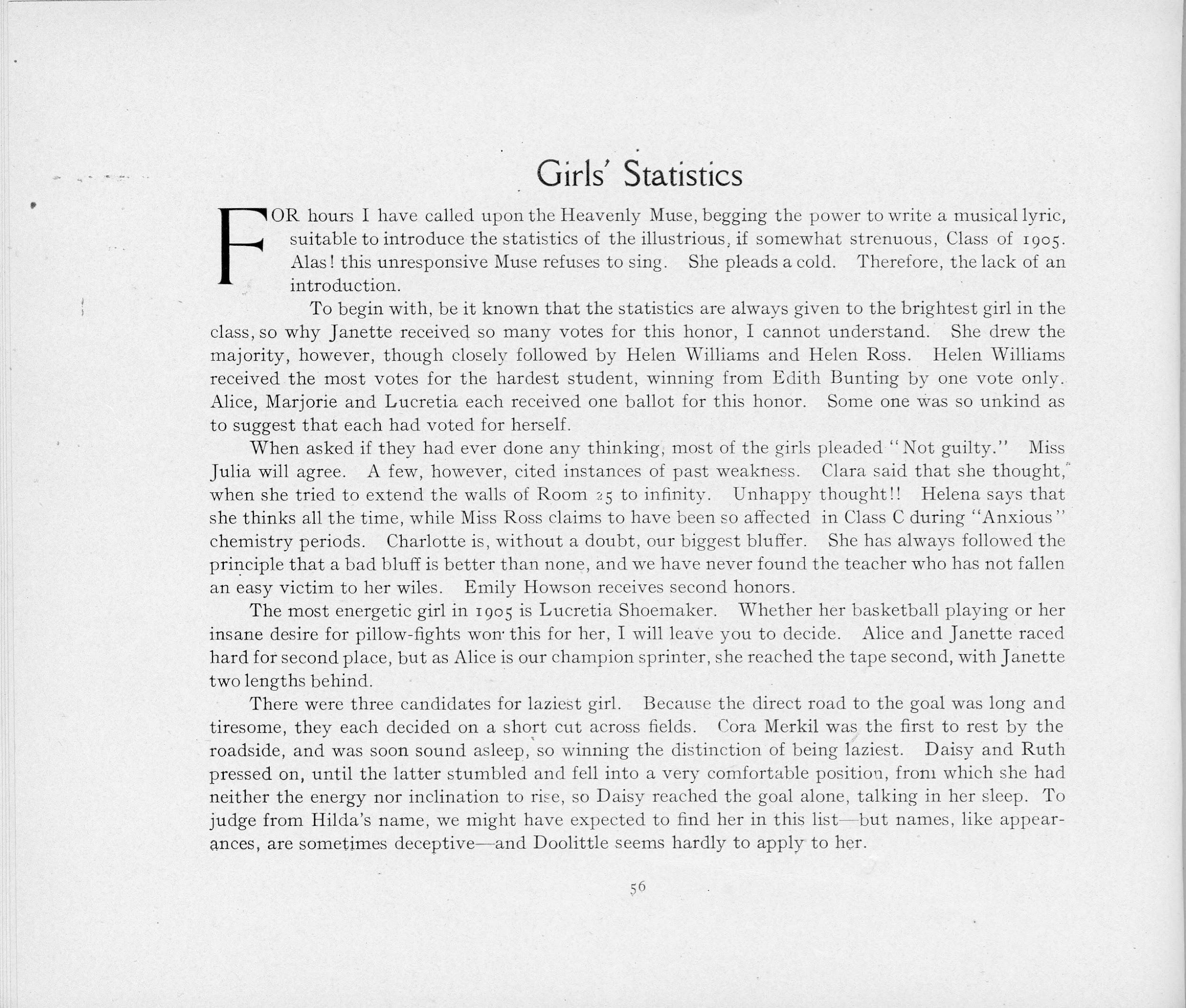
Girls' Statistics
OR hours I have called upon the Heavenly Muse, begging the power to write a musical lyric, suitable to introduce the statistics of the illustrious; if somewhat strenuous, Class of 1905. Alas ! this unresponsive Muse refuses to sing. She pleads a cold. Therefore, the lack of an introduction.
To begin with, be it known that the statistics are always given to the brightest girl in the class, so why Janette received so many votes for this honor, I cannot understand. She drew the majority, however, though closely followed by Helen Williams and Helen Ross. Helen Williams received the most votes for the hardest student, winning from Edith Bunting by one vote only. Alice, Marjorie and Lucretia each received one ballot for this honor. Some one was so unkind as to suggest that each had voted for herself.
When asked if they had ever done any thinking, most of the girls pleaded " Not guilty." Miss Julia will agree. A few, however, cited instances of past weakness. Clara said that she thought: when she tried to extend the walls of Room 25 to infinity. Unhappy thought!! Helena says that she thinks all the time, while Miss Ross claims to have been so affected in Class C during "Anxious chemistry periods. Charlotte is, without a doubt, our biggest bluffer. She has always followed the principle that a bad bluff is better than none, and we have never found the teacher who has not fallen an easy victim to her wiles. Emily Howson receives second honors.
The most energetic girl in 1905 is Lucretia Shoemaker. Whether her basketball playing or her insane desire for pillow-fights won• this for her, I will leave you to decide. Alice and Janette raced hard for second place, but as Alice is our champion sprinter, she reached the tape second, with Janette two lengths behind.
There were three candidates for laziest girl. Because the direct road to the goal was long and tiresome, they each decided on a short cut across fields. Cora Merkil was the first to rest by the roadside, and was soon sound asleep, so winning the distinction of being laziest. Daisy and Ruth pressed on, until the latter stumbled and fell into a very comfortable position, from which she had neither the energy nor inclination to rise, so Daisy reached the goal alone, talking in her sleep. To judge from Hilda's name, we might have expected to find her in this list—but names, like appearances, are sometimes deceptive—and Doolittle seems hardly to apply to her.
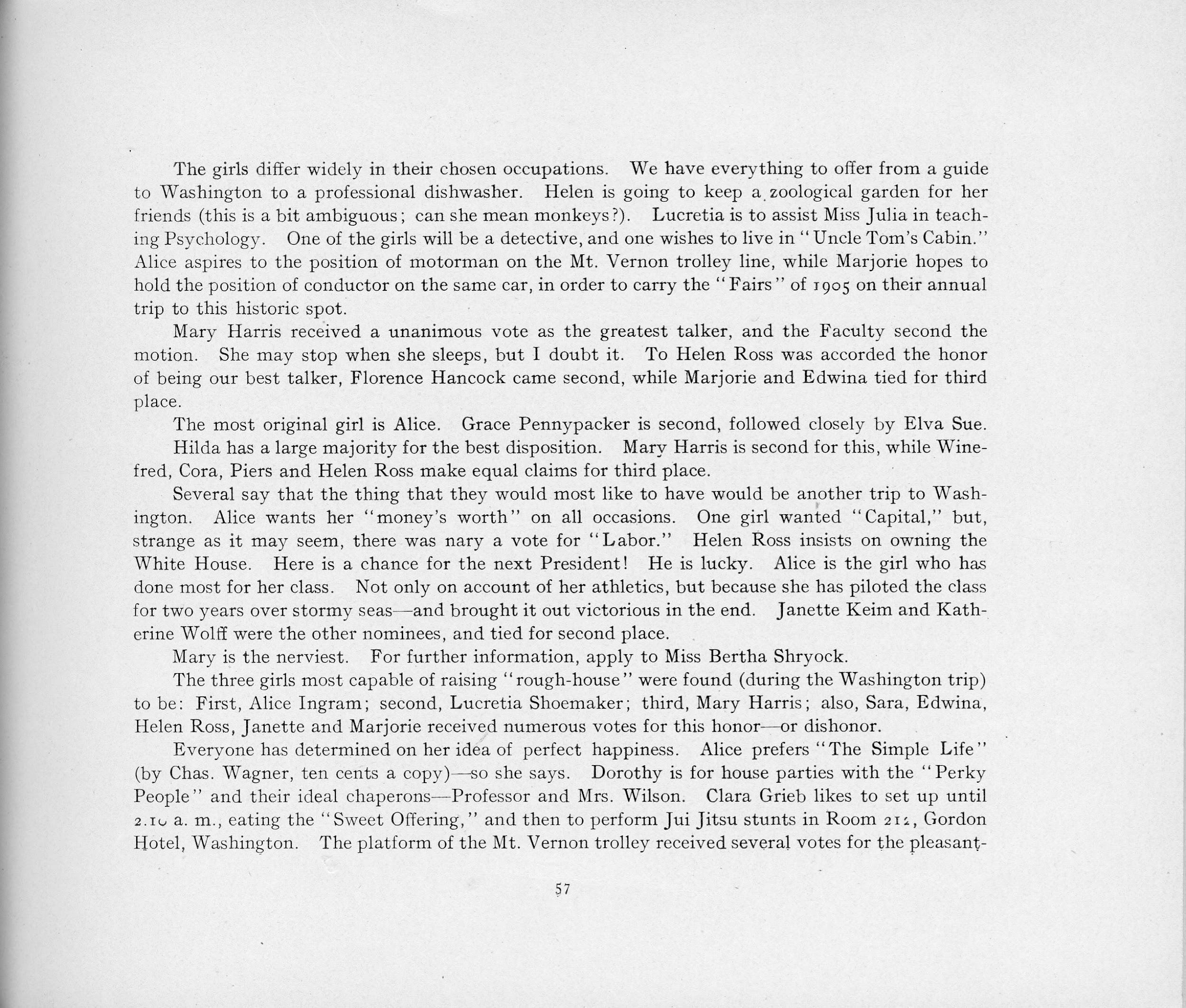
The girls differ widely in their chosen occupations. We have everything to offer from a guide to Washington to a professional dishwasher. Helen is going to keep a. zoological garden for her friends (this is a bit ambiguous; can she mean monkeys ? ). Lucretia is to assist Miss Julia in teaching Psychology. One of the girls will be a detective, and one wishes to live in " Uncle Tom's Cabin.'
Alice aspires to the position of motorman on the Mt. Vernon trolley line, while Marjorie hopes to hold the position of conductor on the same car, in order to carry the " Fairs " of 1905 on their annual trip to this historic spot.
Mary Harris received a unanimous vote as the greatest talker, and the Faculty second the motion. She may stop when she sleeps, but I doubt it. To Helen Ross was accorded the honor of being our best talker, Florence Hancock came second, while Marjorie and Edwina tied for third place.
The most original girl is Alice. Grace Pennypacker is second, followed closely by Elva Sue.
Hilda has a large majority for the best disposition. Mary Harris is second for this, while Winefred, Cora, Piers and Helen Ross make equal claims for third place.
Several say that the thing that they would most like to have would be another trip to Washington. Alice wants her " money's worth " on all occasions. One girl wanted " Capital," but, strange as it may seem, there was nary a vote for " Labor." Helen Ross insists on owning the White House. Here is a chance for the next President! He is lucky. Alice is the girl who has done most for her class. Not only on account of her athletics, but because she has piloted the class for two years over stormy seas—and brought it out victorious in the end. Janette Keim and Katherine Wolff were the other nominees, and tied for second place.
Mary is the nerviest. For further information, apply to Miss Bertha Shryock.
The three girls most capable of raising " rough-house " were found (during the Washington trip) to be: First, Alice Ingram; second, Lucretia Shoemaker; third, Mary Harris; also, Sara, Edwina, Helen Ross, Janette and Marjorie received numerous votes for this honor—or dishonor.
Everyone has determined on her idea of perfect happiness. Alice prefers " The Simple Life (by Chas. Wagner, ten cents a copy)—so she says. Dorothy is for house parties with the " Perky People " and their ideal chaperons—Professor and Mrs. Wilson. Clara Grieb likes to set up until 2.10 a. m. , eating the " Sweet Offering, " and then to perform Jui Jitsu stunts in Room 21 'a, Gordon Hotel, Washington. The platform of the Mt. Vernon trolley received several votes for the pleasant-

est spot on earth, while Katharine considers the back bench in meeting as the " Haven of Bliss. "
One vote appeared for Professor Johnson's chemistry classes.
Janette's idea of misery consists in writing editorials. Poor girl! she has had experience. Edwina thinks the worst unhappiness is " to have no place to lie, no place to sit, no place to stand ; " while Hilda claims that nothing can equal the heart pangs resulting from the trite remark, " Why, Hilda, how you have grown! "
Our most independent girl is Eba Heritage, but Daisy is a close second.
By an almost unanimous vote, Charlotte was selected the most polite, also the most versatile.
Without a doubt, Helen Ross has the nicest manners. Charlotte and Hilda win second place in this, while Katherine Wolff and Marjorie win third.
The replies to the question, " What part of your scholastic course have you most enjoyed? " were quite nearly alike. Most of the girls agreed in preferring either vacation or lunch-time. One liked two o'clock. Alice and Marjorie both said, "All times when I wasn't studying." They certainly must have enjoyed the course! There were two votes for the " gym." and several for Miss Jennie's history classes.
Alice received twenty-one votes for the best athlete; Katherine Wolff is second.
Florence Hancock is the most stylish ,girl in the class, according to our taste. Corinne Blumenthal is a close follower, and Lucretia Shoemaker is not far behind.
Helen Ross is the most stunning by an almost unanimous vote. (It would be stunning if she hit you, too.)
The most graceful girl is Charlotte Dungan; Alice is the next, and Daisy dances into third place.
Marjorie is supposed to have the sweetest voice; second, Hilda; third, Daisy.
Cora Merkil is the prettiest girl in the class ; the number of votes which she received proves that there is no doubt about that fact in the minds of the girls. Helen Ross won second place by her dimples, and Florence came in third.
The greatest achievement of Buelah's scholastic course was skipping eight weeks of it. Janette's was obtaining one dollar from the Old Pupils' Association. Sara delights in her first fire drill. So do we. Mary thinks she excelled in inventing excuses for her numerous latenesses. One nineteenfiver delights in having built Cæsar's bridge across the Rhine; while Alice takes great credit to herself for having survived the lunch stores' articles of food.

Grace Pennypacker and Clara Grieb have for years been accusing each other of being the thinnest girl in the class. They finally consented to suspend hostilities until the class statistics were taken. That was to be the proof. The final decision of the girls was thirteen to thirteen. More war! Hilda received five votes.
Edith Bunting is the stoutest girl; Eba Heritage the shortest; Helen Ross, our class baby, the tallest.
Katharine Ten Broeck wears the broadest smile, positively warranted not to " come off."
Alice has the prettiest eyes; Helen Ross's are chosen second; Katherine Wolff's, third.
Sara Hawkins has prettiest hair; Katharine's comes next to this; and Helen, Florence and Marjorie hold third place.
The rnost argumentative is Janette. Just ask the teachers. Ruth Reeder is strong for this, too, and Katharine Ten Broeck and Edwina tie for third place.
By an almost unanimous vote, Miss Thomas was chosen as our favorite teacher; Miss Bertha is second; Miss Jennie Cornell also claims our affection to no little extent.
The question, " What do you think of the Faculty?" brought forth an overwhelming amount of answers—most of which, however, would hardly look well in print. Grace claims, "It were easier to teach thirty what were good to be done than to be one of the thirty to follow mine own teachings." One girl applies the old maxim, " Léast said, the soonest mended." Hilda quotes, Forsooth, I know not why they are so sad." One answer almost took our breath away—two little right." Perhaps you will be relieved to know that this maid already acknowledges Norristown as her headquarters.
As to our honor girls: Alice has first honor; Katherine Wolff is bowl girl, and Edwina receives the plate.
Of course, we are all glad to be in 1905 and, of course, we all have a good reason, too. Mary once remarked, " The more you see of them, the better you like them," and to this we all agree. Through thick and thin we have hung together. May we continue to do so! Daisy it was who finally voiced our sentiments, "We are all glad to be in 1905," she said, " because it is THE class of
MARJORIE F. PIERS.
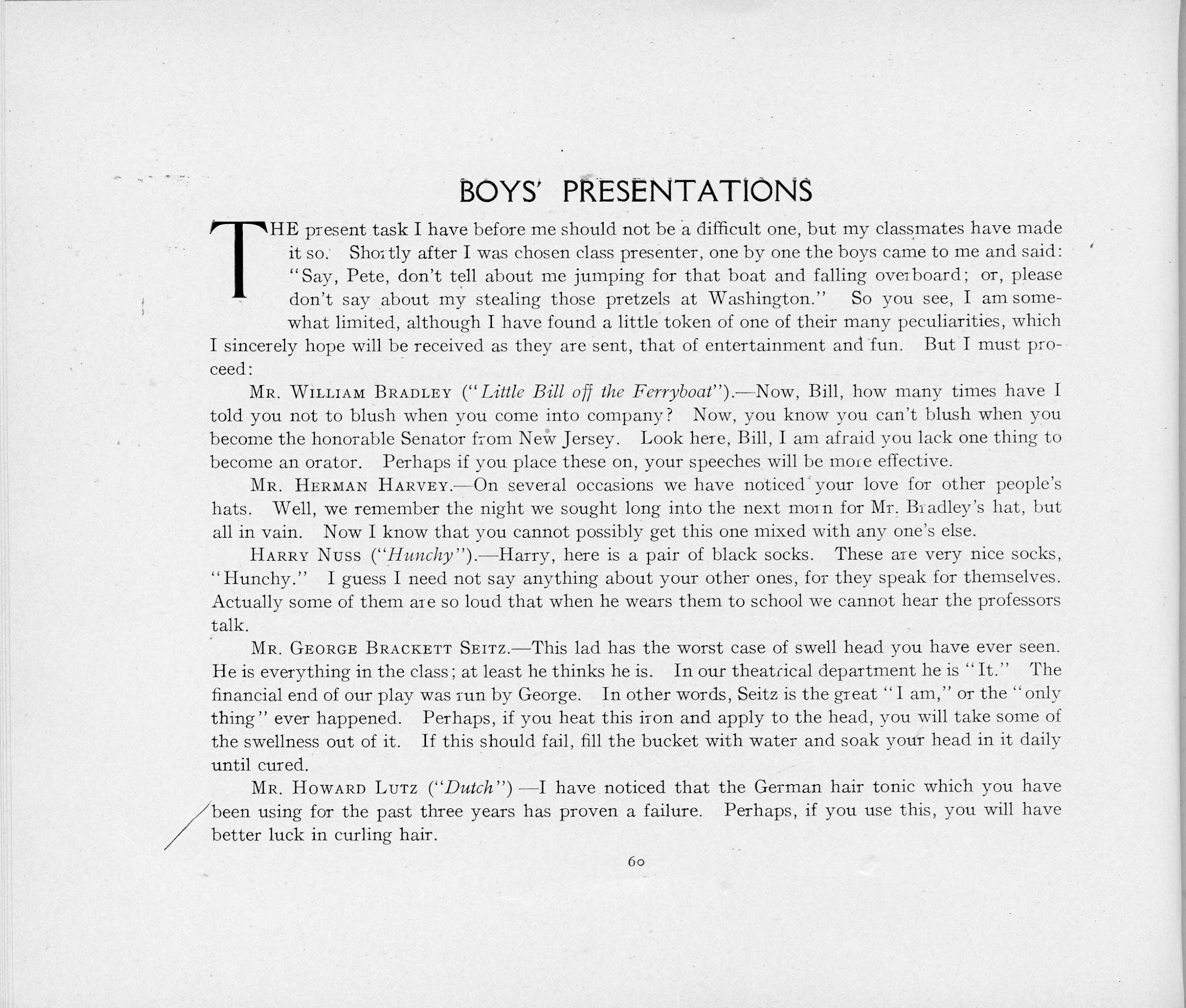
BOYS' PRESENTATIONS
HE present task I have before me should not be a difficult one, but my classmates have made it so. Sh07t1y after I was chosen class presenter, one by one the boys came to me and said: Say, Pete, don't tell about me jumping for that boat and falling oveTboard; or, please So you see, I am some- don't say about my stealing those pretzels at Washington." what limited, although I have found a little token of one of their many peculiarities, which I sincerely hope will be received as they are sent, that of entertainment and fun. But I must proceed :
MR. WILLIAM BRADLEY ('c Little Bill 0/5 the Ferryboat").—Now, Bill, how many times have I told you not to blush when you come into company? Now, you know you can't blush when you become the honorable Senator from New Jersey. Look here, Bill, I am afraid you lack one thing to become an orator. Perhaps if you place these on, your speeches will be more effective.
MR. HERMAN HARVEY.—On several occasions we have noticed your love for other people's hats. Well, we remember the night we sought long into the next morn for Mr. Bradley's hat, but all in vain. Now I know that you cannot possibly get this one mixed with any one's else.
HARRY Nuss here is a pair of black socks. These are very nice socks, I guess I need not say anything about your other ones, for they speak for themselves. Hunchy. "
Actually some of them ate so loud that when he wears them to school we cannot hear the professors talk.
MR. GEORGE BRACKETT SEITz.—This lad has the worst case of swell head you have ever seen. He is everything in the class; at least he thinks he is. In our theatrical department he is " It." The financial end of our play was Ttln by George. In other words, Seitz is the great "I am," or the " only thing " ever happened. Perhaps, if you heat this iron and apply to the head, you will take some of If this should fail, fill the bucket with water and soak your head in it daily the swellness out of it. until cured.
I have noticed that the German hair tonic which you have
MR. HOWARD LUTZ ("Dutch ") been using for the past three years has proven a failure. Perhaps, if you use this, you will have better luck in curling hair.

MR. HORACE EVANS (" The Baby") .—Horace, I am very sorry, but I cannot help thinking that you will remain all your life a farmer or, in other words, a hayseed. Now, since you are still a baby, you must take these " toy " implements and do as babies do; but when you become a man, throw away these baby tools, and come to me, and I will give you some implements more suitable for a real, genuine " Hecker."
ALEX. SWAIN.—I wish to thank you for being so perfectly quiet during your school days here, for in doing so you have given Taylor a chance to answer questions and Seitz a chance to ask others. Now, here, and please make a little noise for us to-day. (Dium.)
MR. HENRY MADDOCK ("Chicken comes the cute, little, curly-haired boy. Isn't he cute? he's only six. You have caused me the most trouble of them all. The only peculiarity which you possess is, your smoking habit, for which you may take this.
MR. NORMAN SPEAKMAN.—NOW, isn't he the funniest lad you ever saw? His shoes are not shined, his face not washed, his hair not—by the way, didn't I tell you not to come here to-day without having your hair cut? Now, here you go, and get it cut at once.
MR. EDWIN SHOEMAKER Sport").—Shoemaker is a regular ladies' man. He has a great love for sending souvenir postal cards. Here is a bunch which you may send to your friends.
MR. JOHN F. JACOBY ("Beej Trust").—Honorable Philamadelphians and Camdenites, before you stands the greatest " athlete " that Friends' Central has ever seen. He does not engage in merely one game, but for the last ten years he has played on every basketball, football and baseball team the school has had, in commemoration of which, Jack, allow me to present you this. (School pennant.)
MR. ARTHUR LEONARD ("Sir Isaac of Lansdowne").—The village from where this lad comes is noted for its slowness. However, the " Jew " is not slow. You will all agree with me here, if you ever see him eat or go up in the air with that forty-foot vaulting-pole which he uses as a toothpick. I know this will be the hardest thing you ever did, Now, here, take this, and please don't eat it. but use it as a vaulting-pole instead of that other one.
MR. NEWTON BREY (Our Class Treasurer).—Newt, in the future, whenever I think of you, I shall hear you saying, " Got your class dues? No! Well, hurry up and get 'em." I believe you would make a good street-car collector, but you are not tall enough to ring the bell; so take this, and I am •sitre you can wring it. (Towel.) 61
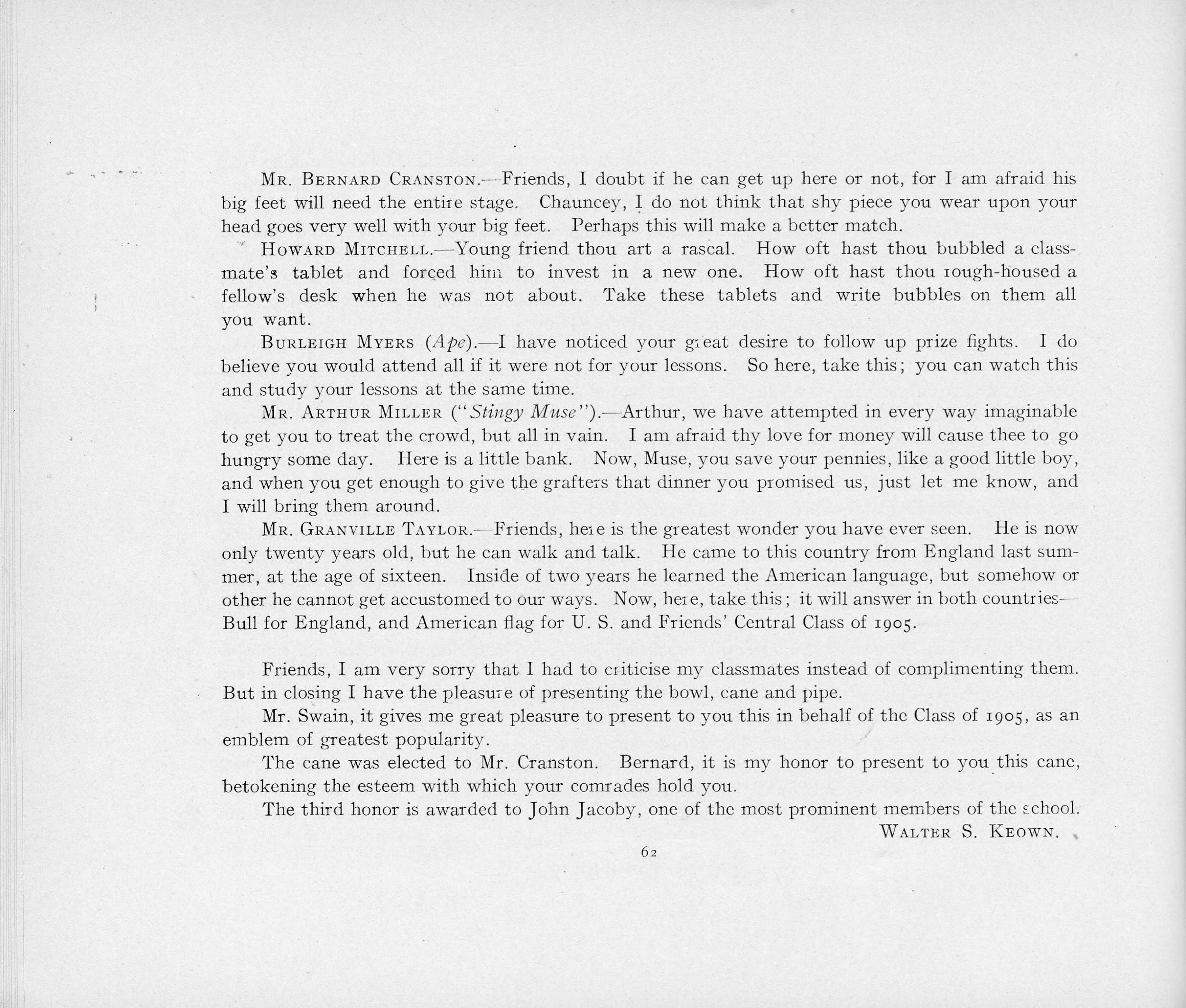
MR. BERNARD CRANsTON.—Friends, I doubt if he can get up here or not, for I am afraid his big feet will need the entire stage. Chauncey, do not think that shy piece you wear upon your head goes very well with your big feet. Perhaps this will make a better match.
HOWARD MITCHELL.—YOUng friend thou art a rascal. How oft hast thou bubbled a classmate's tablet and forced hilli to invest in a new one. How oft hast thou rough-housed a fellow's desk when he was not about. Take these tablets and write bubbles on them all you want.
I have noticed your g-a eat desire to follow up prize fights. 1 do
BURLEIGH MYERS (Ape). believe you would attend all if it were not for your lessons. So here, take this; you can watch this and study your lessons at the same time.
MR. ARTHUR MILLER (" Stingy Muse").—Arthur, we have attempted in every way imaginable to get you to treat the crowd, but all in vain. I am afraid thy love for money will cause thee to go hungry some day. Here is a little bank. Now, Muse, you save your pennies, like a good little boy, and when you get enough to give the grafters that dinner you promised us, just let me know, and I will bring them around.
MR. GRANVILLE TAYL0R.—Friends, he-xe is the greatest wonder you have ever seen. He is now only twenty years old, but he can walk and talk. He came to this country from England last summer, at the age of sixteen. Inside of two years he learned the American language, but somehow or other he cannot get accustomed to our ways. Now, hele, take this; it will answer in both countries Bull for England, and American flag for U. S. and Friends' Central Class of 1905.
Friends, I am very sorry that I had to criticise my classmates instead of complimenting them. But in closing I have the pleasure of presenting the bowl, cane and pipe.
Mr. Swain, it gives me great pleasure to present to you this in behalf of the Class of 1905, as an emblem of greatest popularity.
The cane was elected to Mr. Cranston. Bernard, it is my honor to present to you this cane, betokening the esteem with which your comrades hold you.
The third honor is awarded to John Jacoby, one of the most prominent members of the school. WALTER S. KEOWN.
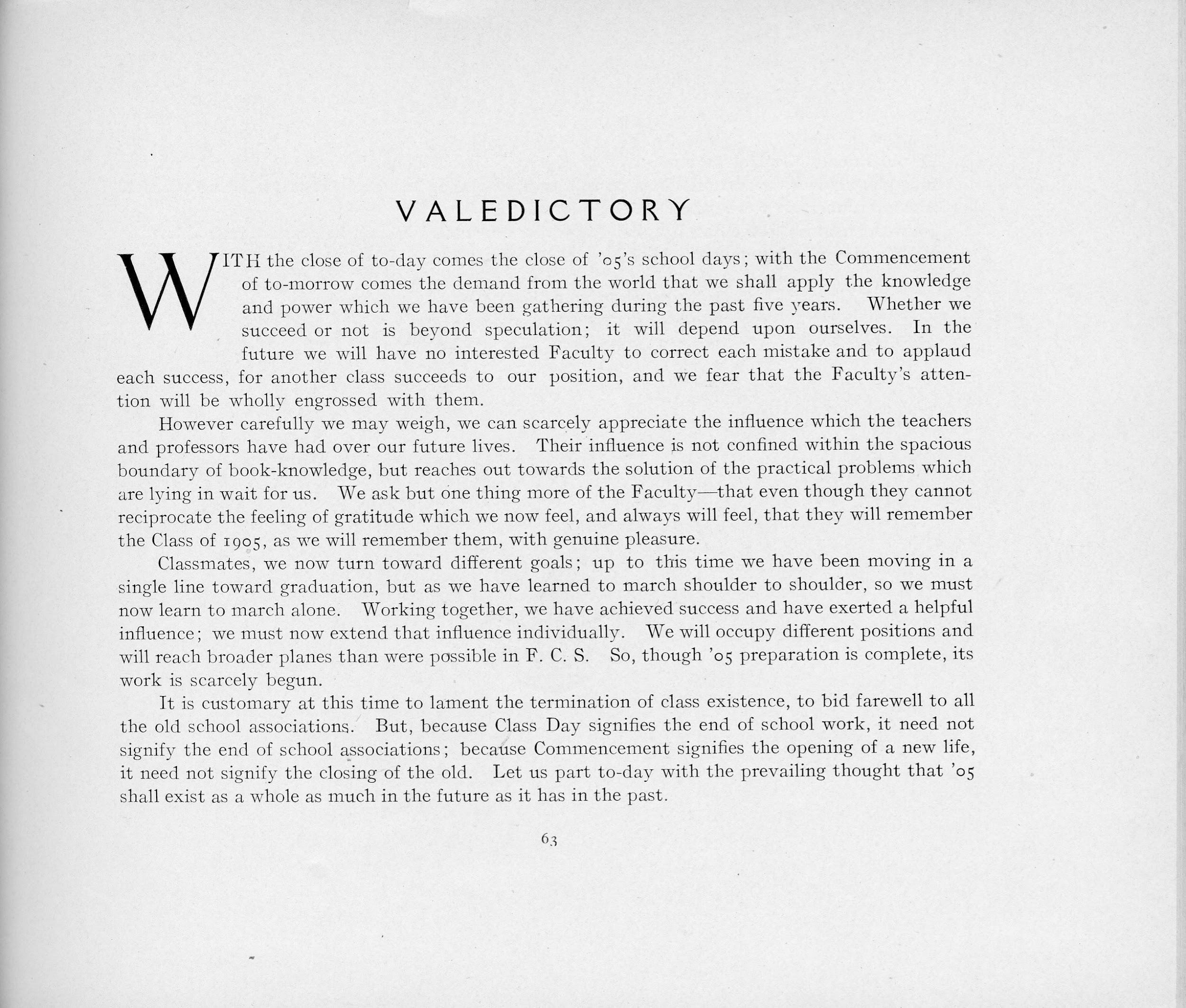
VALEDICTORY
ITH the close of to-day comes the close of '05 's school days ; with the Commencement of to-morrow comes the demand from the world that we shall apply the knowledge and power which we have been gathering during the past five years. Whether we succeed or not is beyond speculation; it will depend upon ourselves. In the future we will have no interested Faculty to correct each mistake and to applaud each success, for another class succeeds to our position, and we fear that the Faculty's attention will be wholly engrossed with them.
However carefully we may weigh, we can scarcely appreciate the influence which the teachers and professors have had over our future lives. Their influence is not confined within the spacious boundary of book-knowledge, but reaches out towards the solution of the practical problems which are lying in wait for us. We ask but one thing more of the Faculty—that even though they cannot reciprocate the feeling of gratitude which we now feel, and always will feel, that they will remember the Class of 1905, as we will remember them, with genuine pleasure.
Classmates, we now turn toward different goals; up to this time we have been moving in a single line toward graduation, but as we have learned to march shoulder to shoulder, so we must now learn to march alone. Working together, we have achieved success and have exerted a helpful influence; we must now extend that influence individually. We will occupy different positions and will reach broader planes than were possible in F. C. S. So, though '05 preparation is complete, its work is scarcely begun.
Tt is customary at this time to lament the termination of class existence, to bid farewell to all the old school associations. But, because Class Day signifies the end of school work, it need not signify the end of school associations; becaQ1se Commencement signifies the opening of a new life, it need not signify the closing of the old. Let us part to-day with the prevailing thought that '05 shall exist as a whole as much in the future as it has in the past.
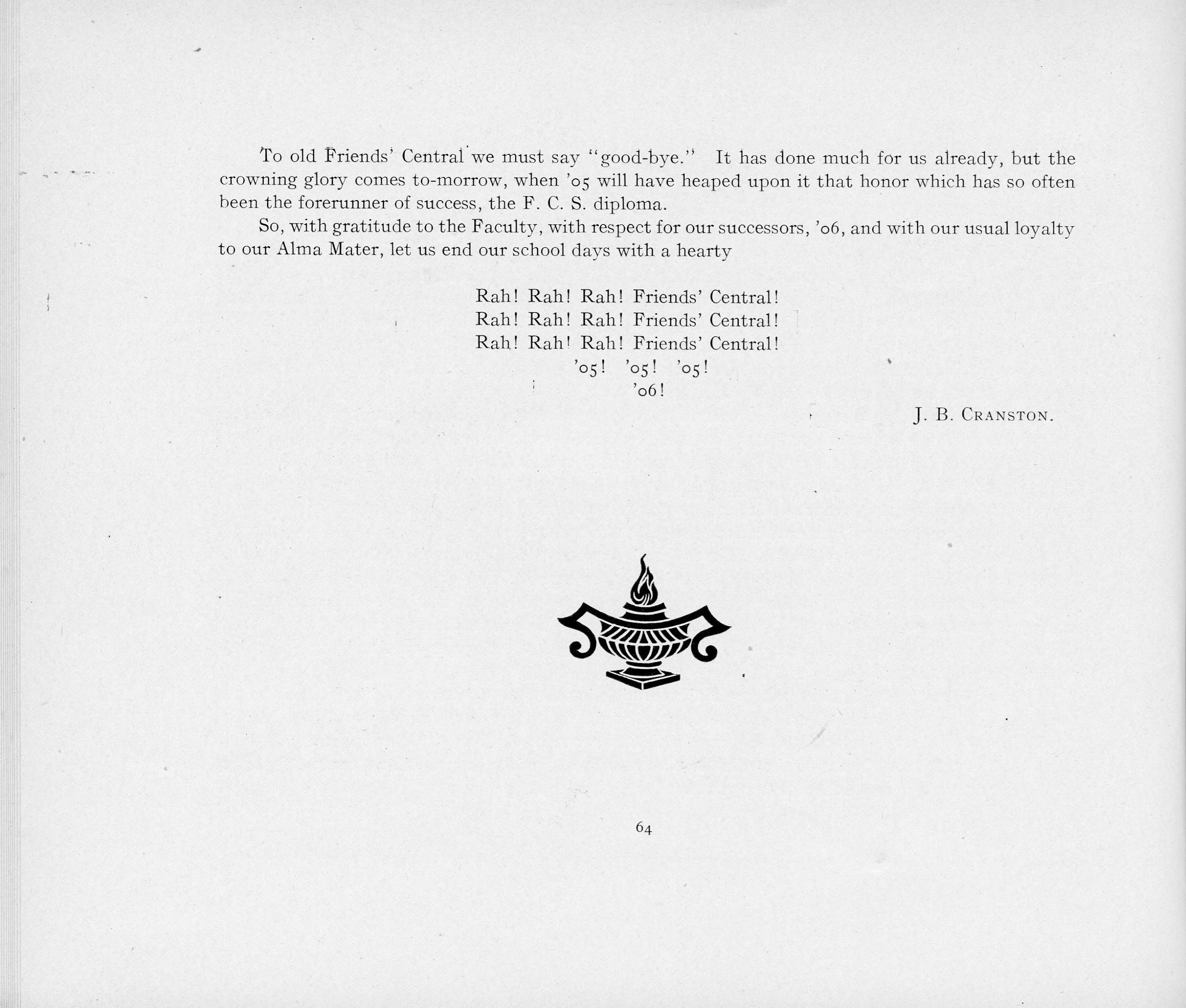
To old Friends' Central •we must say c' good-bye." It has done much for us already, but the crowning glory comes to-morrow, when '05 will have heaped upon it that honor which has so often been the forerunner of SUCCess, the F. C. S. diploma.
So, with gratitude to the Faculty, with respect for our successors, '06, and with our usual loyalty to ottr Alma Mater, let us end our school days with a hearty
Rah! Rah! Rah! Friends' Central! Rah! Rah! Rah! Friends' Central ! Rah! Rahi Rah! Friends' Central!
'05! '05!
'06 !
J. B. CRANSTON.
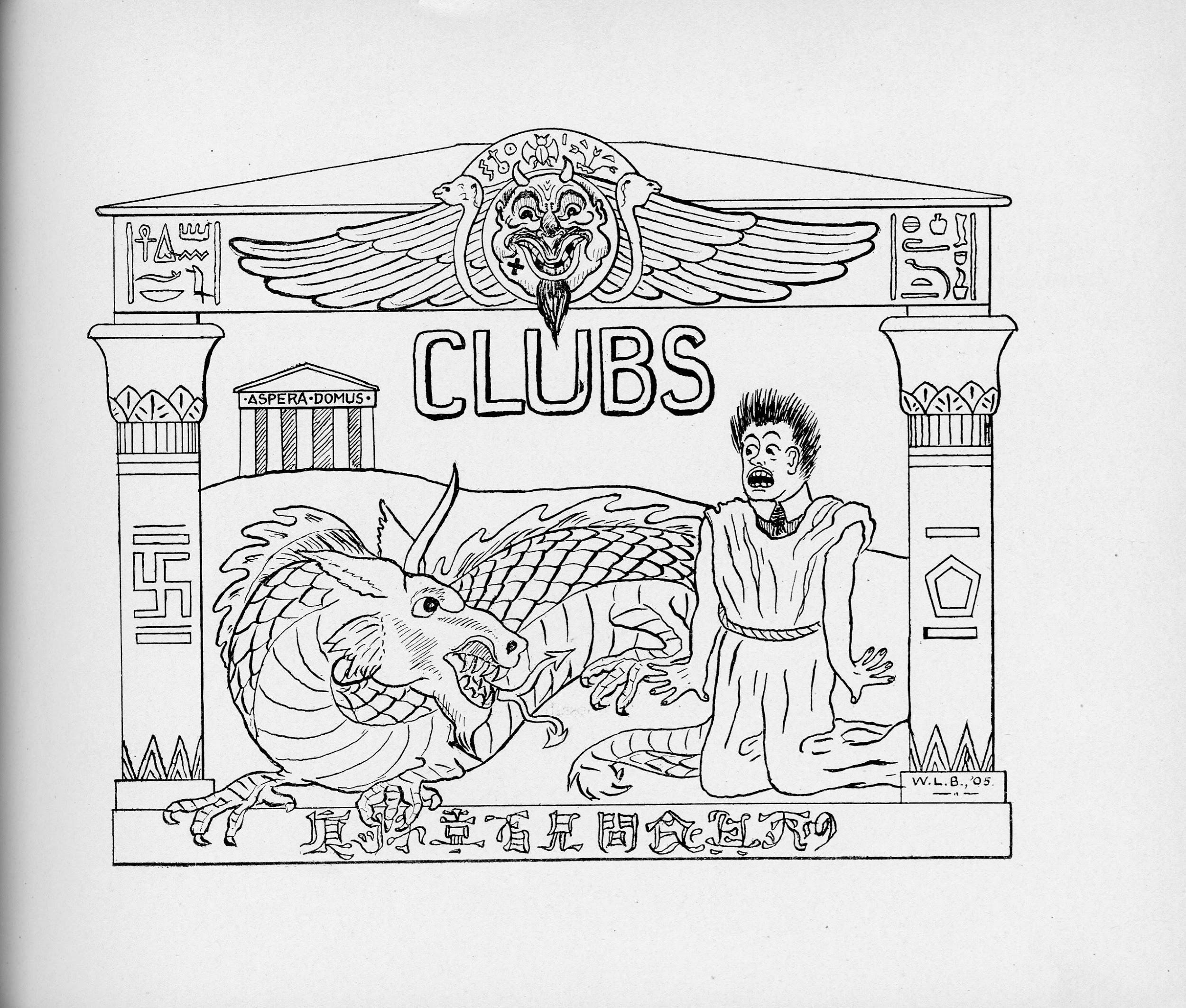
CLUBS
GRAFTERS' CLUB

OBJECT.— world).
To obtain whatever we wish for (incidentally, to run the class. the nation, and the
Alexander Swain, J. Howard Mitchell, Arthur C. Leonard, OFFICERS.
Grand High Muckey Muck, John Jacoby.
Grand Highgrubtender, Henry Maddock.
MEMBERS.
Geo. Brackett Seitz, Norman Speakman, J. Bernard Cranston. Walter S. Keown
MOTTO.—" Get what you wish, lawfully if possible, but get it. "
JUI JITSU CLUB
OBJECT.—TO foster the art of Jui Jitsu, in order that brute strength may be overcome by science.
W. Bradley, Jr., R. Newton Brev,
H. Harvey, Burleigh Myers, MEMBERS.
" Gently, gently, little one." MOTTO.

Horace Evans, Arthur Miller, Howard Lutz, Granville Taylor.
THE STAGERS
'MY LORD IN LIVERY.'
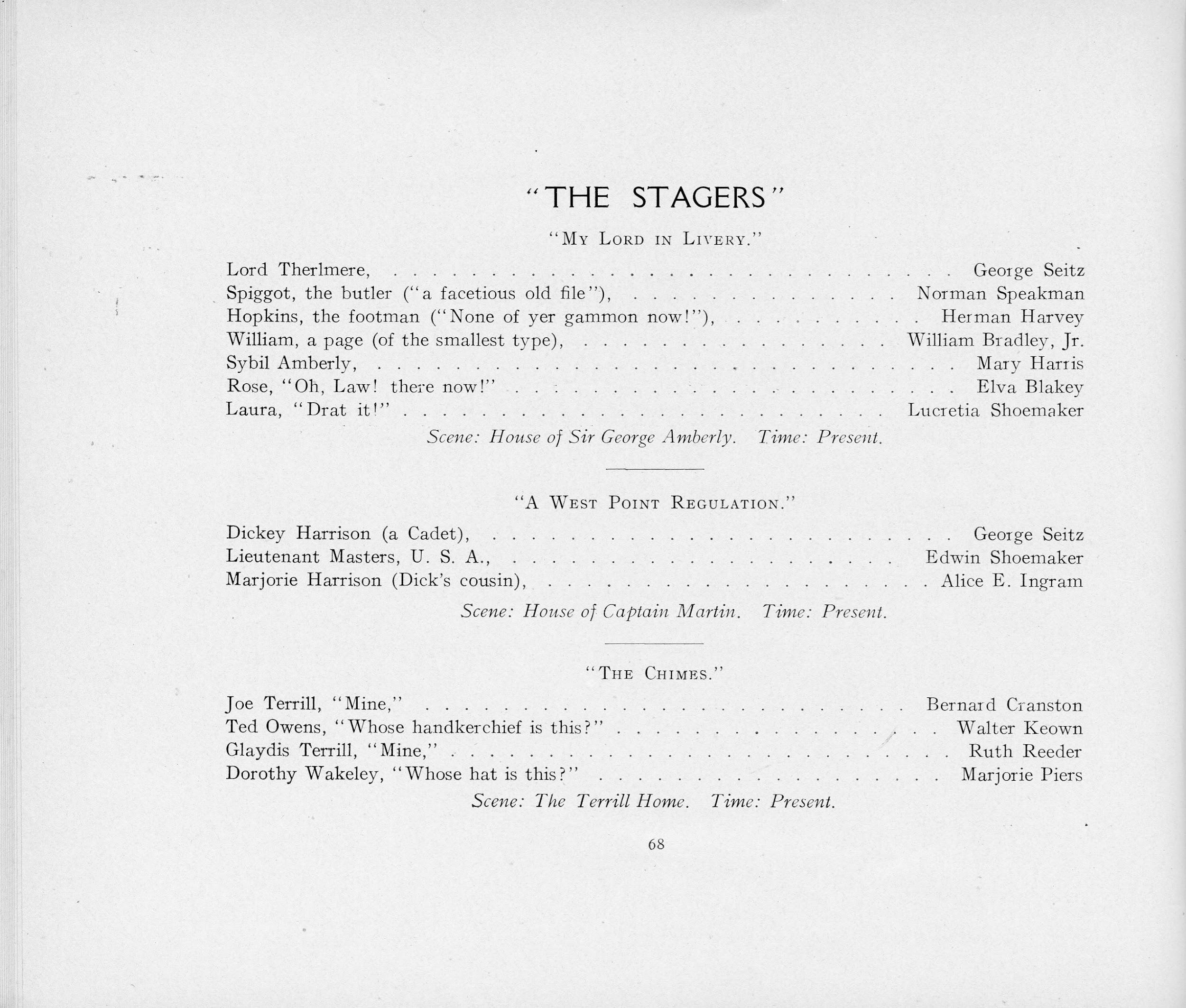
Lord Therlmere,
Spiggot, the butler ("a facetious old file "), Hopkins, the footman None of yer gammon now!"), William, a page (of the smallest type),
Sybil Amberly, Rose, "Oh, Law! there now!"
Laura, " Drat it t"
Scene: House Oj Sir George A mberly. Time:
Present.
George Seitz
Norman Speakman
Herman Harvey
William Bradley, Jr.
Mary Harris
Elva Blakey
Lucretia Shoemaker
"A
WEST POINT REGULATION."
Dickey Harrison (a Cadet), Lieutenant Masters, U. S. A. ,
Marjorie Harrison (Dick's cousin),
Scene: House of Captain Martin.
THE CHIMES.' Time :
Joe Terrill, "Mine," Ted Owens, " Whose handkerchief is this ? "
Glaydis Terrill, " Mine," Dorothy Wakeley, "Whose hat is this ? "
Scene: The Terrill Home.
George Seitz
Edwin Shoemaker
Alice E. Ingram
Present.
Bernard Cranston
Walter Keown
Ruth Reeder
Marjorie Piers
Time: Present.
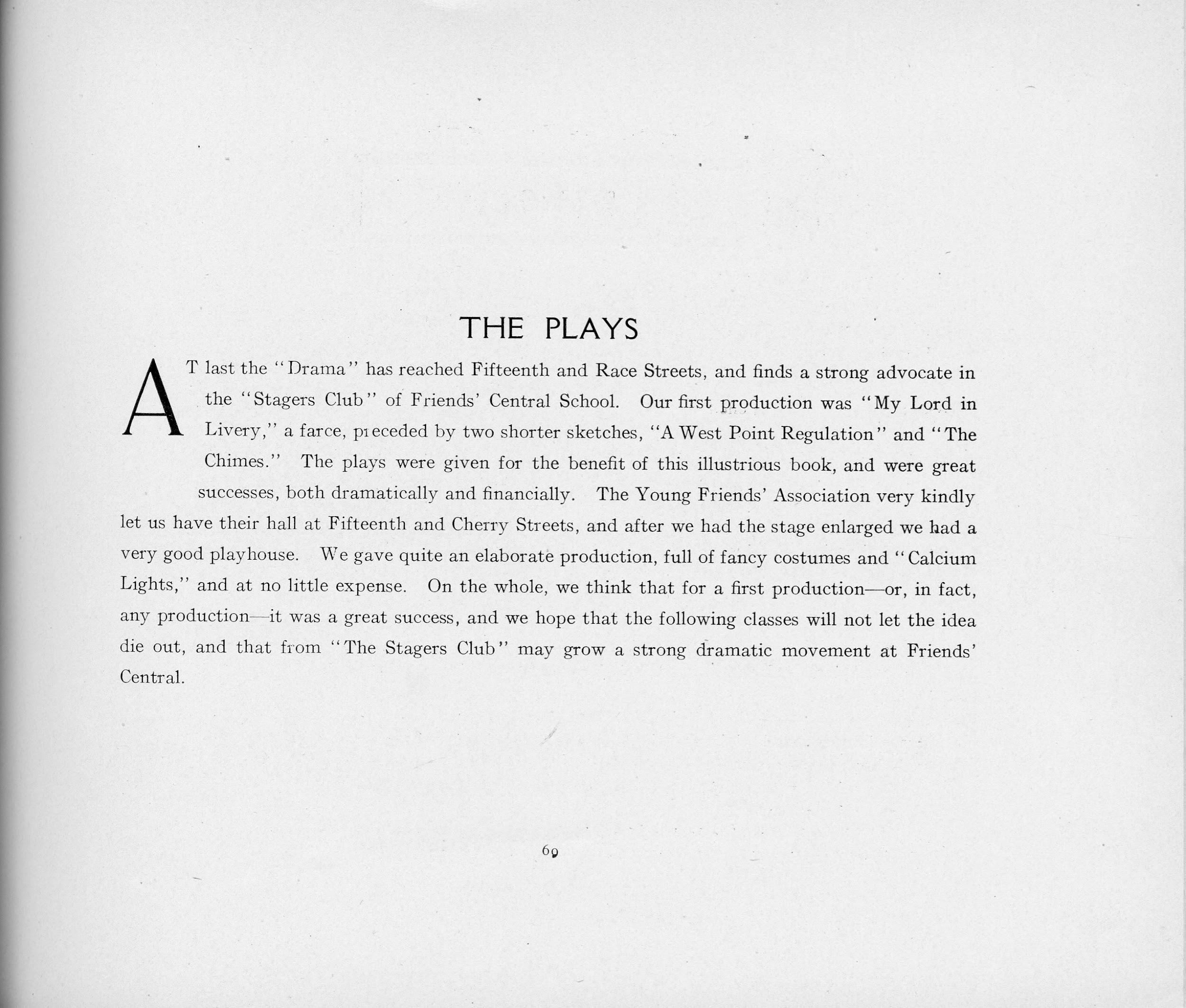
THE PLAYS
T last the " Drama " has reached Fifteenth and Race Streets, and finds a strong advocate in the " Stagers Club " of Friends' Central School. Our first production was " My Lord in Livery," a farce, Pl eceded by two shorter sketches, "A West Point Regulation " and " The Chimes." The plays were given for the benefit of this illustrious book, and were great successes, both dramatically and financially. The Young Friends' Association very kindly let us have their hall at Fifteenth and Cherry Streets, and after we had the stage enlarged we had a very good playhouse. We gave quite an elaborate production, full of fancy costumes and " Calcium Lights," and at no little expense. On the whole, we think that for a first production—or, in fact, any production—it was a great success, and we hope that the following classes will not let the idea die out, and that from " The Stagers Club " may grow a strong dramatic movement at Friends' Central.
Sing a song of street cars,
Seats all full ITiit chaps.
Four and twenty ladies
Hanging by der straps.
When die door was opened,
Der mens began to read
All der advertisements
Aboud new breakfast feed.

All die wimming, smiling, Hopped from feet to feet,
But die Mucilage Bruders
Stuck fast to their seats.
You may kiss in a hammock, And laugh at your spill ; But don't in canoes, Without making your will.
There once was a lady named Nell, Who considered herself quite a belle. She sat on the sand, And held her own hand, And then whispered, " Dearie, don't tell "
There once were some learned M. D. 'e They captured some germs of disease They infected a train Which, without causing pain, Allowed one to catch it with ease.
"All roads lead to Roam," remarked the tramp, studying a guide-book.
SHE AGREED WITH HIM.
It was long after midnight and the minutes were going hike hours.
' Oh, how I love a graceful elm-tree ! " she remarked. How I wish I were an elm-tree ! " he responded quickly.
' Yes, I wish you were."
' Why ? " he asked, with a look of devotion. Because," replied she, " elm-trees leave once a year."
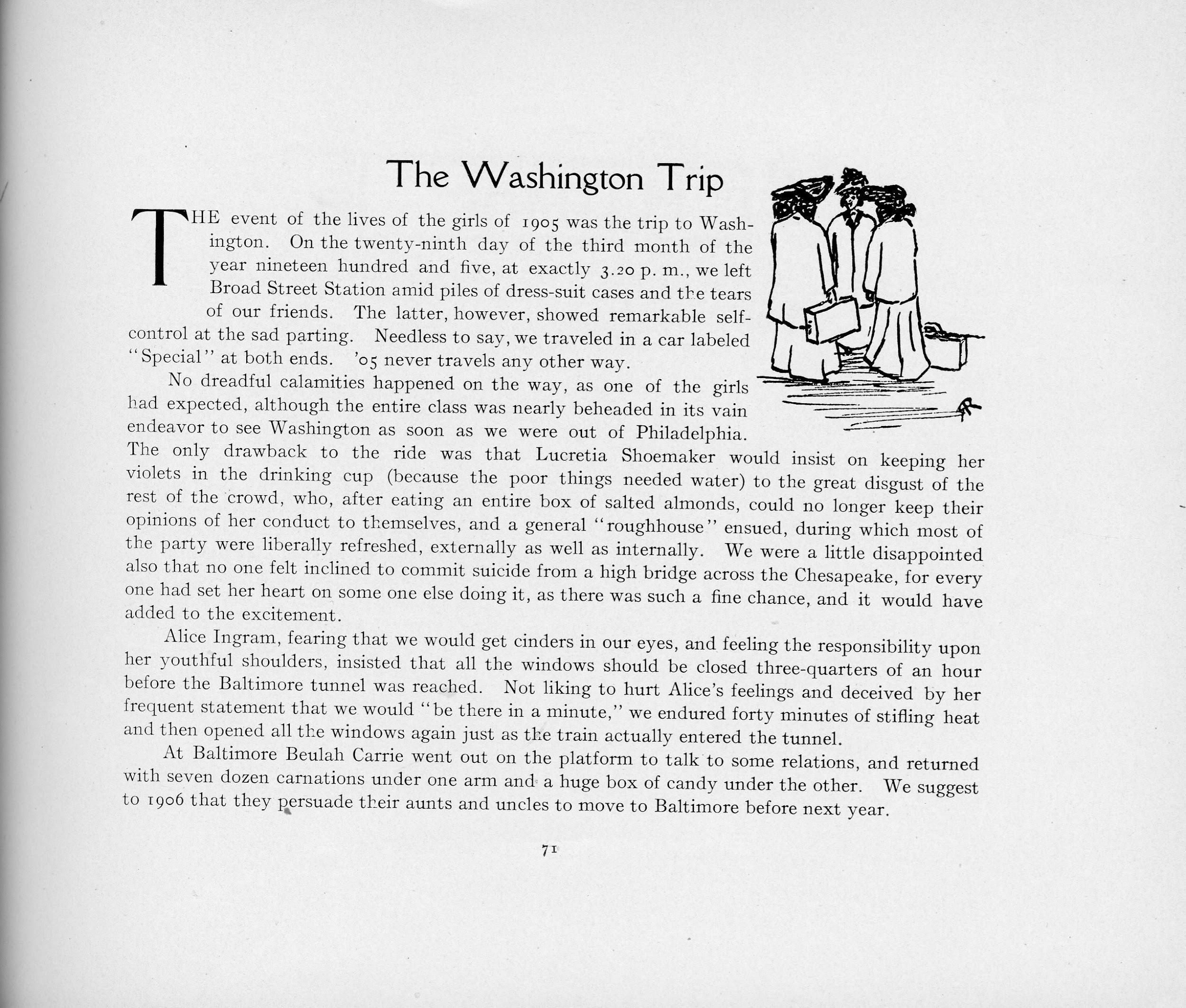
The VVashington Trip
HE event of the lives of the girls of 1905 was the trip to Washington. On the twenty-ninth day of the third month of the year nineteen hundred and five, at exactly 3.20 p. m., we left Broad Street Station amid piles of dress-suit cases and the tears of our friends. The latter, however, showed remarkable selfcontrol at the sad parting. Needless to say, we traveled in a car labeled Special " at both ends. '05 never travels any other way.
No dreadful calamities happened on the way, as one of the girls had expected, although the entire class was nearly beheaded in its vain endeavor to see Washington as soon as we were out of Philadelphia. The only drawback to the ride was that Lucretia Shoemaker would insist on keeping her violets in the drinking cup (because the poor things needed water) to the great disgust of the rest of the crowd, who, after eating an entire box of salted almonds, could no longer keep their opinions of her conduct to themselves, and a general " roughhouse " ensued, during which most of the party were liberally refreshed, externally as well as internally. We were a little disappointed also that no one felt inclined to commit suicide from a high bridge across the Chesapeake, for every one had set her heart on some one else doing it, as there was such a fine chance, and it would have added to the excitement.
Alice Ingram, fearing that we would get cinders in our eyes, and feeling the responsibility upon her youthful shoulders, insisted that all the windows should be closed three-quarters of an hour before the Baltimore tunnel was reached. Not liking to hurt Alice's feelings and deceived by her frequent statement that we would "be there in a minute," we endured forty minutes of stifling heat and then opened all the windows again just as the train actually entered the tunnel.
At Baltimore Beulah Carrie went out on the platform to talk to some relations, and returned with seven dozen carnations under one arm and a huge box of candy under the other. We suggest to 1906 that they persuade their aunts and uncles to move to Baltimore before next year.
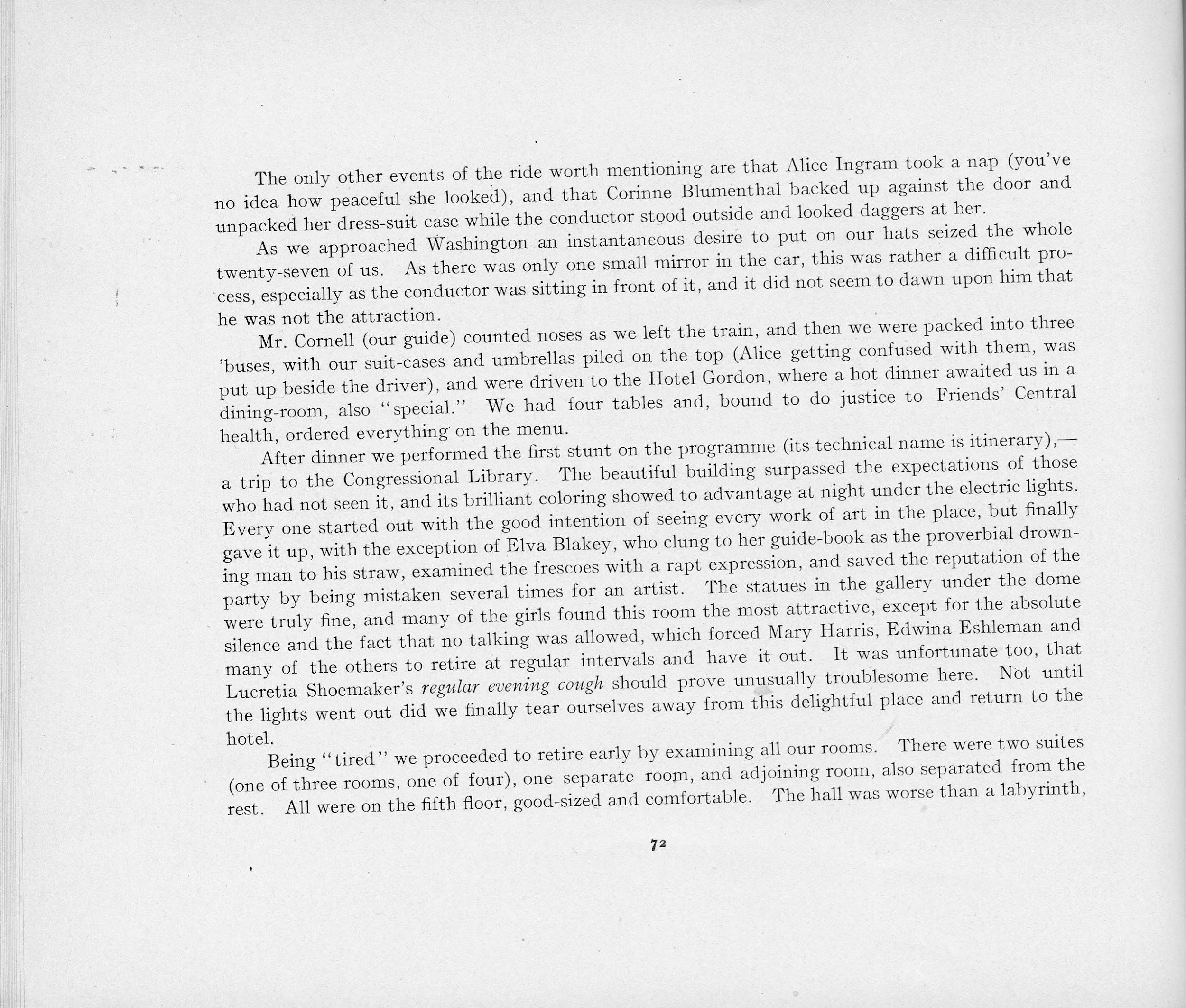
The only other events of the ride worth mentioning are that Alice Ingram took a nap (you've no idea how peaceful she looked), and that Corinne Blumenthal backed up against the door and unpacked her dress-suit case while the conductor stood outside and looked daggers at her.
As we approached Washington an instantaneous desire to put on our hats seized the whole twenty-seven of us. As there was only one small mirror in the car, this was rather a difficult process, especially as the conductor was sitting in front of it, and it did not seem to dawn upon him that he was not the attraction.
Mr. Cornell (our guide) counted noses as we left the train, and then we were packed into three 'buses, with our suit-cases and umbrellas piled on the top (Alice getting confused with them, was put up beside the driver), and were driven to the Hotel Gordon, where a hot dinner awaited us in a dining-room, also " special." We had four tables and, bound to do justice to Friends' Central health, ordered everything on the menu.
After dinner we performed the first stunt on the programme (its technical name is itinerary) a trip to the Congressional Library. The beautiful building surpassed the expectations of those who had not seen it, and its brilliant coloring showed to advantage at night under the electric lights. Every one started out with the good intention of seeing every work of art in the place, but finally gave it up, with the exception of Elva Blakey, who clung to her guide-book as the proverbial drowning man to his straw, examined the frescoes with a rapt expression, and saved the reputation of the party by being mistaken several times for an artist. The statues in the gallery under the dome were truly fine, and many of the girls found this room the most attractive, except for the absolute silence and the fact that no talking was allowed, which forced Mary Harris, Edwina Eshleman and many of the others to retire at regular intervals and have it out. It was unfortunate too, that Lucretia Shoemaker's regular evening cough should prove unusually troublesome here. Not until the lights went out did we finally tear ourselves away from this delightful place and return to the hotel.
Being " tired " we proceeded to retire early by examining all our rooms. There were two suites (one of three rooms, one of four), one separate room, and adjoining room, also separated from the rest. All were on the fifth floor, good-sized and comfortable. The hall was worse than a labyrinth,
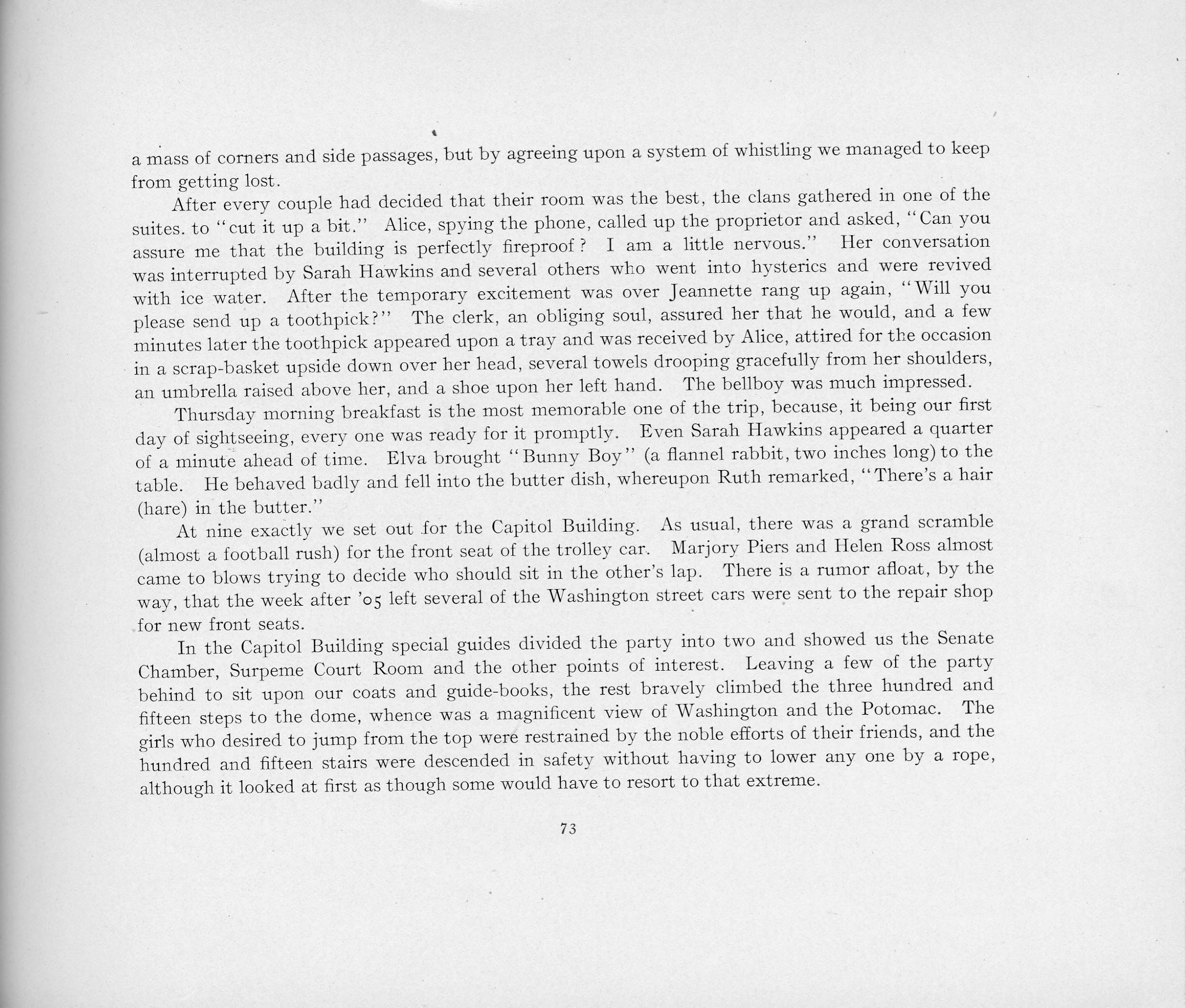
a mass of corners and side passages, but by agreeing upon a system of whistling we managed to keep from getting lost.
After every couple had decided that their room was the best, the clans gathered in one of the suites. to " cut it up a bit." Alice, spying the phone, called up the proprietor and asked, " Can you assure me that the building is perfectly fireproof? I am a little nervous." Her conversation was interrupted by Sarah Hawkins and several others who went into hysterics and were revived with ice water. After the temporary excitement was over Jeannette rang up again, " Will you please send up a toothpick?" The clerk, an obliging soul, assured her that he would, and a few minutes later the toothpick appeared upon a tray and was received by Alice, attired for the occasion in a scrap-basket upside down over her head, several towels drooping gracefully from her shoulders, an umbrella raised above her, and a shoe upon her left hand. The bellboy was much impressed.
Thursday morning breakfast is the most memorable one of the trip, because, it being our first day of sightseeing, every one was ready for it promptly. Even Sarah Hawkins appeared a quarter of a minute ahead of time. Elva brought " Bunny Boy" (a flannel rabbit, two inches long) to the table. He behaved badly and fell into the butter dish, whereupon Ruth remarked, " There's a hair (hare) in the butter."
At nine exactly we set out .for the Capitol Building. As usual, there was a grand scramble (almost a football rush) for the front seat of the trolley car. Marjory Piers and Helen Ross almost came to blows trying to decide who should sit in the other's lap. There is a rumor afloat, by the way, that the week after '05 left several of the Washington street cars were sent to the repair shop for new front seats.
In the Capitol Building special guides divided the party into two and showed us the Senate Chamber, Surpeme Court Room and the other points of interest. Leaving a few of the party behind to sit upon our coats and guide-books, the rest bravely climbed the three hundred and fifteen steps to the dome, whence was a magnificent view of Washington and the Potomac. The girls who desired to jump from the top were restrained by the noble efforts of their friends, and the hundred and fifteen stairs were descended in safety without having to lower any one by a rope, although it looked at first as though some would have to resort to that extreme.

After buying out a stock of picture postal cards on sale we made another visit to the Congressional Library, where we climbed more steps and saw the few frescoes not seen the night before.
Immediately after lunch the trolley trip to Mount Vernon began in a special car. There was some little feeling at first as to who ought to sit in the end labeled "white," but finally the trouble was peacefully adjusted. Katherine Wolff and Lucretia Shoemaker labored under the delusion that they would have a nice quiet chance to read Hamlet, but soon found out their mistake, for an impolite guide stood up in the front of the car and interrupted every few minutes by crying impressively through a megaphone, " To your right you see," or " To your left you see." Then the whole carload, Katherine and Lucretia included, would stare industriously at tlæ wrong building.
It was unanimously decided afterwards that Mount Vernon was the most interesting and impressive sight of the trip. A white-haired guide, WYO felt the dignity of his position and wished others to feel it, told the story of every small object in the house. We could not help doubting some of his statements, and the fact that the lock of George Washington's hair was not marked on the catalogue by a star, as were all his authentic possessions, caused quite a difference of opinion about its being part of his wig or having belonged to some other man. After going through the house a visit was made to Washington's tomb, where an aged colored man, with uncovered made a little address to the crowd assembled.
After a look at the Rose Garden and a search for souvenirs we were with difficulty persuaded to return to the car, which proceeded to Arlington, where two huge 'buses conveyed us through the cemetery to the Arlington mansion. Ruth and Helen Ross clung on to the back steps, which rather disturbed the equilibrium of things and made the horses indignant.
More impressiveness, this time in the shape of a driver, kept saying, " To your right you see—" and "To your left you see—" Katherine, just to see how deep his convictions really were, asked whether this was the "largest cemetery," the " most impressive," the "most beautiful," and various other questions, to all of which he answered " Yes," until she came to "the oldest," when he was obliged to say " No." A few minutes later he began again, " To your left you see the graves of the heroes who died of the Maine.' ' What is the mange?" asked one girl innocently. She was not enlightened.
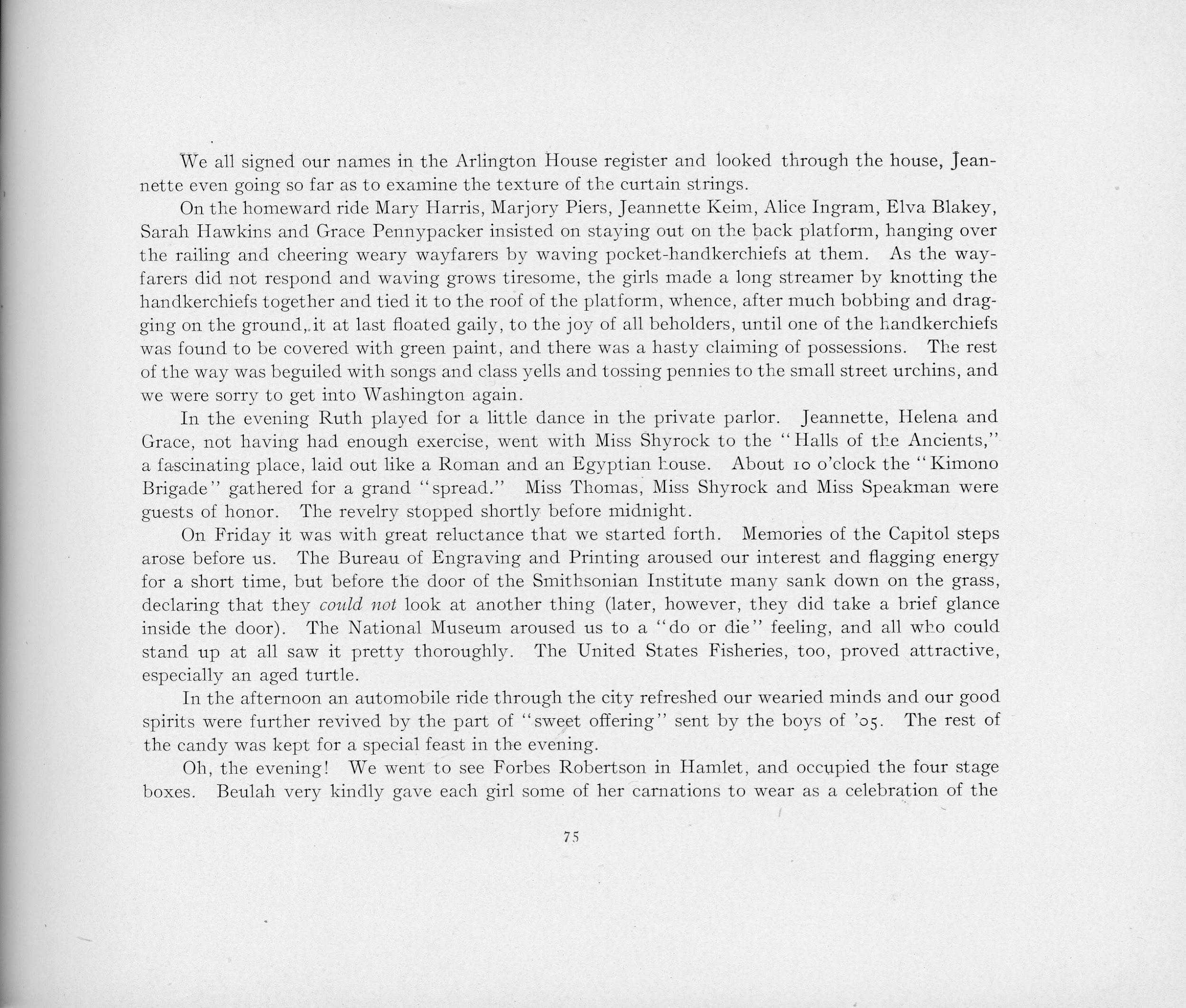
We all signed our names in the Arlington House register and looked through the house, Jeannette even going so far as to examine the texture of the curtain strings.
On the homeward ride Mary Harris, Marjory Piers, Jeannette Keim, Alice Ingram, Elva Blakey, Sarah Hawkins and Grace Pennypacker insisted on staying out on the back platform, hanging over the railing and cheering weary wayfarers by waving pocket-handkerchiefs at them. As the wayfarers did not respond and waving grows tiresome, the girls made a long streamer by knotting the handkerchiefs together and tied it to the roof of the platform, whence, after much bobbing and dragging on the ground,.it at last floated gaily, to the joy of all beholders, until one of the handkerchiefs was found to be covered with green paint, and there was a hasty claiming of possessions. The rest of the way was beguiled with songs and class yells and tossing pennies to the small street urchins, and we were sorry to get into Washington again.
In the evening Ruth played for a little dance in the private parlor. Jeannette, Helena and Grace, not having had enough exercise, went with Miss Shyrock to the " Halls of the Ancients," a fascinating place, laid out like a Roman and an Egyptian Eouse. About 10 0'clock the " Kimono Brigade" gathered for a grand " spread." Miss Thomas, Miss Shyrock and Miss Speakman were guests of honor. The revelry stopped shortly before midnight.
On Friday it was with great reluctance that we started forth. Memories of the Capitol steps arose before us. The Bureau of Engraving and Printing aroused our interest and flagging energy for a short time, but before the door of the Smithsonian Institute many sank down on the grass, declaring that they could not look at another thing (later, however, they did take a brief glance inside the door). The National Museum aroused us to a " do or die" feeling, and all who could stand up at all saw it pretty thoroughly. The United States Fisheries, too, proved attractive, especially an aged turtle.
In the afternoon an automobile ride through the city refreshed our wearied minds and our good spirits were further revived by the part of " sweet offering" sent by the boys of '05. The rest of the candy was kept for a special feast in the evening.
Oh, the evening! We went to see Forbes Robertson in Hamlet, and occupied the four stage boxes. Beulah very kindly gave each girl some of her carnations to wear as a celebration of the
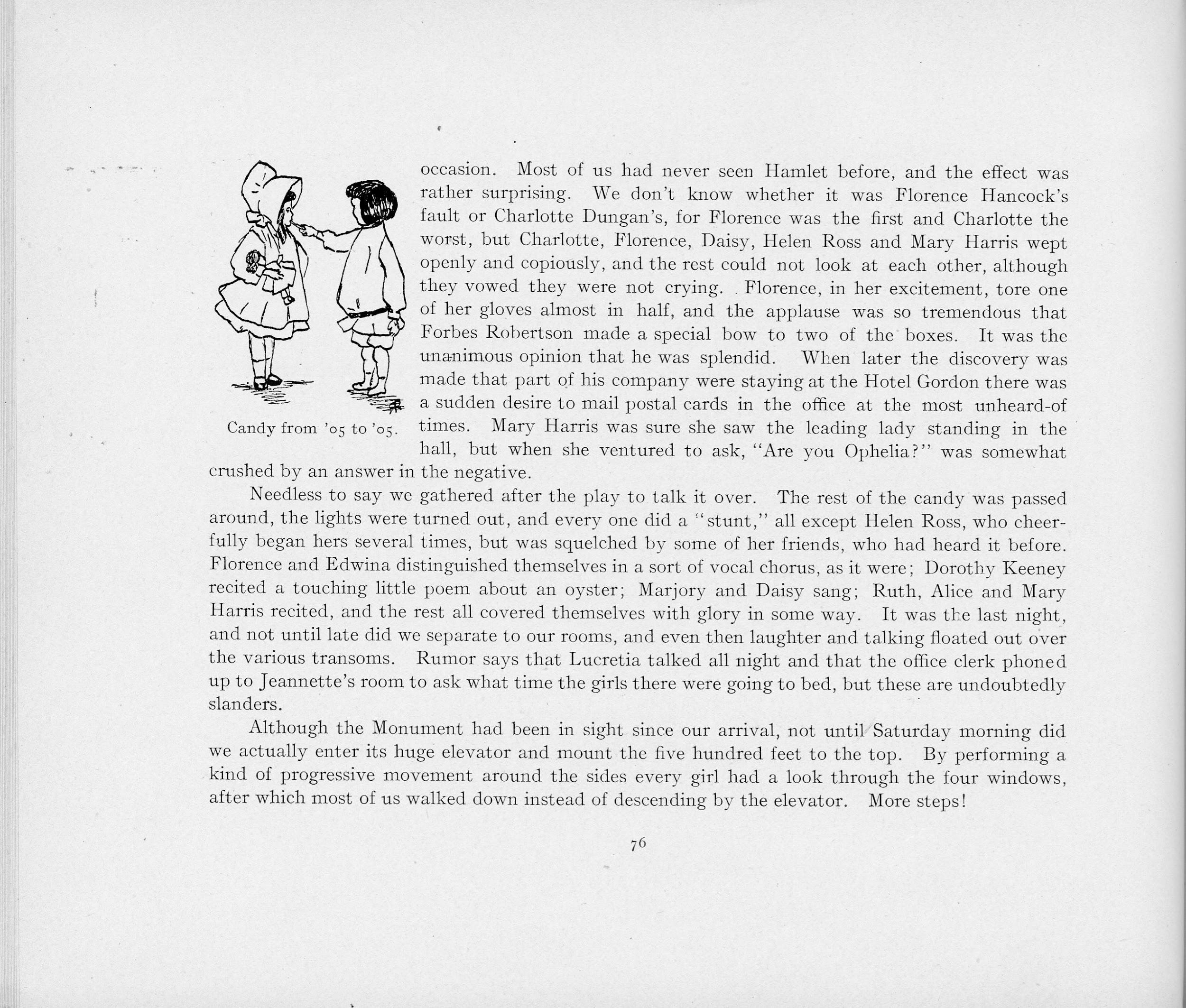
occasion. Most of us had never seen Hamlet before, and the effect was rather surprising. We don't know whether it was Florence Hancock's fault or Charlotte Dungan 's, for Florence was the first and Charlotte the worst, but Charlotte, Florence, Daisy, Helen Ross and Mary Harris wept openly and copiously, and the rest could not look at each other, although they vowed they were not crying. Florence, in her excitement, tore one of her gloves almost in half, and the applause was so tremendous that Forbes Robertson made a special bow to two of the boxes. It was the unanimous opinion that he was splendid. When later the discovery was made that part of his company were staying at the Hotel Gordon there was a sudden desire to mail postal cards in the office at the most unheard-of times. Mary Harris was sure she saw the leading lady standing in the Candy from '05 to '05. hall, but when she ventured to ask, "Are you Ophelia?" was somewhat crushed by an answer in the negative.
Needless to say we gathered after the play to talk it over. The rest of the candy was passed around, the lights were turned out, and every one did a " stunt," all except Helen Ross, who cheerfully began hers several times, but was squelched by some of her friends, who had heard it before. Florence and Edwina distinguished themselves in a sort of vocal chorus, as it were; Dorothy Keeney recited a touching little poem about an oyster; Marjory and Daisy sang; Ruth, Alice and Mary Harris recited, and the rest all covered themselves with glory in some way. It was the last night, and not until late did we separate to our rooms, and even then laughter and talking floated out over the various transoms. Rumor says that Lucretia talked all night and that the office clerk phoned up to Jeannette's room to ask what time the girls there were going to bed, but these are undoubtedly slanders.
Although the Monument had been in sight since our arrival, not until Saturday morning did we actually enter its huge elevator and mount the five hundred feet to the top. By performing a kind of progressive movement around the sides every girl had a look through the four windows, after which most of us walked down instead of descending by the elevator. More steps!
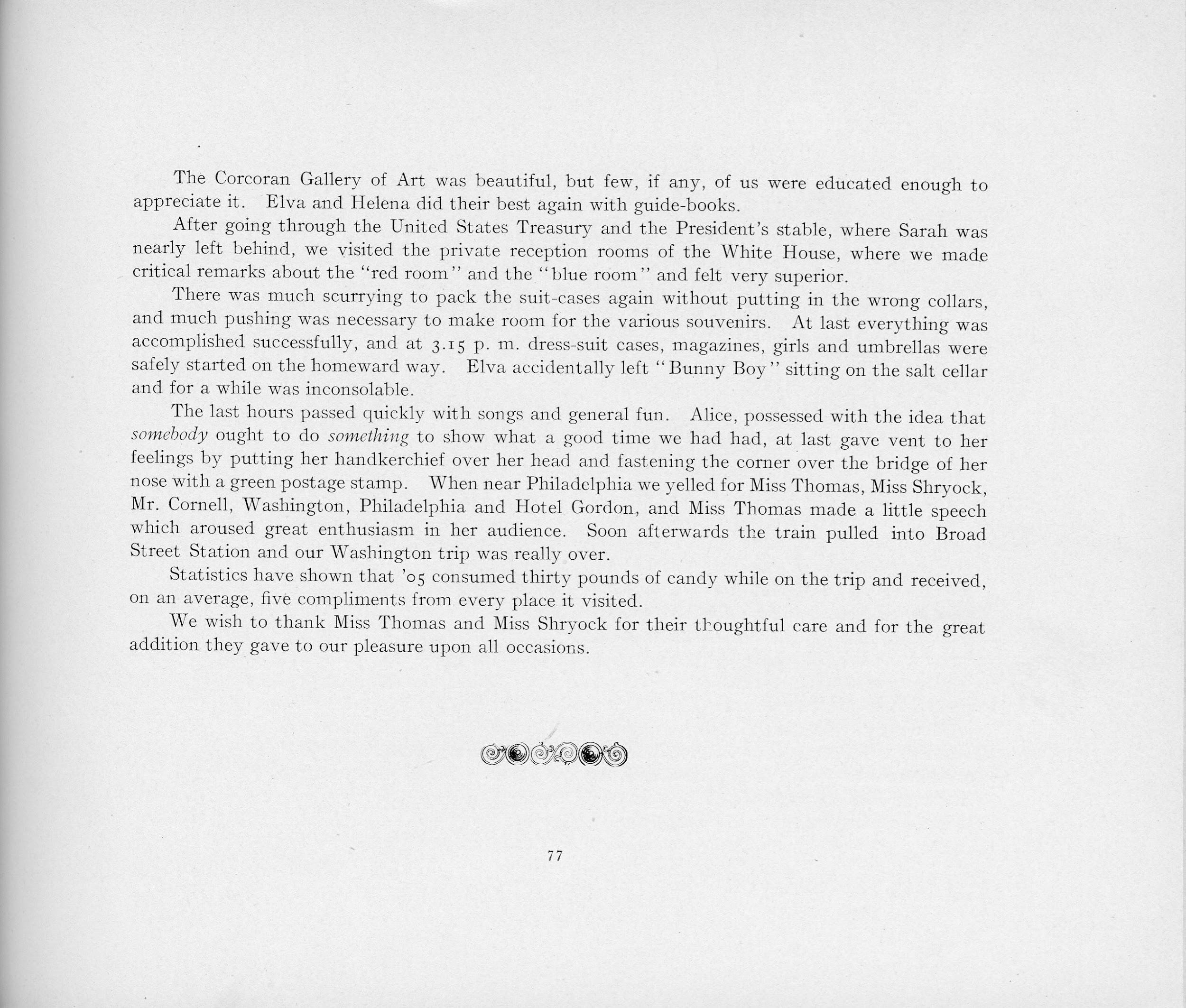
The Corcoran Gallery of Art was beautiful, but few, if any, of us were educated enough to appreciate it. Elva and Helena did their best again with guide-books.
After going through the United States Treasury and the President's stable, where Sarah was nearly left behind, we visited the private reception rooms of the White House, where we made critical remarks about the "red room " and the "blue room " and felt very superior.
There was much scurrying to pack the suit-cases again without putting in the wrong collars, and much pushing was necessary to make room for the various souvenirs. At last everything was accomplished successfully, and at 3.15 p. m. dress-suit cases, magazines, girls and umbrellas were safely started on the homeward way. Elva accidentally left " Bunny Boy" sitting on the salt cellar and for a while was inconsolable.
The last hours passed quickly with songs and general fun. Alice, possessed with the idea that somebody ought to do something to show what a good time we had had, at last gave vent to her feelings by putting her handkerchief over her head and fastening the corner over the bridge of her nose with a green postage stamp. When near Philadelphia we yelled for Miss Thomas, Miss Shryock, Mr. Cornell, Washington, Philadelphia and Hotel Gordon, and Miss Thomas made a little speech which aroused great enthusiasm in her audience. Soon afterwards the train pulled into Broad Street Station and our Washington trip was really over.
Statistics have shown that '05 consumed thirty pounds of candy while on the trip and received, on an average, five compliments from every place it visited.
We wish to thank Miss Thomas and Miss Shryock for their thoughtful care and for the great addition they gave to our pleasure upon all occasions.
VVashington Trip
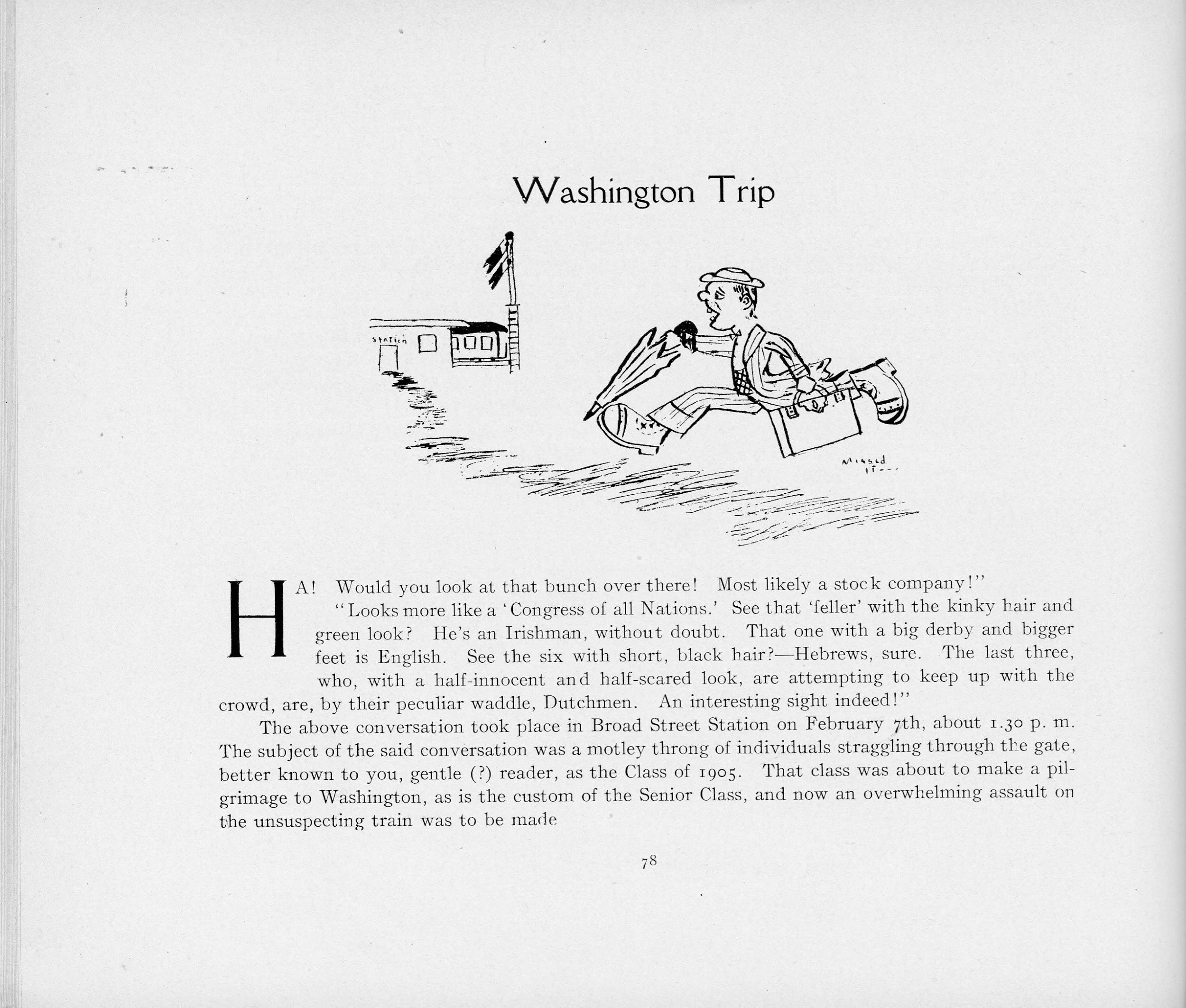
A! Would you look at that bunch over there! Most likely a stock company ! "
' Looks more like a ' Congress of all Nations.' See that 'feller' with the kinky hair and green look? He's an Irishman, without doubt. That one with a big derby and bigger feet is English. See the six with short, black sure. The last three, who, with a half-innocent and half-scared look, are attempting to keep up with the crowd, are, by their peculiar waddle, Dutchmen. An interesting sight indeed ! "
The above conversation took place in Broad Street Station on February 7th, about 1.30 p. m. The subject of the said conversation was a motley throng of individuals straggling through the gate, better known to you, gentle (?) reader, as the Class of 1905. That class was about to make a pilgrimage to Washington, as is the custom of the Senior Class, and now an overwhelming assault on the unsuspecting train was to be made
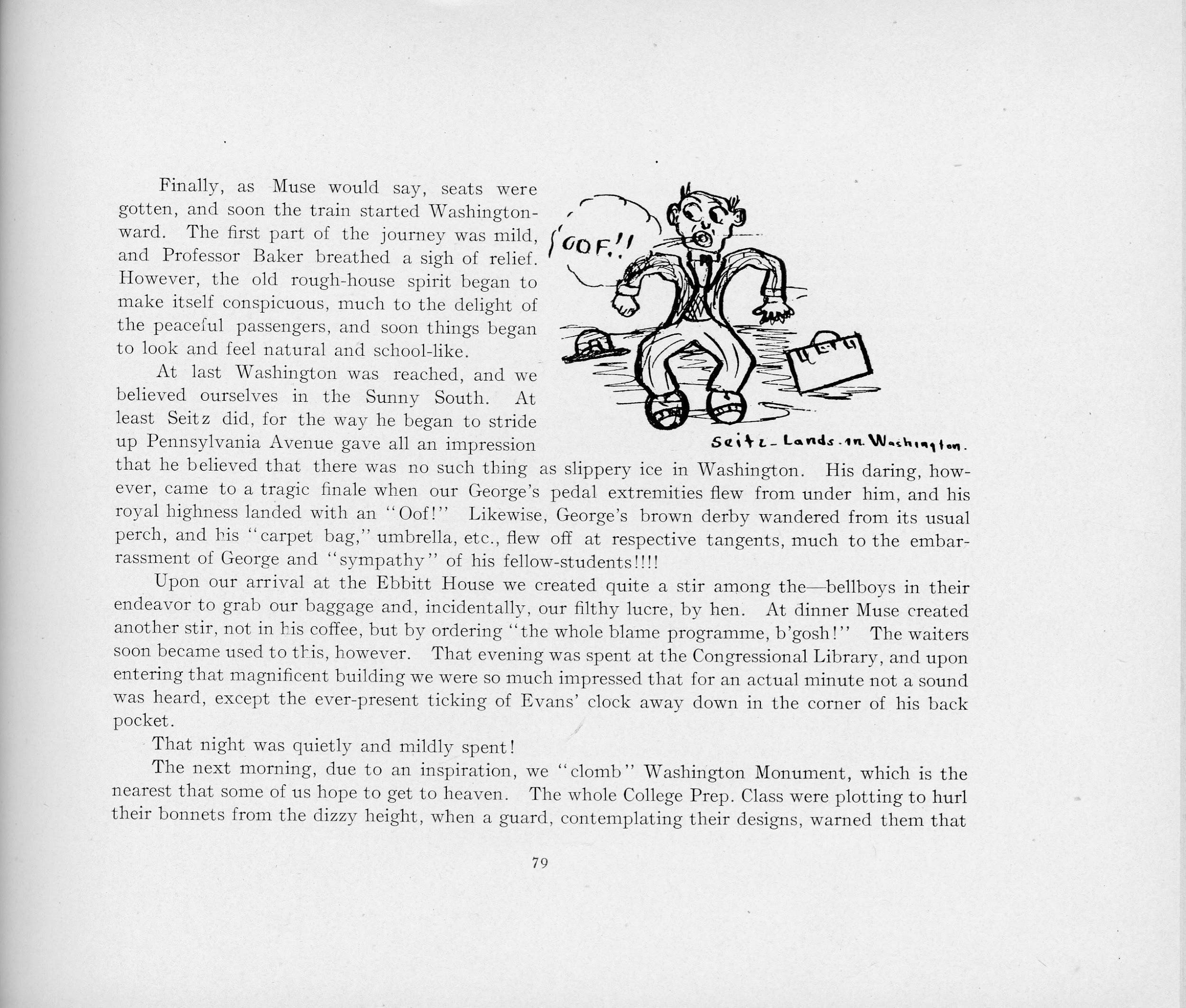
Finally, as Muse would say, seats were gotten, and soon the train started Washingtonward. The first part of the journey was mild, ( 00 and Professor Baker breathed a sigh of relief. However, the old rough-house spirit began to make itself conspicuous, much to the delight of the peaceful passengers, and soon things began to look and feel natural and school-like.
At last Washington was reached, and we believed ourselves in the Sunny South. At least Seitz did, for the way he began to stride up Pennsylvania Avenue gave all an impression that he believed that there was no such thing as slippery ice in Washington. His daring, however, came to a tragic finale when our George's pedal extremities flew from under him, and his royal highness landed with an " Oof!" Likewise, George's brown derby wandered from its usual perch, and Fis " carpet bag," umbrella, etc., flew off at respective tangents, much to the embarrassment of George and " sympathy" of his fellow-students !!!!
Upon our arrival at the Ebbitt House we created quite a stir among the—bellboys in their endeavor to grab our baggage and, incidentally, our filthy lucre, by hen. At dinner Muse created another stir, not in his coffee, but by ordering "the whole blame programme, b'gosh ! " The waiters soon became used to this, however. That evening was spent at the Congressional Library, and upon entering that magnificent building we were so much impressed that for an actual minute not a sound was heard, except the ever-present ticking of Evans' clock away down in the corner of his back pocket.
That night was quietly and mildly spent !
The next morning, due to an inspiration, we " clomb " Washington Monument, which is the nearest that some of us hope to get to heaven. The whole College Prep. Class were plotting to hurl their bonnets from the dizzy height, when a guard, contemplating their designs, warned them that
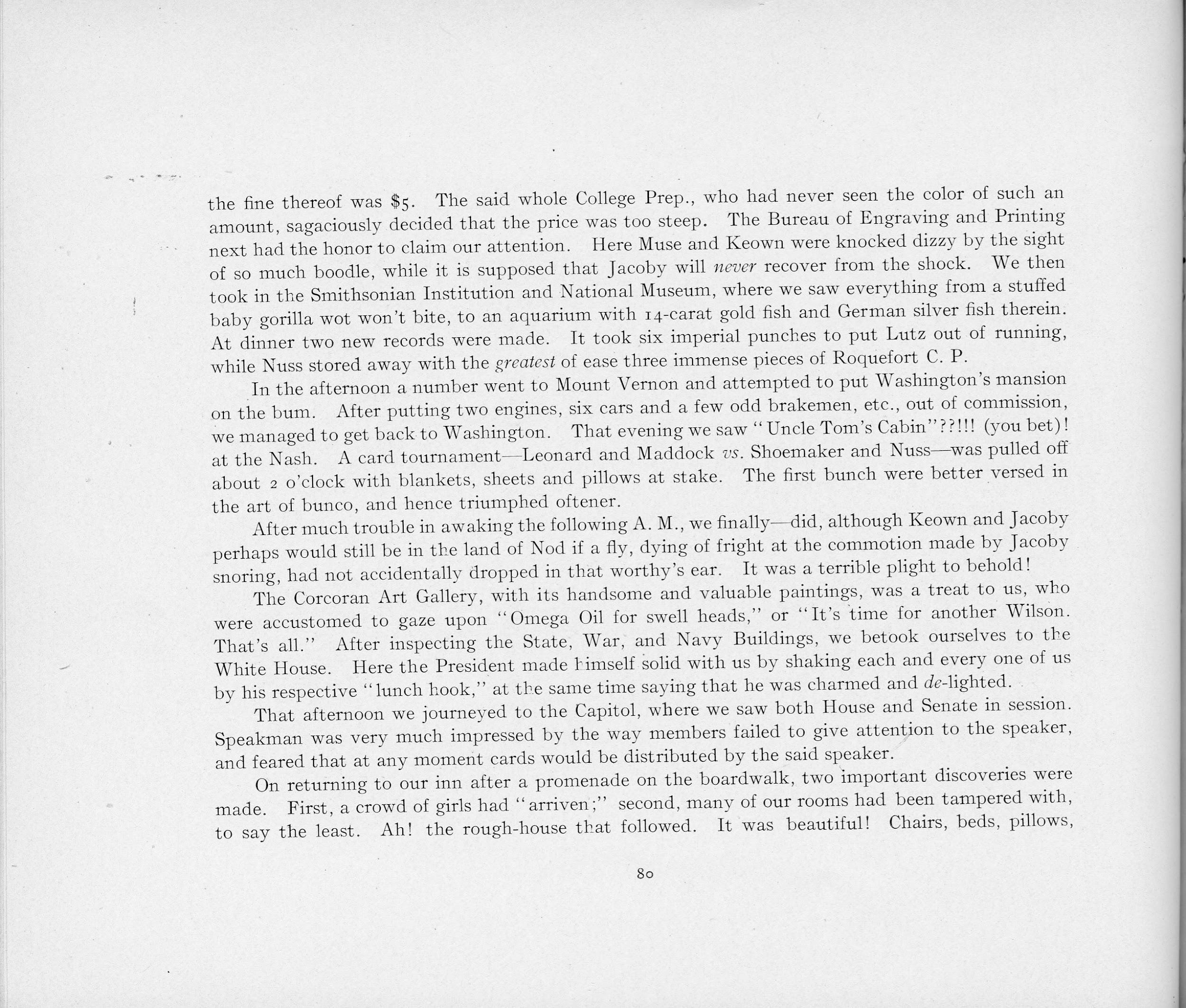
the fine thereof was $5. The said whole College Prep. who had never seen the color of such an amount, sagaciously decided that the price was too steep. The Bureau of Engraving and Printing next had the honor to claim our attention. Here Muse and Keown were knocked dizzy by the sight of so much boodle, while it is supposed that Jacoby will never recover from the shock. We then took in the Smithsonian Institution and National Museum, where we saw everything from a stuffed baby gorilla wot won't bite, to an aquarium with 14-carat gold fish and German silver fish therein. At dinner two new records were made. It took six imperial punches to put Lutz out of running, while Nuss stored away with the greatest of ease three immense pieces of Roquefort C. P.
In the afternoon a number went to Mount Vernon and attempted to put Washington's mansion on the bum. After putting two engines, six cars and a few odd brakemen, etc., out of commission, we managed to get back to Washington. That evening we saw " Uncle Tom's Cabin" ??!!! (you bet) ! at the Nash. A card tournament——Leonard and Maddock vs. Shoemaker and Nuss—was pulled off about 2 0'clock with blankets, sheets and pillows at stake. The first bunch were better versed in the art of bunco, and hence triumphed oftener.
After much trouble in awaking the following A. M. we finally—did, although Keown and Jacoby perhaps would still be in the land of Nod if a fly, dying of fright at the commotion made by Jacoby snoring, had not accidentally dropped in that worthy's ear. It was a terrible plight to behold!
The Corcoran Art Gallery, with its handsome and valuable paintings, was a treat to us, who were accustomed to gaze upon " Omega Oil for swell heads," or " It's time for another Wilson.
That's all." After inspecting the State, War, and Navy Buildings, we betook ourselves to the White House. Here the President made Yimself solid with us by shaking each and every one of us by his respective " lunch hook," at the same time saying that he was charmed and de-lighted.
That afternoon we journeyed to the Capitol, where we saw both House and Senate in session. Speakman was very much impressed by the way members failed to give attention to the speaker, and feared that at any moment cards would be distributed by the said speaker.
On returning to our inn after a promenade on the boardwalk, two important discoveries were made. First, a crowd of girls had " arriven ;" second, many of our rooms had been tampered with, to say the least. Ah! the rough-house that followed. It was beautiful! Chairs, beds, pillows,
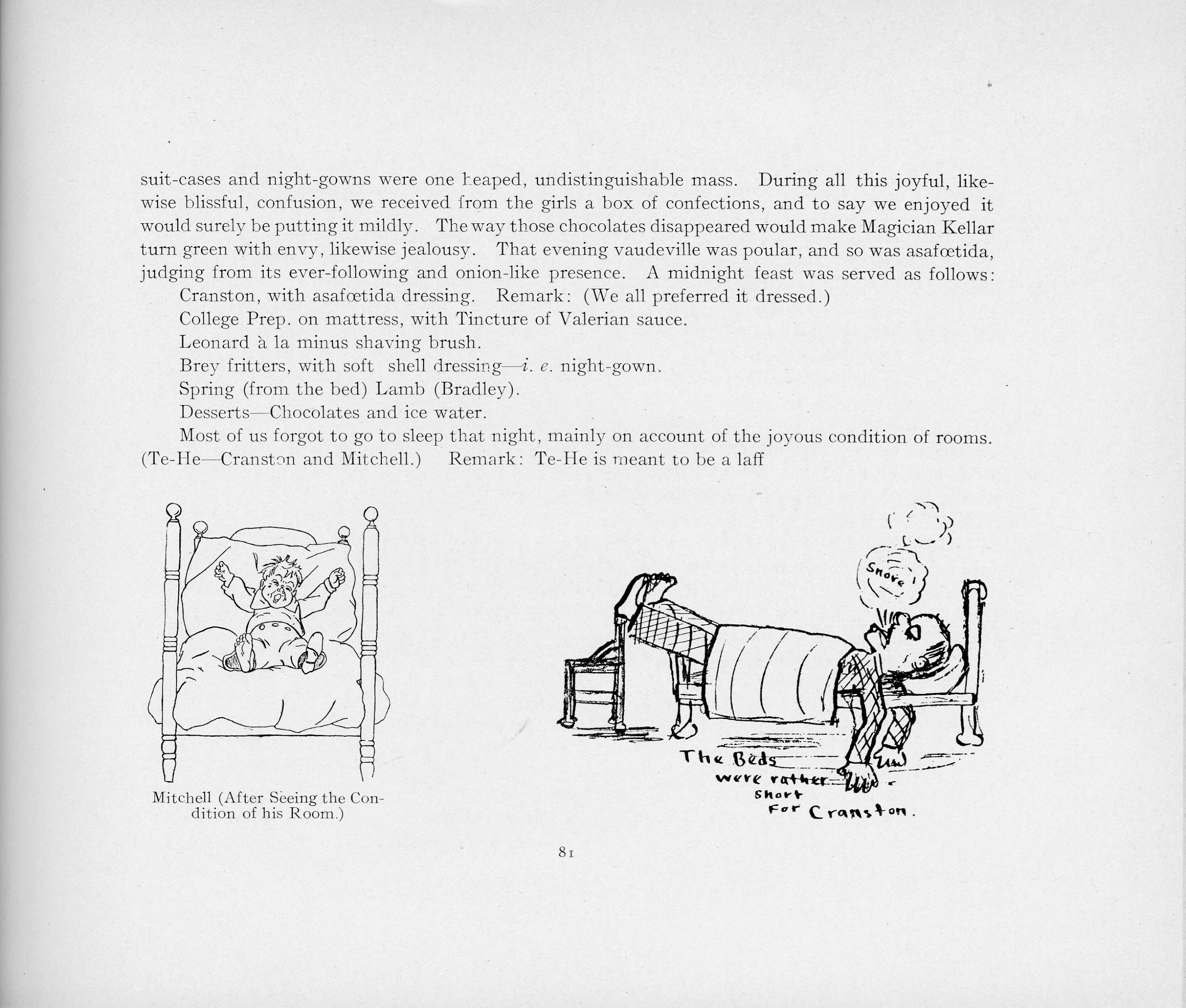
suit-cases and night-gowns were one Yeaped, undistinguishable mass. During all this joyful, likewise blissful, confusion, we received from the girls a box of confections, and to say we enjoyed it would surely be putting it mildly. The way those chocolates disappeared would make Magician Kellar turn green with envy, likewise jealousy. That evening vaudeville was poular, and so was asafoetida, judging from its ever-following and onion-like presence. A midnight feast was served as follows :
Cranston, with asafcetida dressing. Remark: (We all preferred it dressed.)
College Prep. on mattress, with Tincture of Valerian sauce.
Leonard la minus shaving brush.
Brey fritters, with soft shell dressing—i. c. night-gown.
Spring (from the bed) Lamb (Bradley).
Desserts—Choc01ates and ice water.
Most of us forgot to go to sleep that night, mainly on account of the joyous condition of rooms. (Te-He—Cranston and Mitchell.) Remark: Te-He is meant to be a laff
Mitchell (After Seeing the Condition of his Room.)
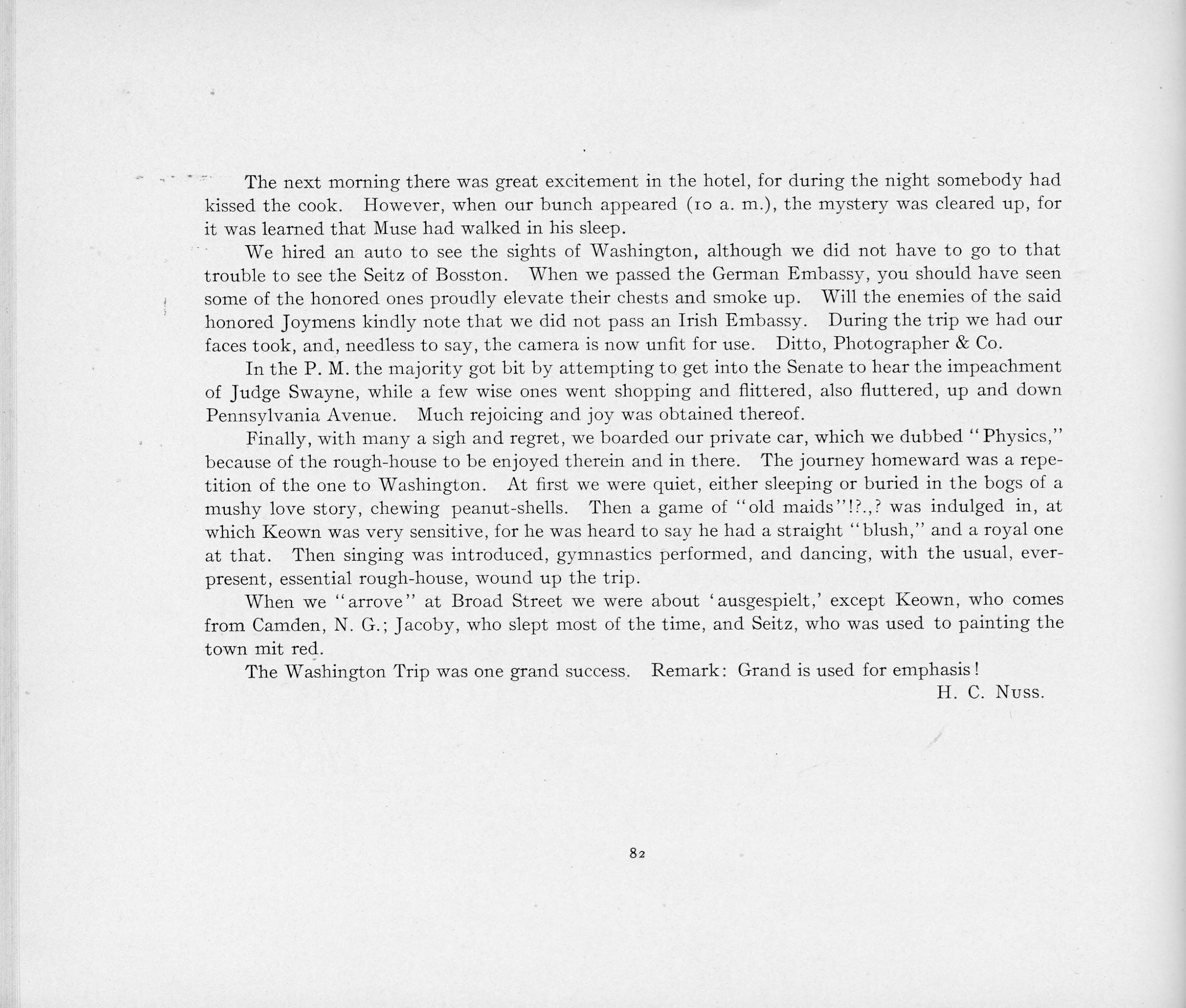
The next morning there was great excitement in the hotel, for during the night somebody had kissed the cook. However, when our bunch appeared (TO a. m.) , the mystery was cleared up, for it was learned that Muse had walked in his sleep.
We hired an auto to see the sights of Washington, although we did not have to go to that trouble to see the Seitz of Bosston. When we passed the German Embassy, you should have seen some of the honored ones proudly elevate their chests and smoke up. Will the enemies of the said honored Joymens kindly note that we did not pass an Irish Embassy. During the trip we had our faces took, and, needless to say, the camera is now unfit for use. Ditto, Photographer & Co.
In the P. M. the majority got bit by attempting to get into the Senate to hear the impeachment of Judge Swayne, while a few wise ones went shopping and flittered, also fluttered, up and down Pennsylvania Avenue. Much rejoicing and joy was obtained thereof.
Finally, with many a sigh and regret, we boarded our private car, which we dubbed " Physics," because of the rough-house to be enjoyed therein and in there. The journey homeward was a repetition of the one to Washington. At first we were quiet, either sleeping or buried in the bogs of a mushy love story, chewing peanut-shells. Then a game of " old maids "!?.,? was indulged in, at which Keown was very sensitive, for he was heard to say he had a straight " blush," and a royal one at that. Then singing was introduced, gymnastics performed, and dancing, with the usual, everpresent, essential rough-house, wound up the trip.
When we " arrove " at Broad Street we were about ' ausgespielt,' except Keown, who comes from Camden, N. G. ; Jacoby, who slept most of the time, and Seitz, who was used to painting the town mit red.
The Washington Trip was one grand success. Remark: Grand is used for emphasis ! H. C. Nuss.
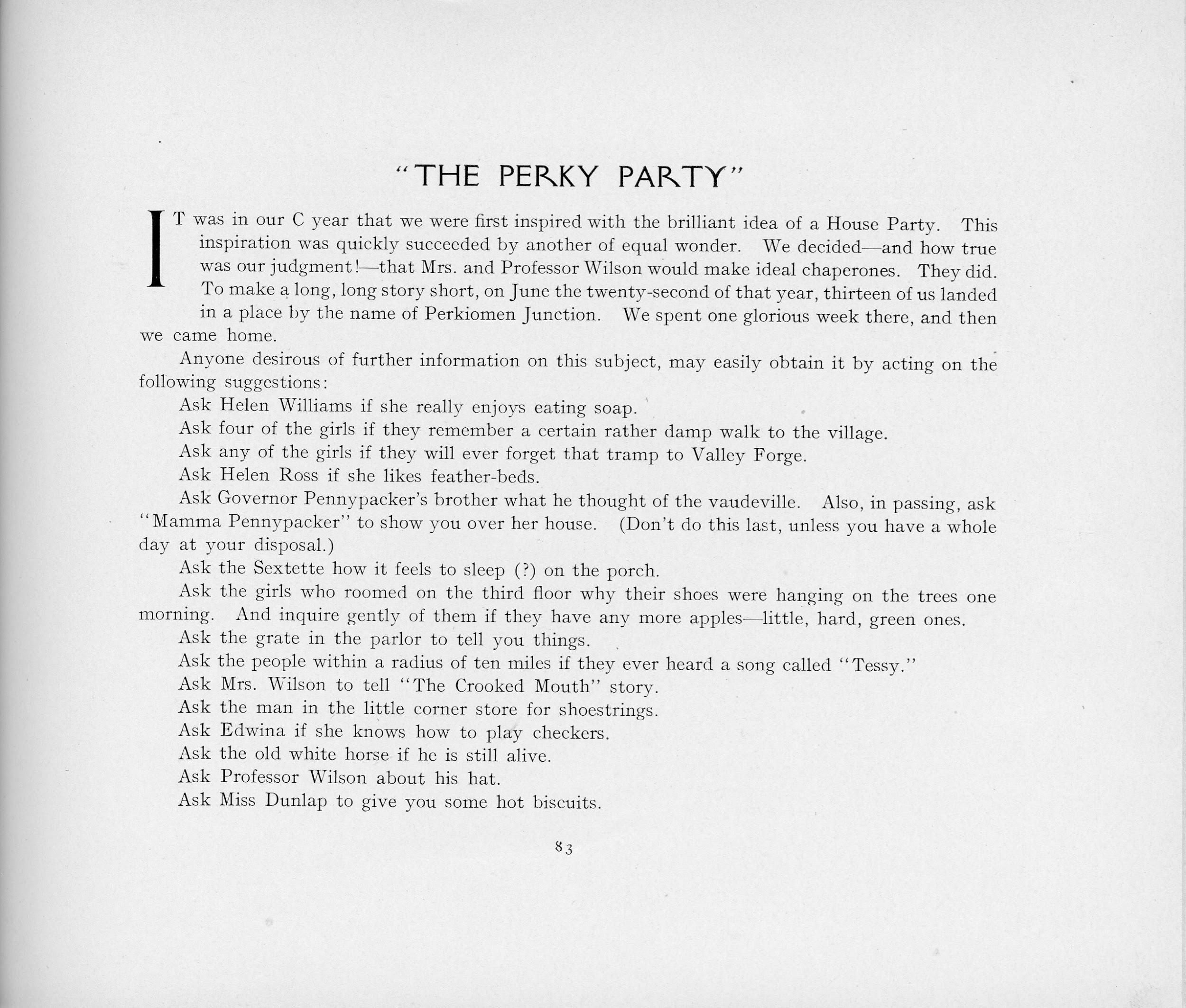
THE PERKY PARTY"
T was in our C year that we were first inspired with the brilliant idea of a House Party. This inspiration was quickly succeeded by another of equal wonder. We decided—and how true was our judgment !—that Mrs. and Professor Wilson would make ideal chaperones. They did.
To make a long, long story short, on June the twenty-second of that year, thirteen of us landed in a place by the name of Perkiomen Junction. We spent one glorious week there, and then we came home.
Anyone desirous of further information on this subject, may easily obtain it by acting on the following suggestions
Ask Helen Williams if she really enjoys eating soap.
Ask four of the girls if they remember a certain rather damp walk to the village.
Ask any of the girls if they will ever forget that tramp to Valley Forge.
Ask Helen Ross if she likes feather-beds.
Ask Governor Pennypacker's brother what he thought of the vaudeville. Also, in passing, ask Mamma Pennypacker" to show you over her house. (Don't do this last, unless you have a whole day at your disposal.)
Ask the Sextette how it feels to sleep (?) on the porch.
Ask the girls who roomed on the third floor why their shoes were hanging on the trees one morning. And inquire gently of them if they have any more apples—little, hard, green ones.
Ask the grate in the parlor to tell you things.
Ask the people within a radius of ten miles if they ever heard a song called "Tessy.'
Ask Mrs. Wilson to tell " The Crooked Mouth" story.
Ask the man in the little corner store for shoestrings.
Ask Edwina if she knows how to play checkers.
Ask the old white horse if he is still alive.
Ask Professor Wilson about his hat.
Ask Miss Dunlap to give you some hot biscuits.
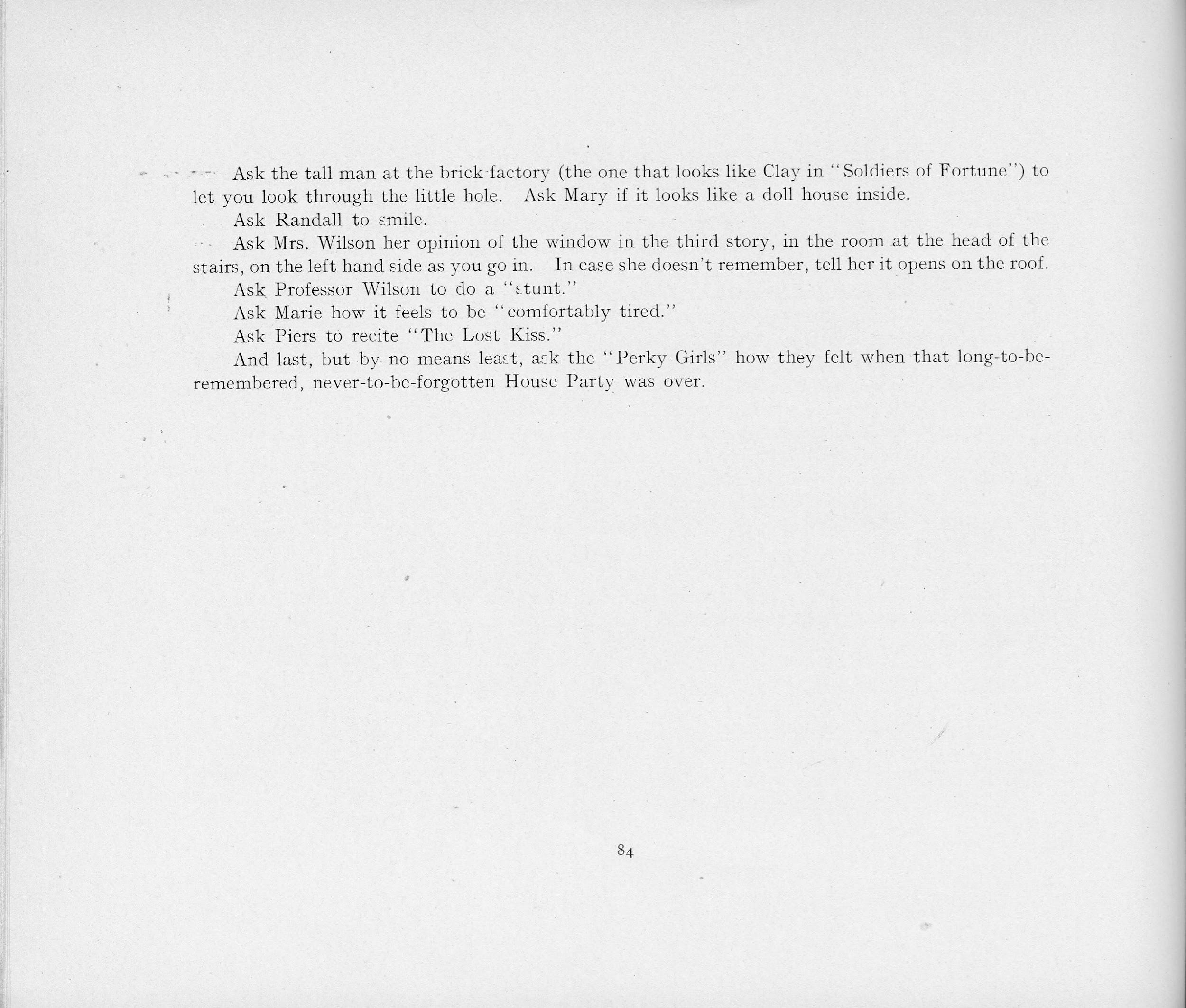
Ask the tall man at the brick4actory (the one that looks like Clay in " Soldiers of Fortune") to let you look through the little hole. Ask Mary if it looks like a doll house inside.
Ask Randall to smile.
Ask Mrs. Wilson her opinion of the window in the third story, in the room at the head of the stairs, on the left hand side as you go in. In case she doesn't remember, tell her it opens on the roof.
Ask Professor Wilson to do a 'stunt.'
Ask Marie how it feels to be " comfortably tired. "
Ask Piers to recite " The Lost Kiss. "
And last, but by no means least, ask the " Perky Girls" how they felt when that long-to-beremembered, never-to-be-forgotten House Party was over.

NEW HOPE
"What is so rare as a day in June?
Then, if ever, come perfect days."
T was.on the 16th of June, nineteen hundred and four, that several of the members of '05 set out for New Hope, to experience some of the " rare, perfect days," and nary a one was disappointed. It was the " Perky Party " with one or two exceptions, but the same chaperones and the Panama hat. Professor Wilson will explain that. The goal for which the party started was Inghamdale, or, in other words, " The House that Timothy built.
The history of the whole happy week would fill a large book, but the chief points can be obtained by inquiring
Of Sara Hawkins, how it feels to be lost.
Of Professor, how he enjoys the study of history ; and, in passing, do not forget to mention that blessed hat.
Of Helen Ross and Mary, how they earned the respective titles of " Compressed Gas " and " Hot Air." Ask them also what they know about witch-hazel.
Ask Ruth to recite " This is the House that Timothy Built.
Inquire of Alice how she enjoys an early morning row.
Of Helen Williams, how quinine tastes when it gets in one's toothbrush.
Of Professor, how he would like to become a professional turtle-hunter.
Of " The Salt," what is her opinion of strawberries. It might be well to ask the girls the same question.
Of Mrs. Wilson, her opinion of cherries.
Ask any girl how she enjoyed the straw-ride.
Ask Miss Alice White if we appreciated her goodness to us.
Ask Alice and Katharine and Piers, how they like the tail-board of a coal wagon, or a hay wagon, either, for that matter.
Ask Sara what she thinks of a " Silly Ass."
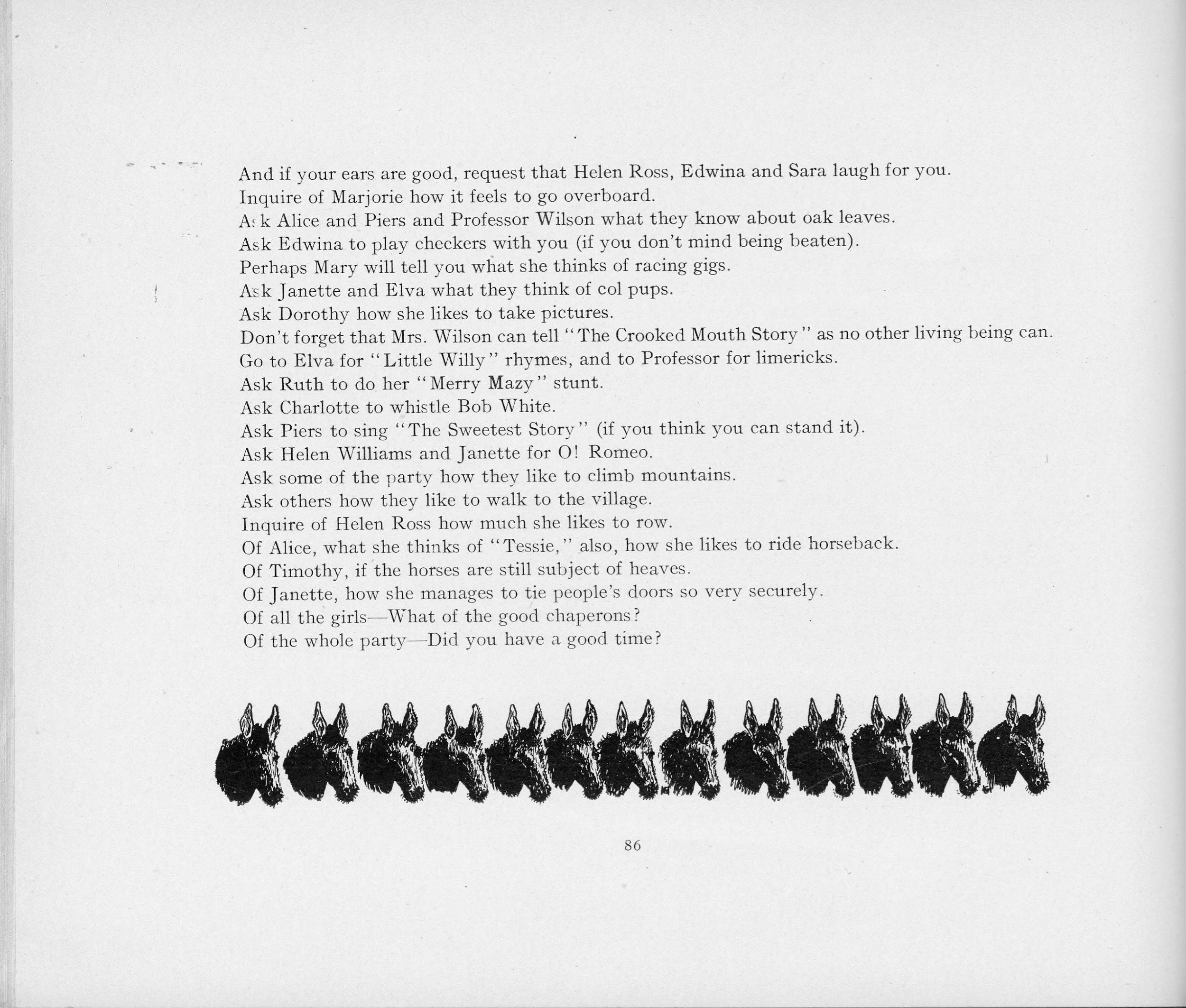
And if your ears are good, request that Helen Ross, Edwina and Sara laugh for you.
Inquire of Marjorie how it feels to go overboard.
As k Alice and Piers and Professor Wilson what they know about oak leaves.
Ask Edwina to play checkers with you (if you don't mind being beaten).
Perhaps Mary will tell you what she thinks of racing gigs.
Ask Janette and Elva what they think of col pups.
Ask Dorothy how she likes to take pictures.
Don't forget that Mrs. Wilson can tell " The Crooked Mouth Story " as no other living being can.
Go to Elva for " Little Willy " rhymes, and to Professor for limericks.
Ask Ruth to do her " Merry Mazy " stunt.
Ask Charlotte to whistle Bob White.
Ask Piers to sing " The Sweetest Story " (if you think you can stand it).
Ask Helen Williams and Janette for O! Romeo.
Ask some of the party how they like to climb mountains.
Ask others how they like to walk to the village.
Inquire of Helen Ross how much she likes to row.
Of Alice, what she thinks of " Tessie, " also, how she likes to ride horseback.
Of Timothy, if the horses are still subject of heaves.
Of Janette, how she manages to tie people's doors so very securely.
Of all the girls——What of the good chaperons ?
Of the whole party—Did you have a good time ?
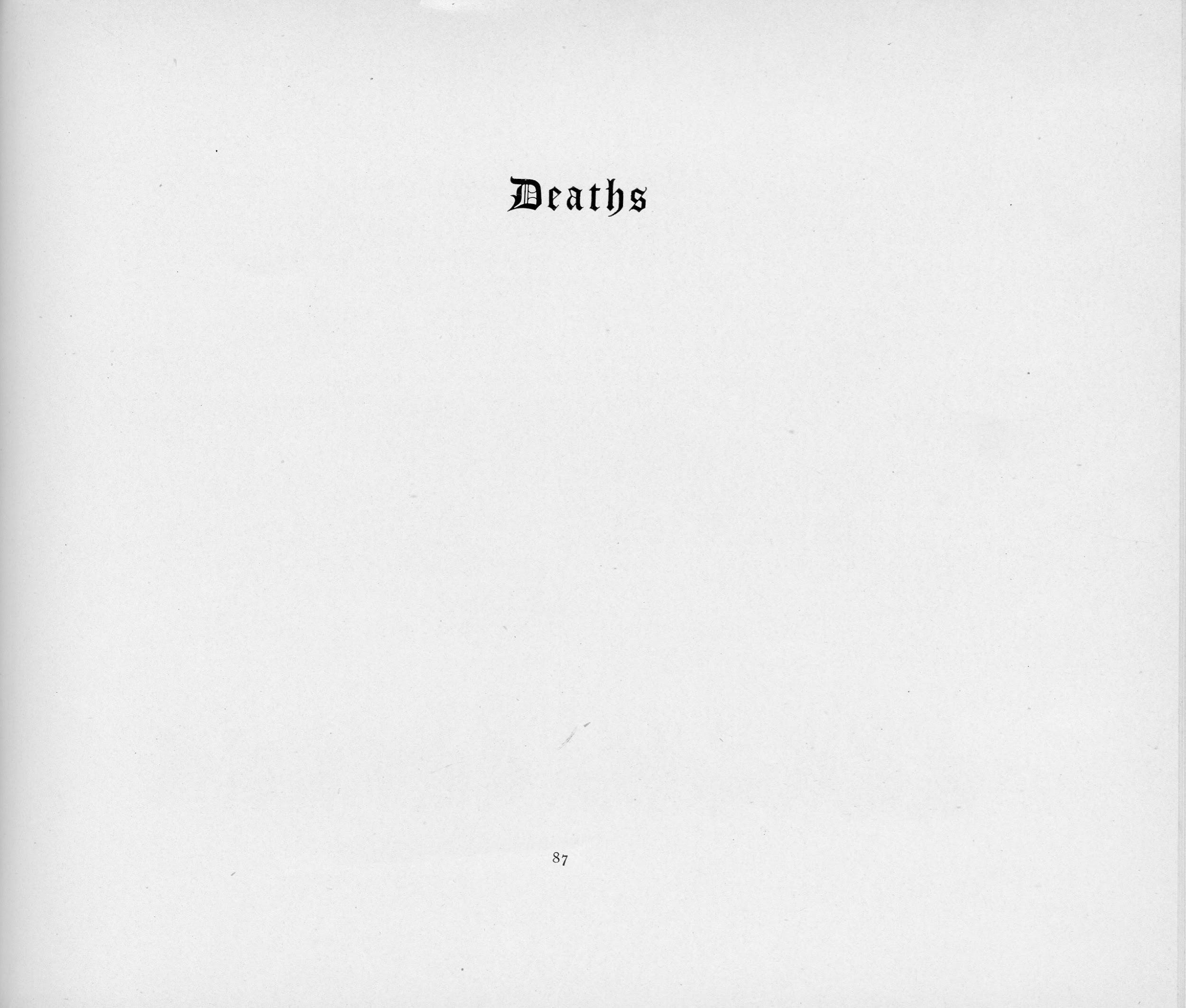
Ptatbs
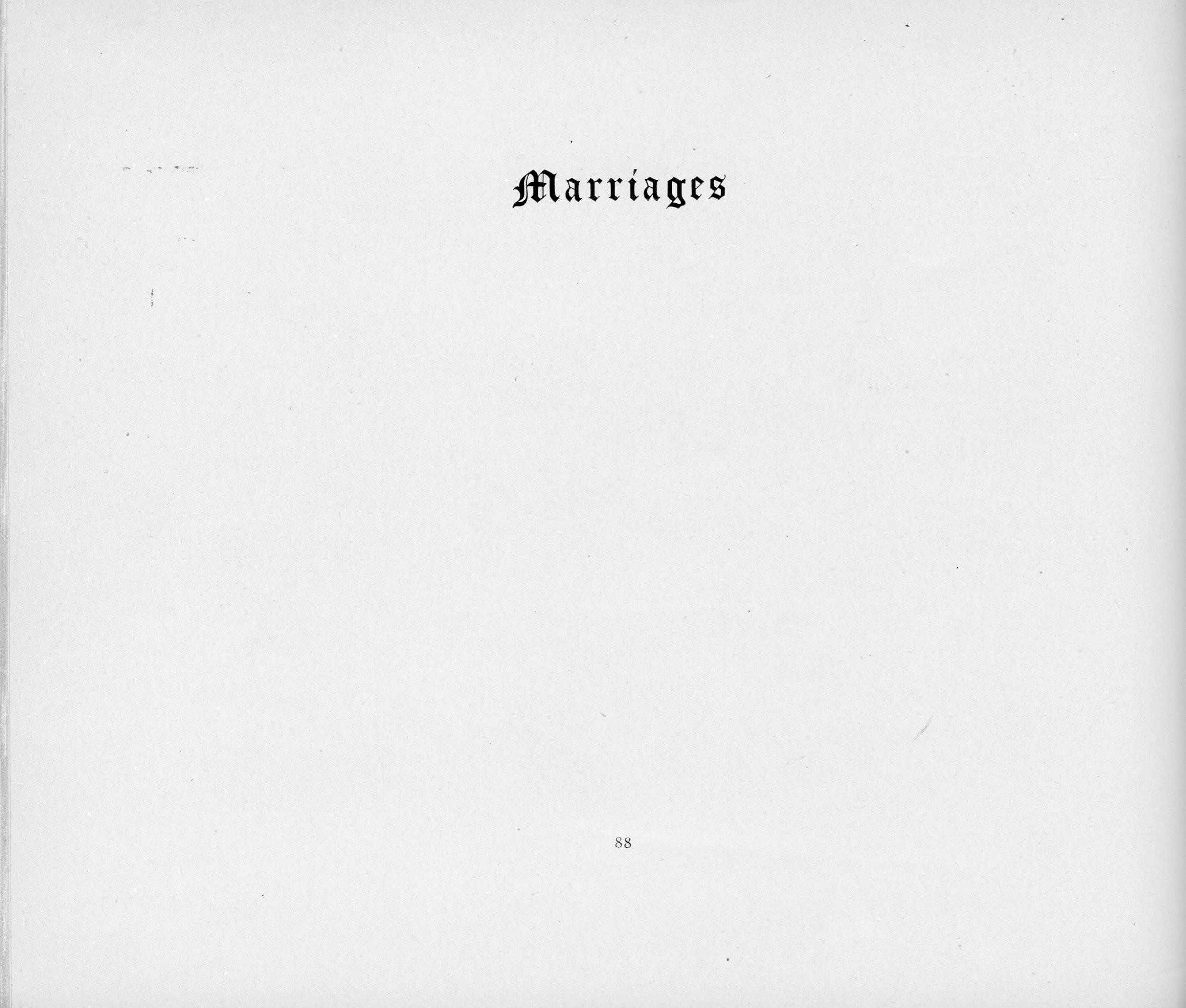
flarriagtg
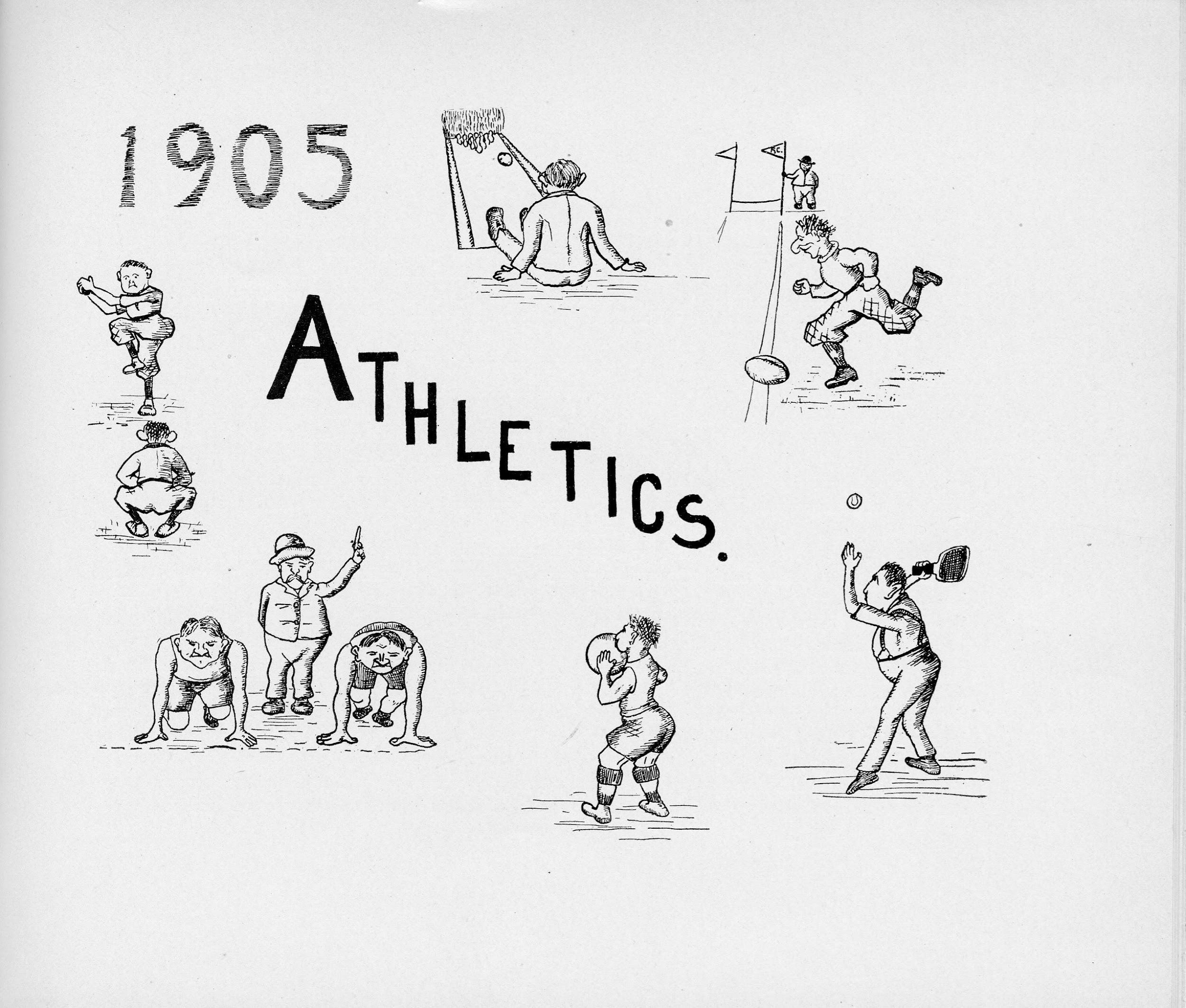
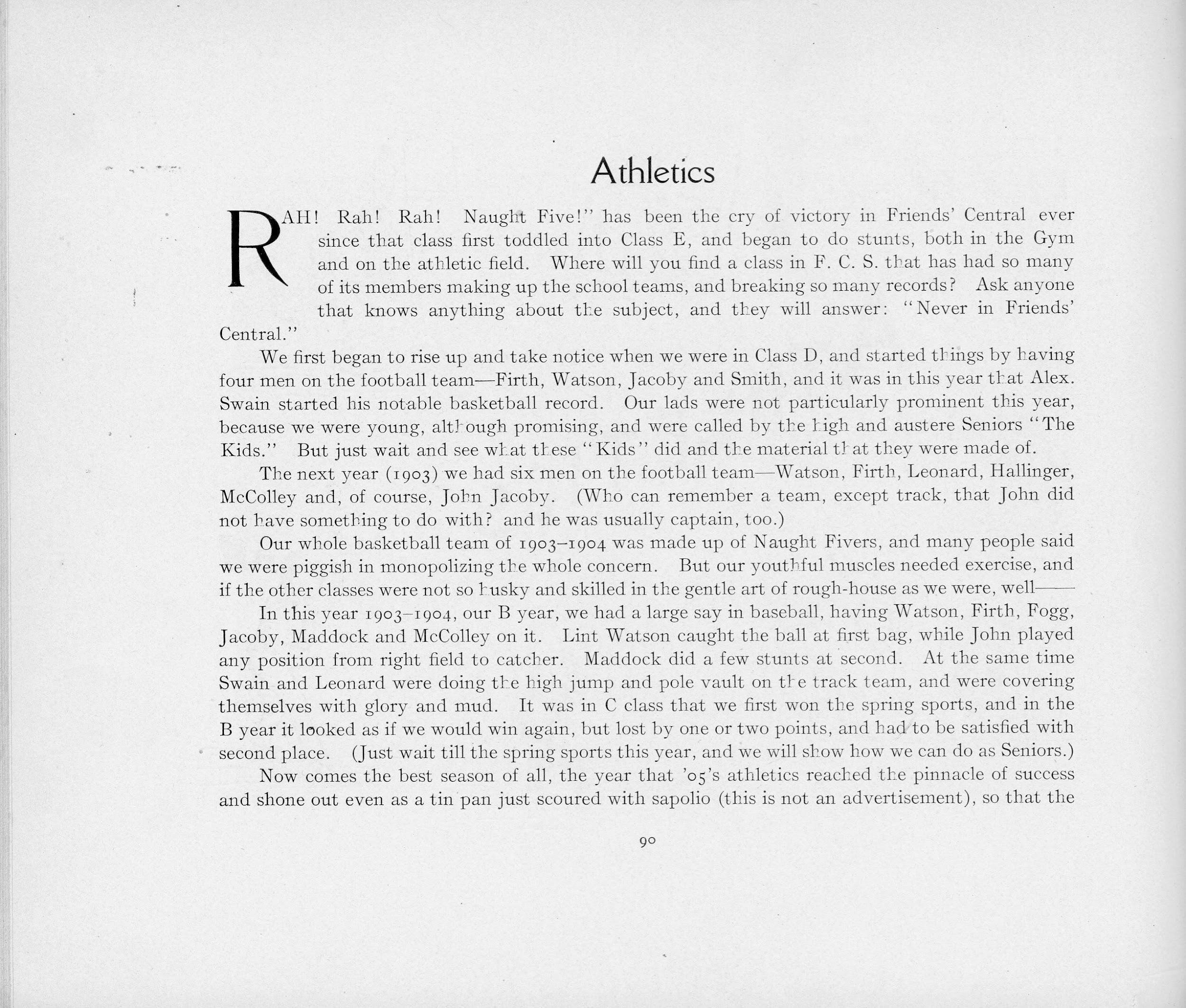
Athletics
All! Rah! Rah! Naught Five!" has been the cry of victory in Friends' Central ever since that class first toddled into Class E, and began to do stunts, both in the Gym and on the athletic field. Where will you find a class in F. C. S. that has had so many of its members making up the school teams, and breaking so many records? Ask anyone that knows anything about the subject, and they will answer: " Never in Friends' Central. "
We first began to rise up and take notice when we were in Class D, and started tl'ings by having four men on the football team—Firth, Watson, Jacoby and Smith, and it was in this year that Alex. Swain started his notable basketball record. Our lads were not particularly prominent this year, because we were young, although promising, and were called by the high and austere Seniors "The Kids." But just wait and see what ese " Kids " did and the material that they were made of.
The next year (1903) we had six men on the football team—Watson, Firth, Leonard, Hallinger, McColley and, of course, John Jacoby. (W 170 can remember a team, except track, that John did not have something to do with? and he was usually captain, too.)
Our whole basketball team of 1903—1904 was made up of Naught Fivers, and many people said we were piggish in monopolizing the whole concern. But our youthful muscles needed exercise, and if the other classes were not so I-usky and skilled in the gentle art of rough-house as we were, well—
In this year 1903—1904, our B year, we had a large say in baseball, having Watson, Firth, Fogg, Jacoby, Maddock and McColley on it. Lint Watson caught the ball at first bag, while John played any position from right field to catcher. Maddock did a few stunts at second. At the same time Swain and Leonard were doing the high jump and pole vault on the track team, and were covering themselves with glory and mud. It was in C class that we first won the spring sports, and in the B year it looked as if we would win again, but lost by one or two points, and had to be satisfied with second place. (Just wait till the spring sports this year, and we will show how we can do as Seniors.)
Now comes the best season of all, the year that '05's athletics reached the pinnacle of success and shone out even as a tin pan just scoured with sapolio (this is not an advertisement), so that the

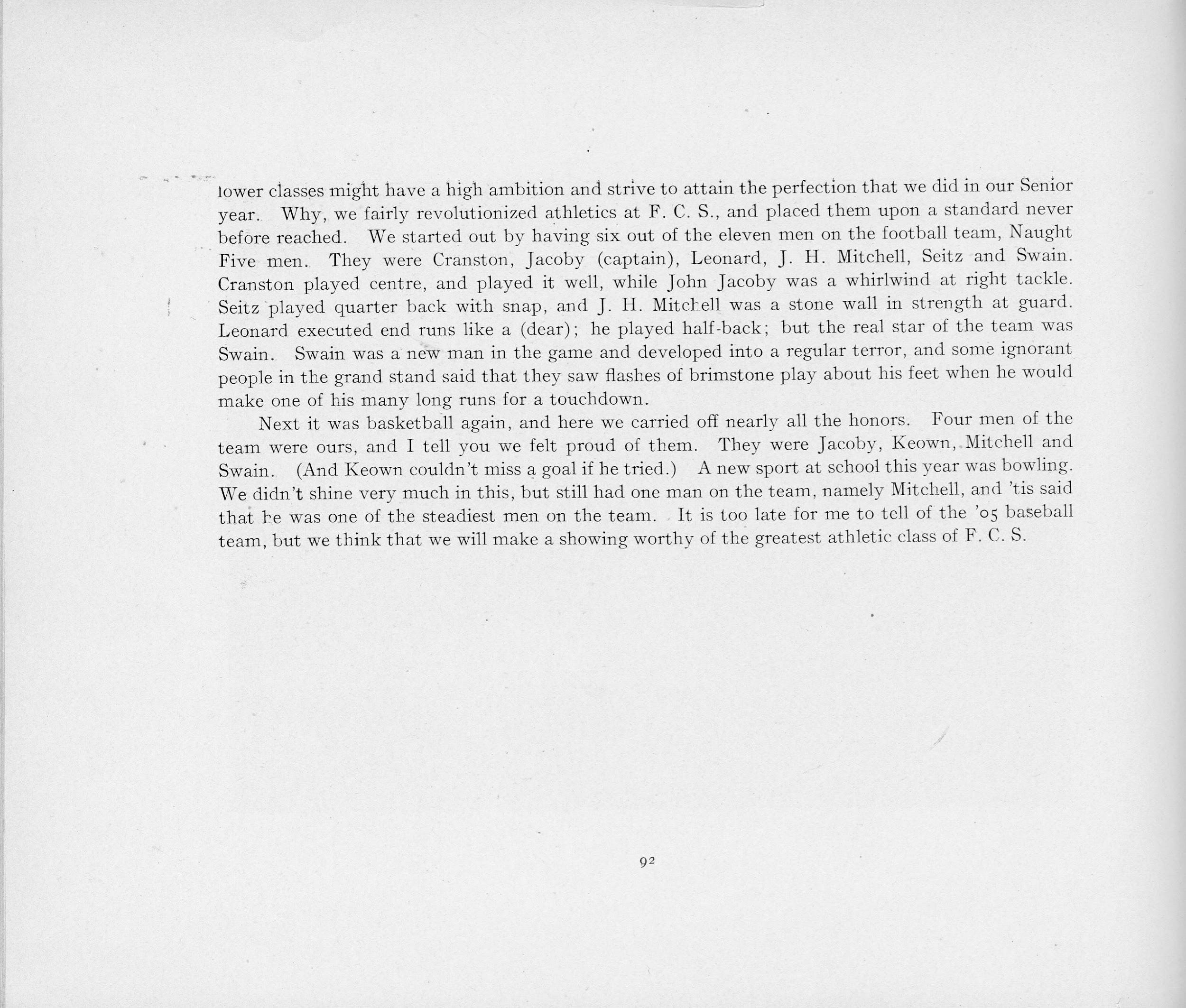
lower classes might have a high ambition and strive to attain the perfection that we did in our Senior year. Why, we fairly revolutionized athletics at F. C. S. , and placed them upon a standard never before reached. We started out by having six out of the eleven men on the football team, Naught Five men. They were Cranston, Jacoby (captain), Leonard, J. H. Mitchell, Seitz and Swain. Cranston played centre, and played it well, while John Jacoby was a whirlwind at right tackle. Seitz played quarter back with snap, and J. H. Mitchell was a stone wall in strength at guard.
Leonard executed end runs like a (dear); he played half-back; but the real star of the team was Swain. Swain was a new man in the game and developed into a regular terror, and some ignorant people in the grand stand said that they saw flashes of brimstone play about his feet when he would make one of his many long runs for a touchdown.
Next it was basketball again, and here we carried off nearly all the honors. Four men of the team were ours, and I tell you we felt proud of them. They were Jacoby, Keown, Mitchell and Swain. (And Keown couldn 't miss a goal if he tried.) A new sport at school this year was bowling. We didn't shine very much in this, but still had one man on the team, namely Mitchell, and 'tis said that Ize was one of the steadiest men on the team. It is too late for me to tell of the '05 baseball team, but we think that we will make a showing worthy of the greatest athletic class of F. C. S.
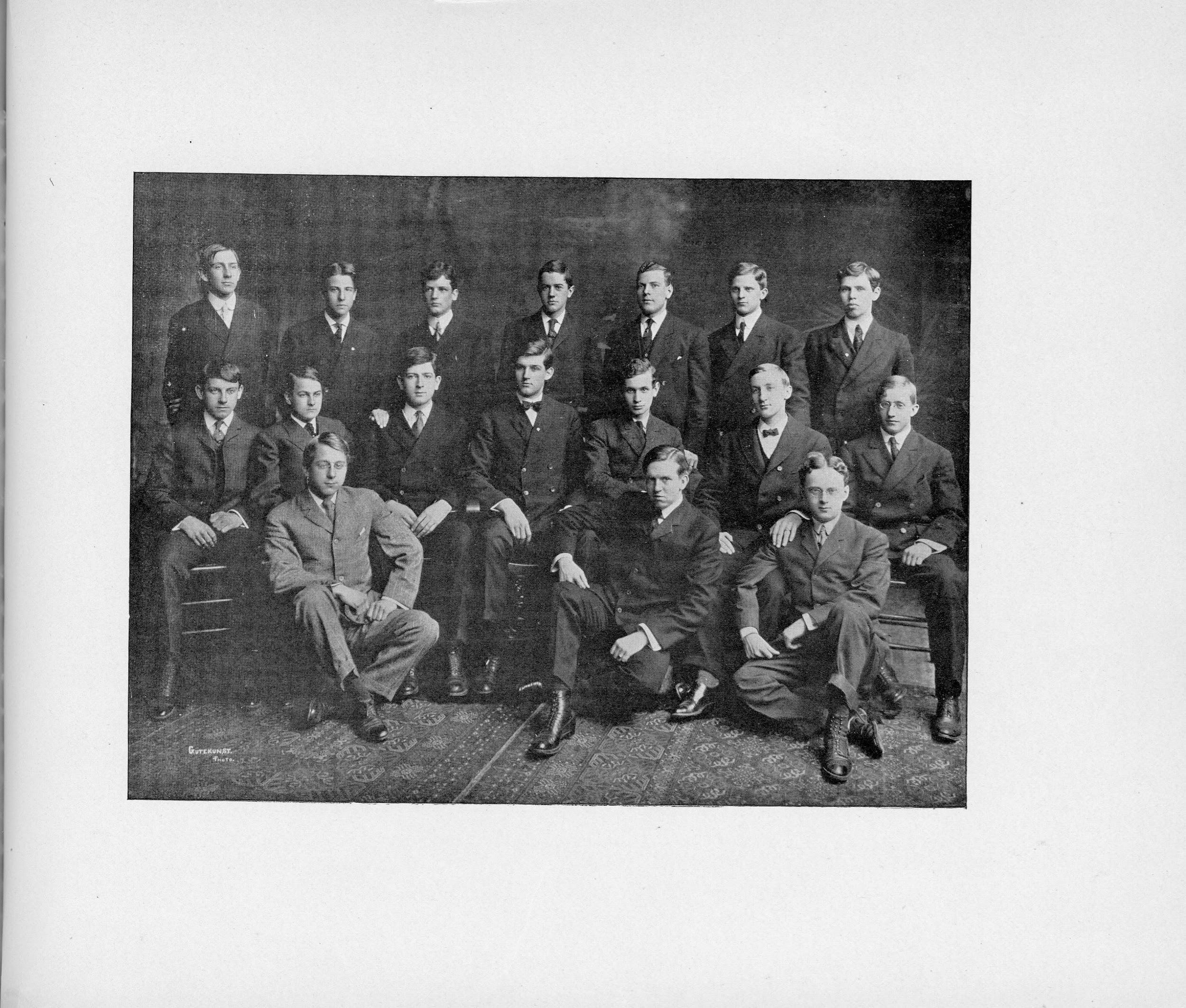
GIRLS' ATHLETICS
HE Class of Nineteen Hundred and Five has ever held a prominent place in the athletics of It was in a D year that we first showed our ability by winning Friends' Central School. the banner offered by Miss Thomas to the class scoring the most number of points in a contest. Our victorious representatives were Alice Ingram, Elva Blakey and Lydia Hunn. C year, Miss Thomas offered a silver cup, which we accordingly bore off in triumph, with Jeannette Keim, Elva Blakey, Alice Ingram, Katharine Tenbrook, Lucretia Shoemaker and Katharine Wolff as representatives. The contest at the end of our B year resulted in a victory of '05 again, Alice Ingram, Elva Blakey, Jeannette Keim and Katharine Wolff representing the class. These same girls in a recent contest secured the cup forever for 1905. It was in D year that we also attempted basketball for the first time. That year we had sectional teams, and numerous were the games between D 1, 2 and 3. Nevertheless, we did attempt games with the other classes, which ended in overwhelming defeat for 1905, but we were young and were told we would develop a strong team—a prophecy which was fulfilled. Although the following year 1903 won the championship, we made them work for it, defeating them in one game in a series of three. B year we graciously handed the championship to T 904, reminding them that they only secured it by one goal. Then in C we launched forth with our strong five and ended the season with a series of victories and the cup.
GIRLS ENTITLED TO WEAR F. Cs•
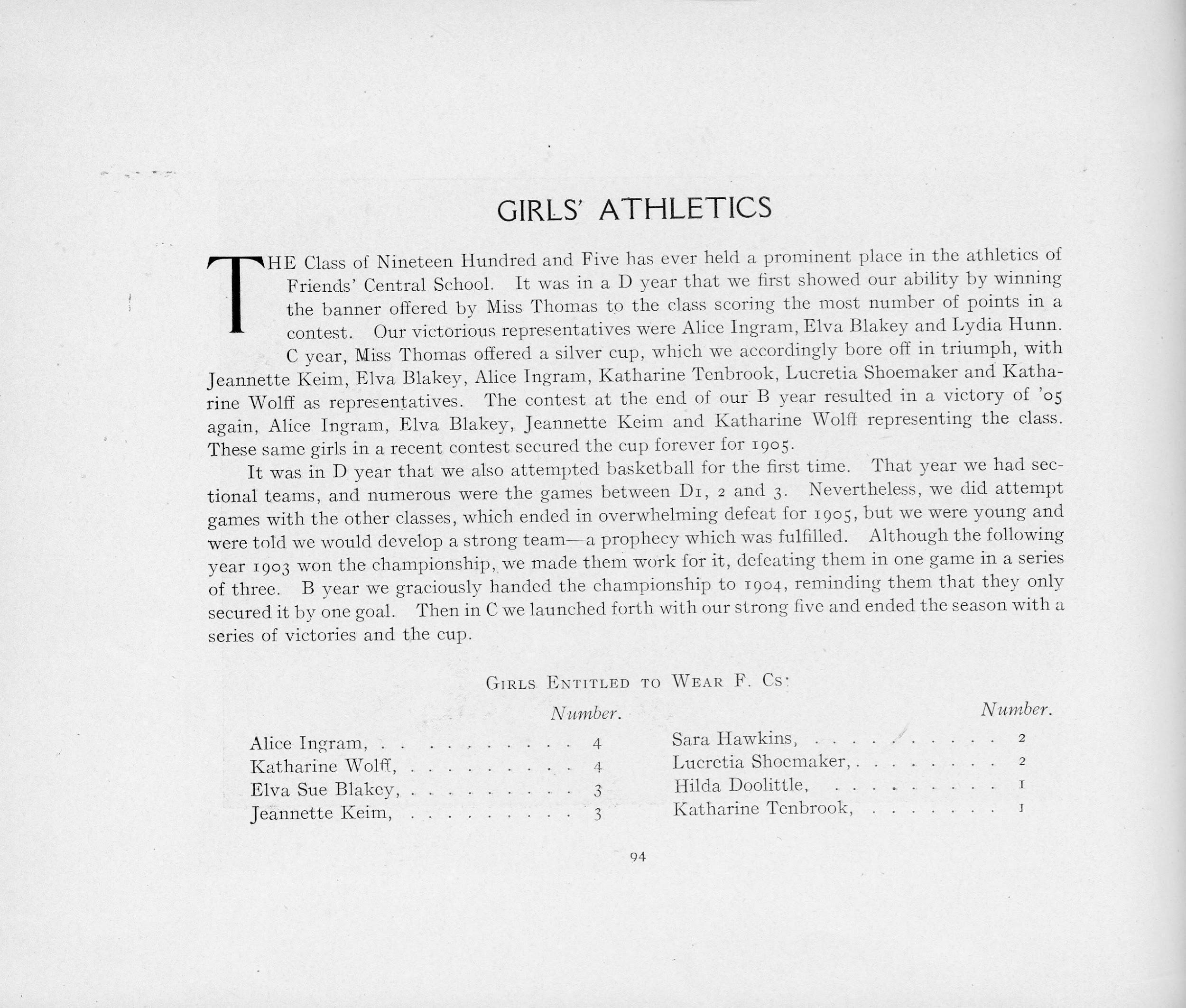
Alice Ingram, Katharine Wolff, Elva Sue Blakey, Jeannette Keim,
Sara Hawkins, Lucretia Shoemaker, Hilda Doolittle, Katharine Tenbrook,

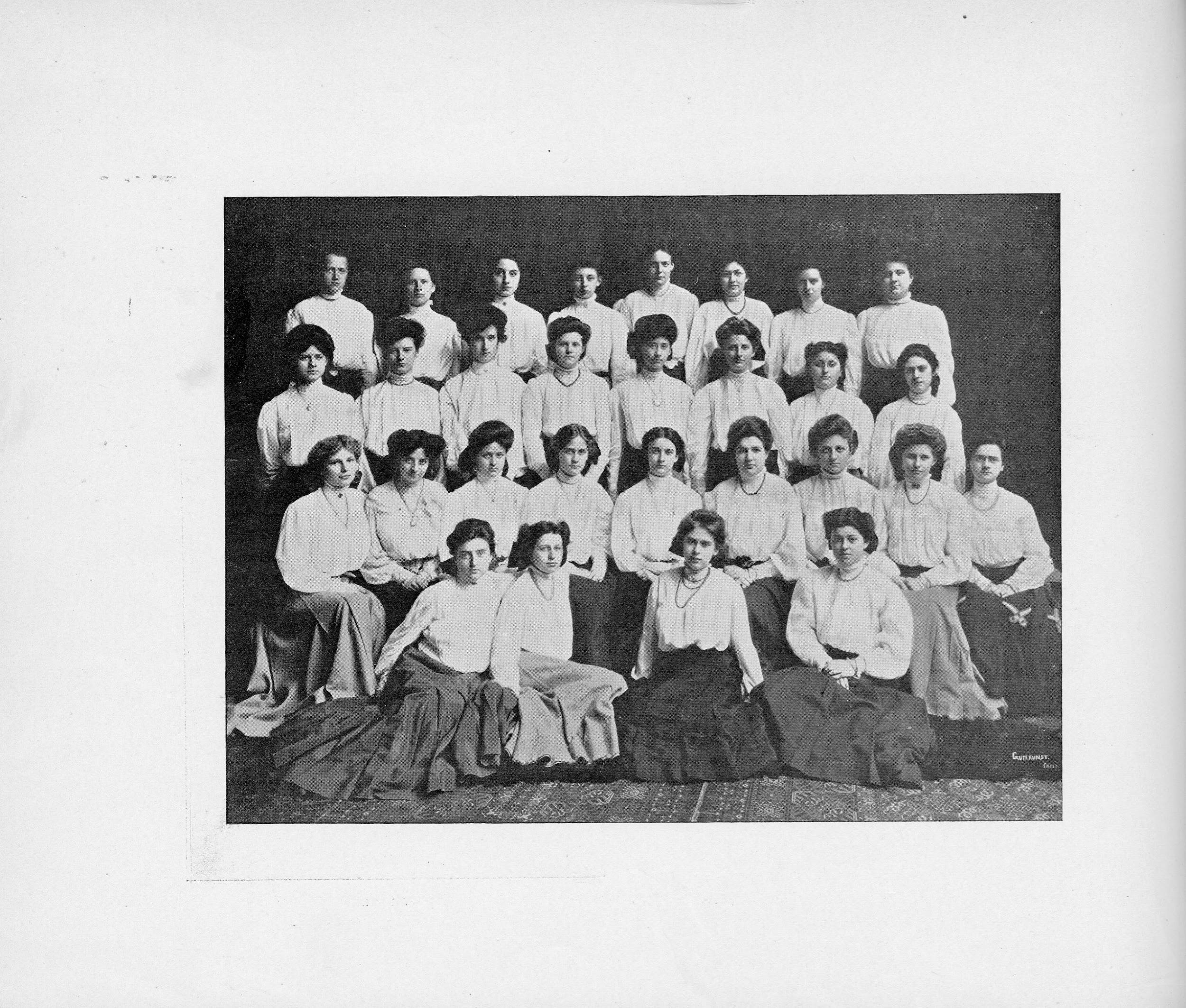
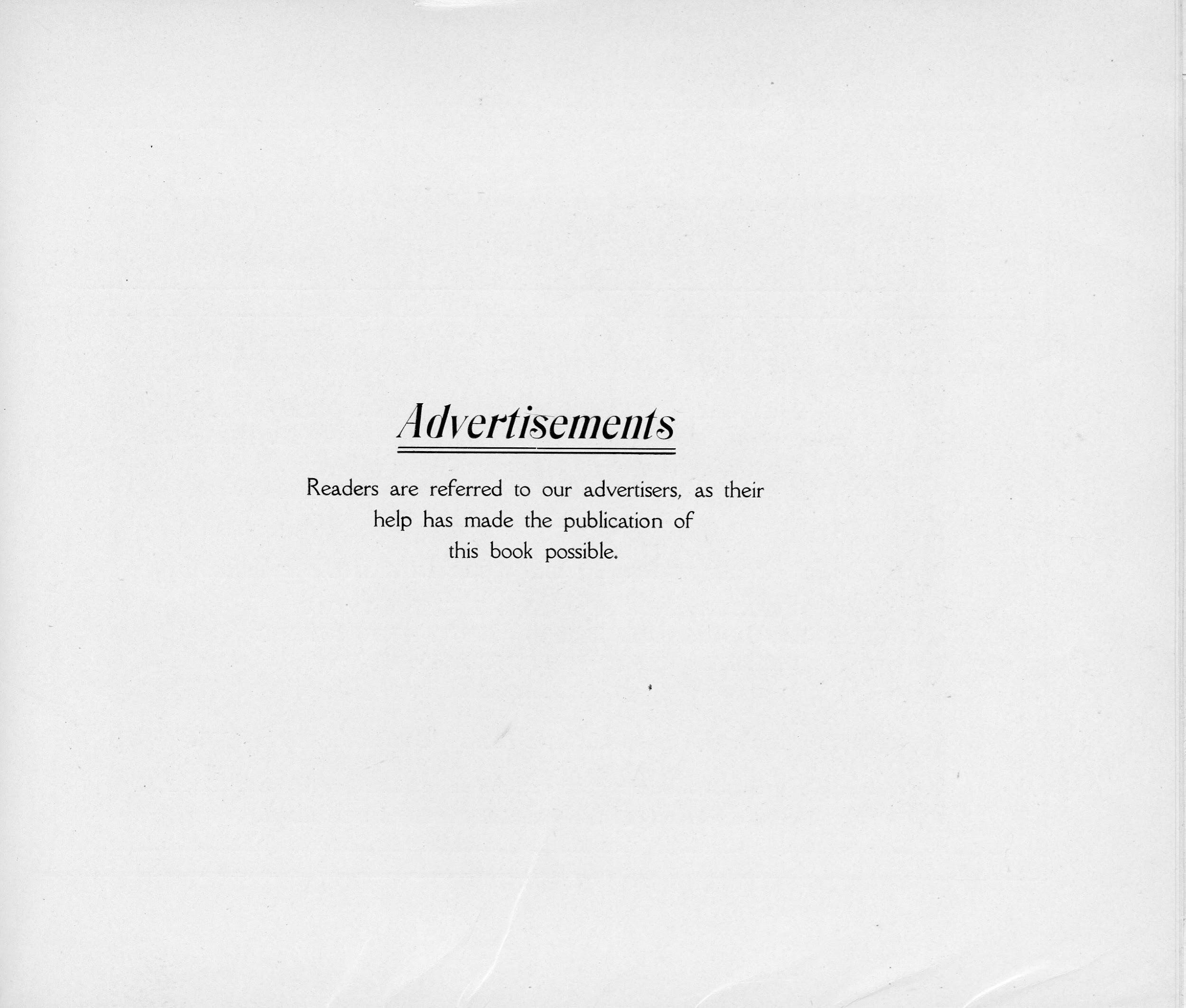
Advertisements
Readers are referred to our advertisers, as their help has made the publication of this book possible.
FRIENDS' SCHOOLS
PHILADELPHIA, PA.
FRIENDS' CENTRAL SCHOOL, -
Separate Departments for Girls and Boys.
Wholesome Moral Influences.
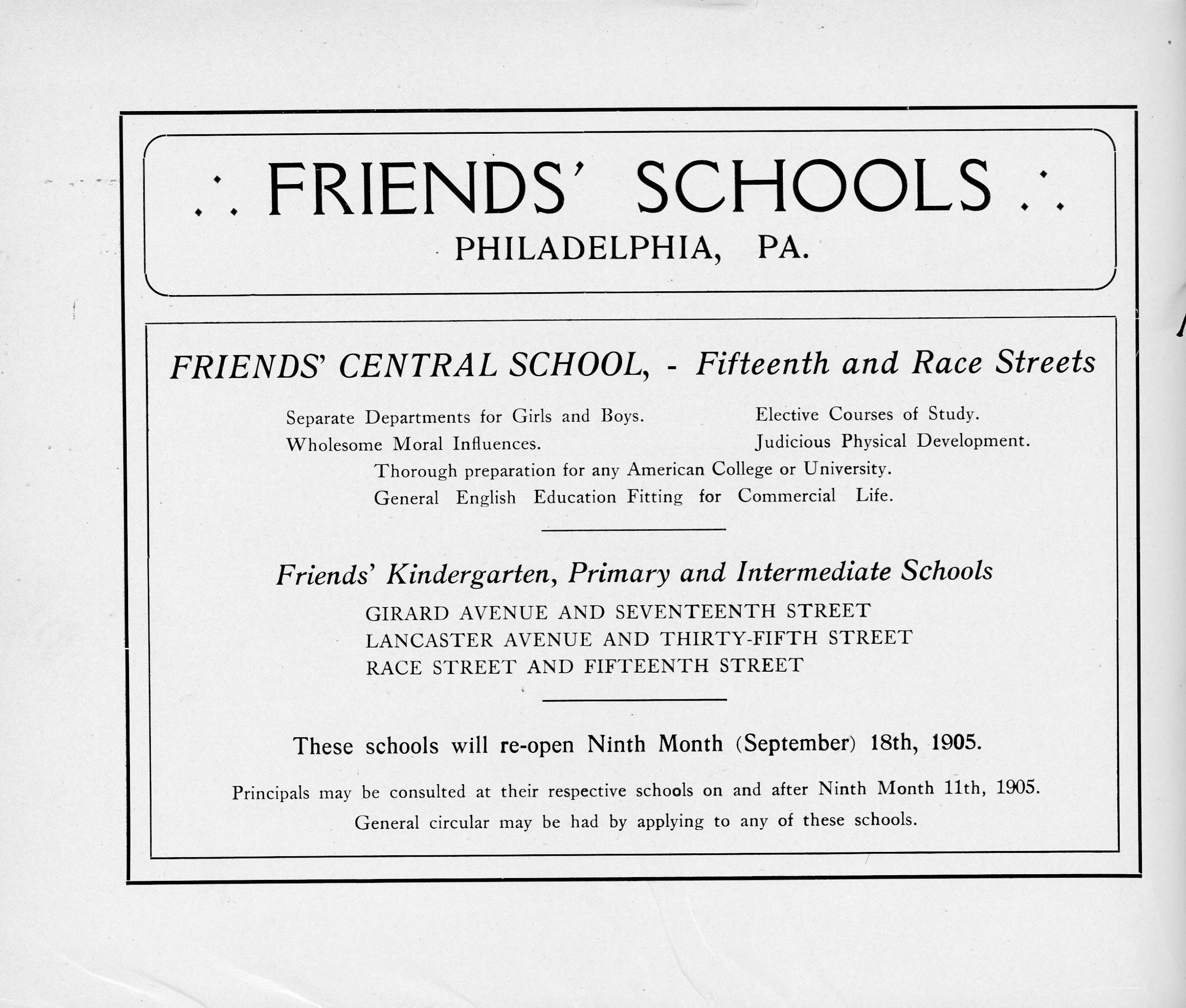
Fifteenth and Race Streets
Elective Courses of Study.
Judicious Physical Development.
Thorough preparation for any American College or University.
General English Education Fitting for Commercial Life.
Friends' Kindergarten, Primary and Intermediate Schools
GIRARD AVENUE AND SEVENTEENTH STREET
LANCASTER AVENUE AND THIRTY-FIFTH STREET
RACE STREET AND FIFTEENTH STREET
These schools will re-open Ninth Month (September) 18th, 1905.
Principals may be consulted at their respective schools on and after Ninth Month 11th, 1905.
General circular may be had by applying to any of these schools.
The Bailey, Banks and Biddle Company
PHILADELPHIA
CUSTOM

ESHLEMAN & CRAIG CO.
LAUNDRY 1127 Chestnut Street
PHILADELPHIA, PENNA.
HOTEL GORDON
SIXTEENTH AND 1 STREETS
WASHINGTON, D. C.
WM. P. KENNEY, Prop.
IN THE SELECT RESIDENTIAL DISTRICT OF WASHINGTON AND ONLY TWO SQUARES FROM THE WHITE HOUSE
EXCLUSIVELY AMERICAN PLAN
$3.50 PER DAY AND UPWARD 50 PRIVATE BATHS
SPECIAL RATES TO SCHOOL PARTIES
REFERENCE: To u RIST DEPT. PENN. R. R.
Designers and Manufacturers of CLASS PINS BADGES STICK PINS
CLASS RINGS CLASS STATIONERY
Designs and estimates of cost mailed on request. No obligation is incurred.
Graduating Offer
One Dozen Five Dollar Photographs and One Porcelain Miniature, value Two Dollars, all for $3.50 with this Advertisement
1228 Market Street
Swarthmore College
Under the care of Friends, is conveniently located eleven and a half miles from Philadelphia, in Delaware County, Pennsylvania.
Swarthmore
is a growing college. In 1904 the number of her buildings, instructors, and students was increased; her library enlarged ; and new courses in elementary law, science and engineering were added to her curriculum.
The courses offered are of practical value to both men and women, and upon their completion the degree of Bachelor of Arts is awarded.
For further information, address,

A1/ Friends' Central School Scholars
will want to join the out-of-door Bird Classes at Buck Hill Falls, conducted by Mary Mann Miller, daughter of Olive Thorn Miller. Buck Hill Falls is a summer settlement for Friends and Friendly people in the Pocono Mountains, consisting now of an Inn to accommodate 350 guests, and forty-five cottages surrounding; 720 acres, mostly woodland. Boating, tennis, good roads. Send for circular.
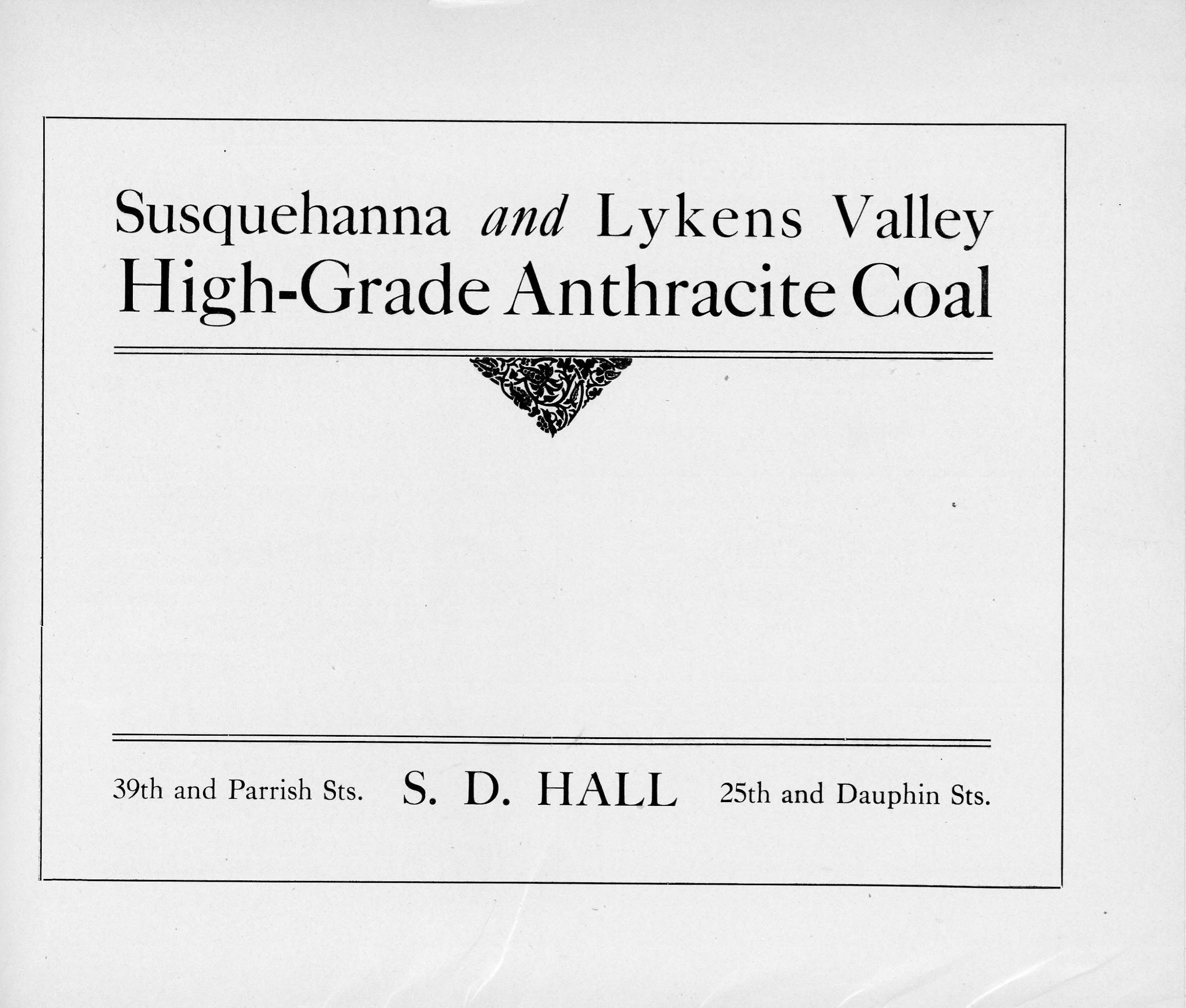
Susquehanna and Lykens Valley High-Grade Anthracite Coal
39th and Parrish Sts. S. D. HALL
25th and Dauphin Sts.
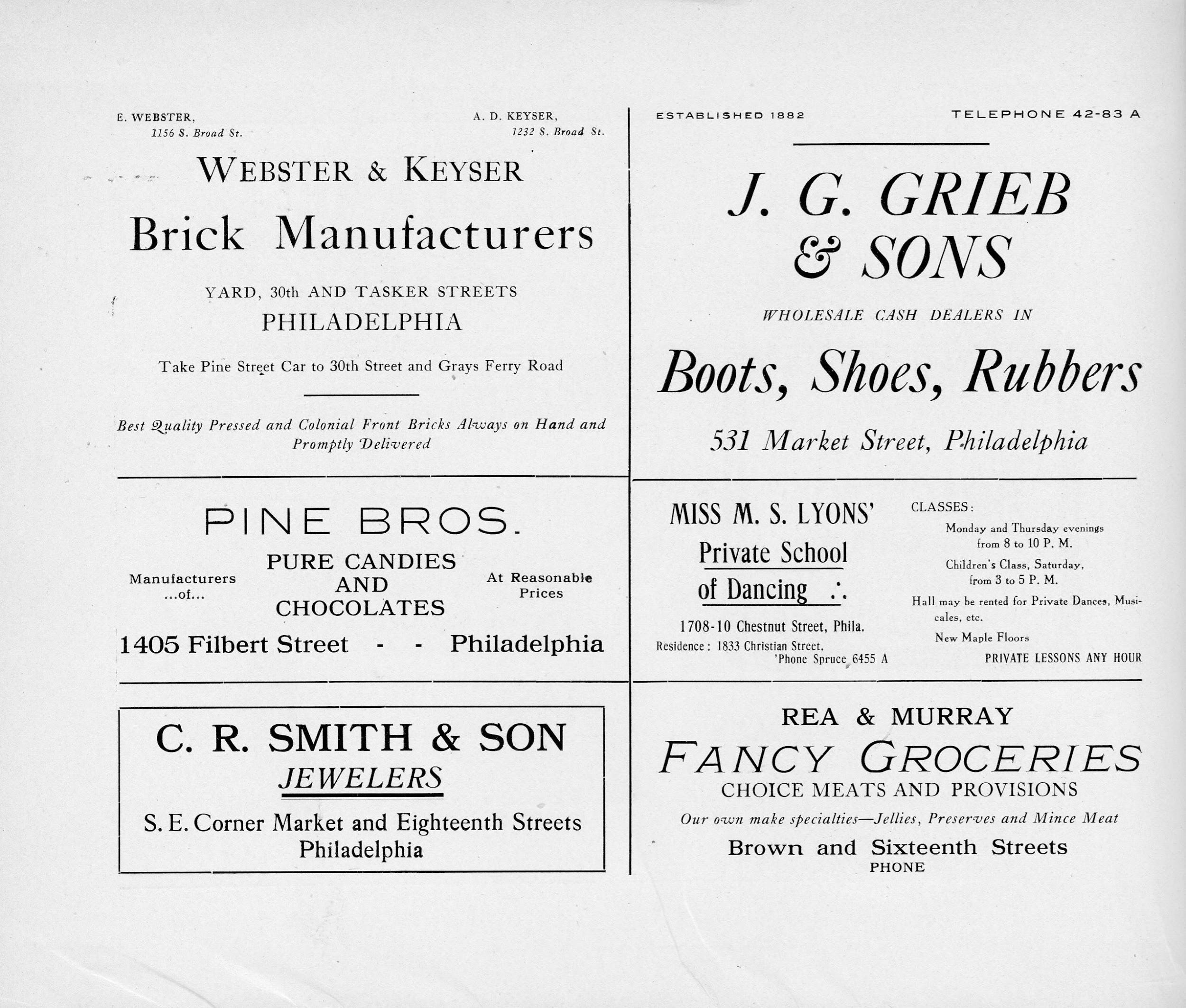
Counsellors
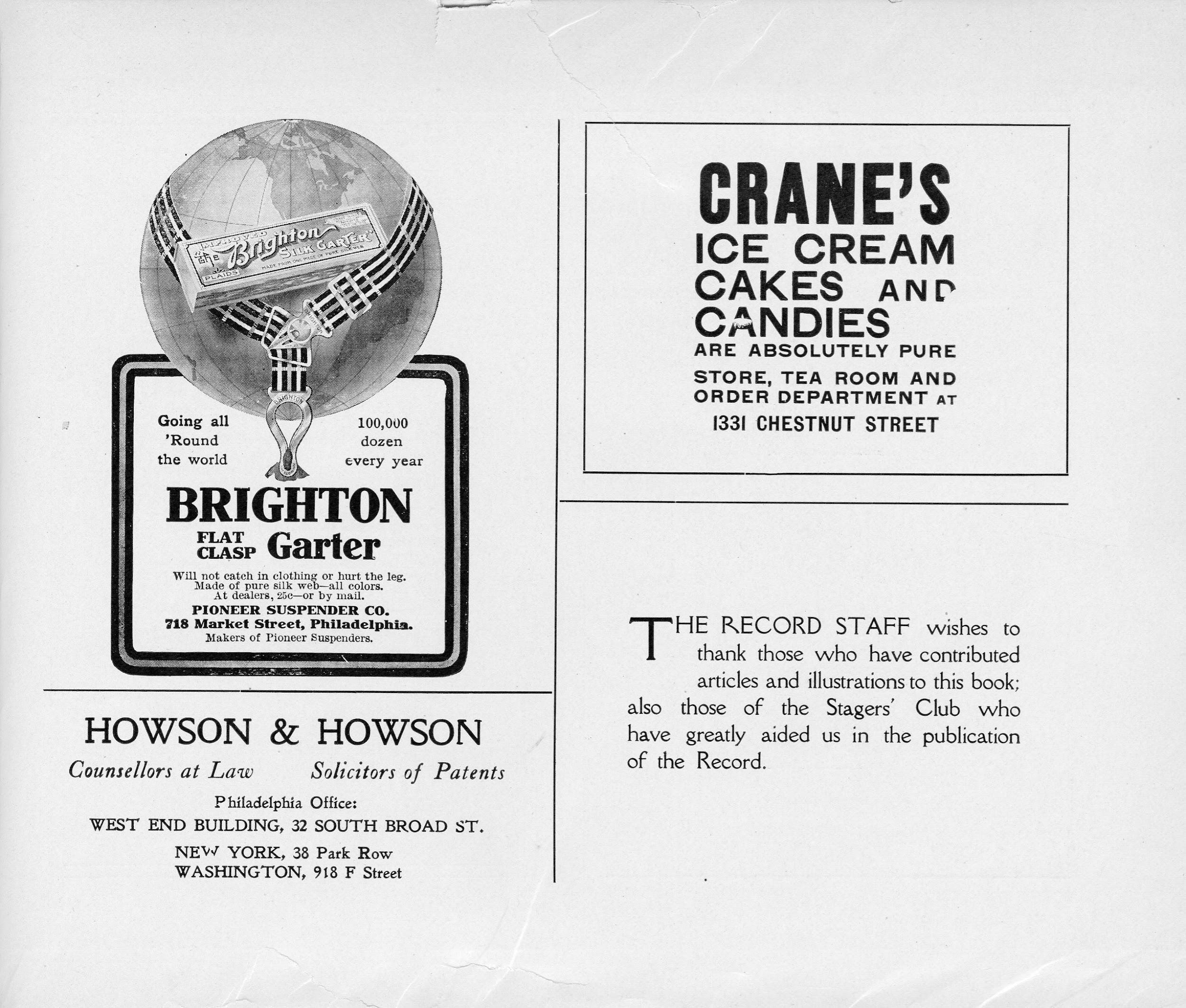
CRANE'S ICE CREAM CAKES AND CANDIES
ARE ABSOLUTELY PURE
STORE, TEA ROOM AND ORDER DEPARTMENT AT 1331 CHESTNUT STREET
THE RECORD STAFF wishes to 1 thank those who have contributed articles and illustrations to this book; also those of the Stagers' Club who have greatly aided us in the publication of the Record.
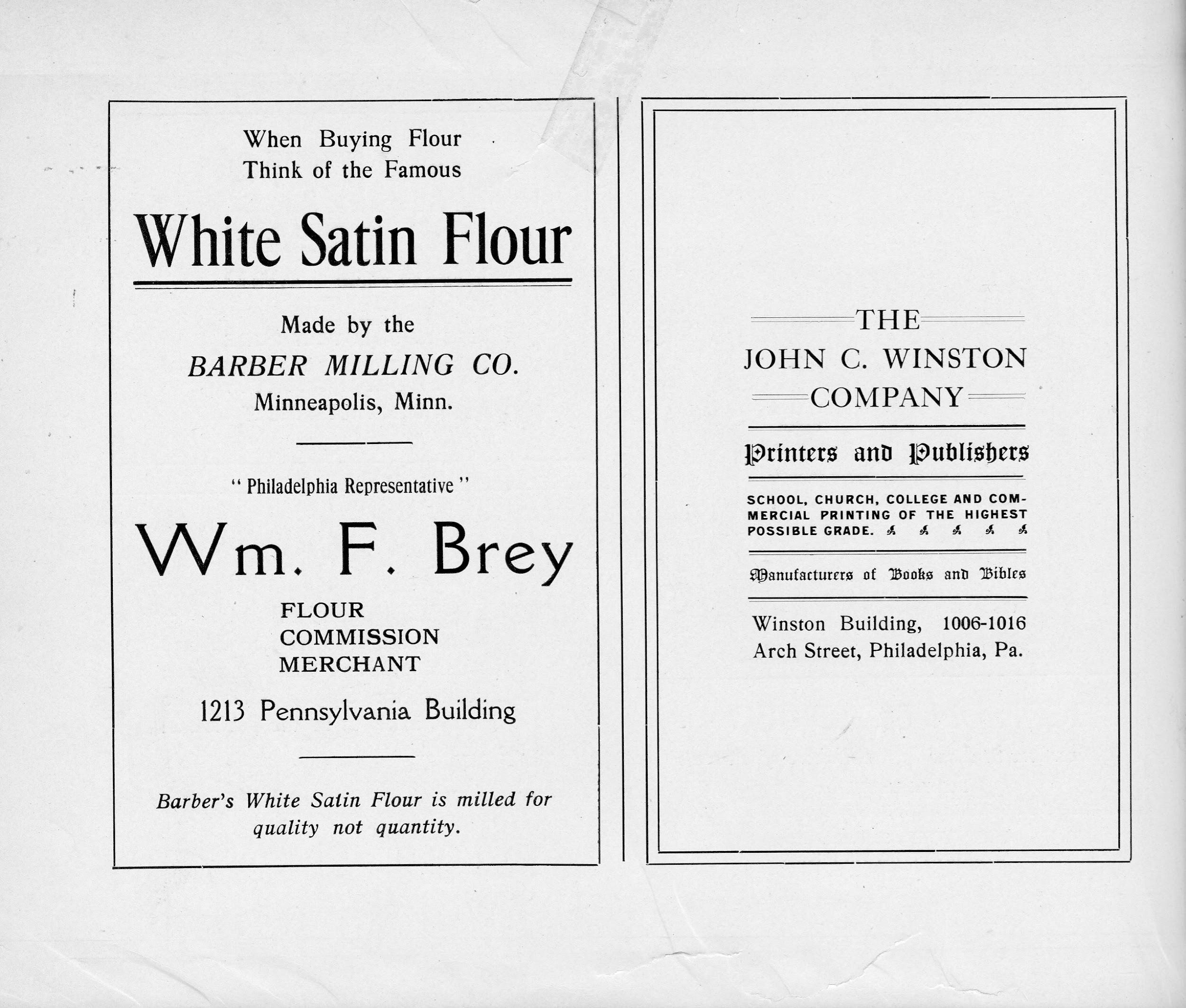
When Buying Flour
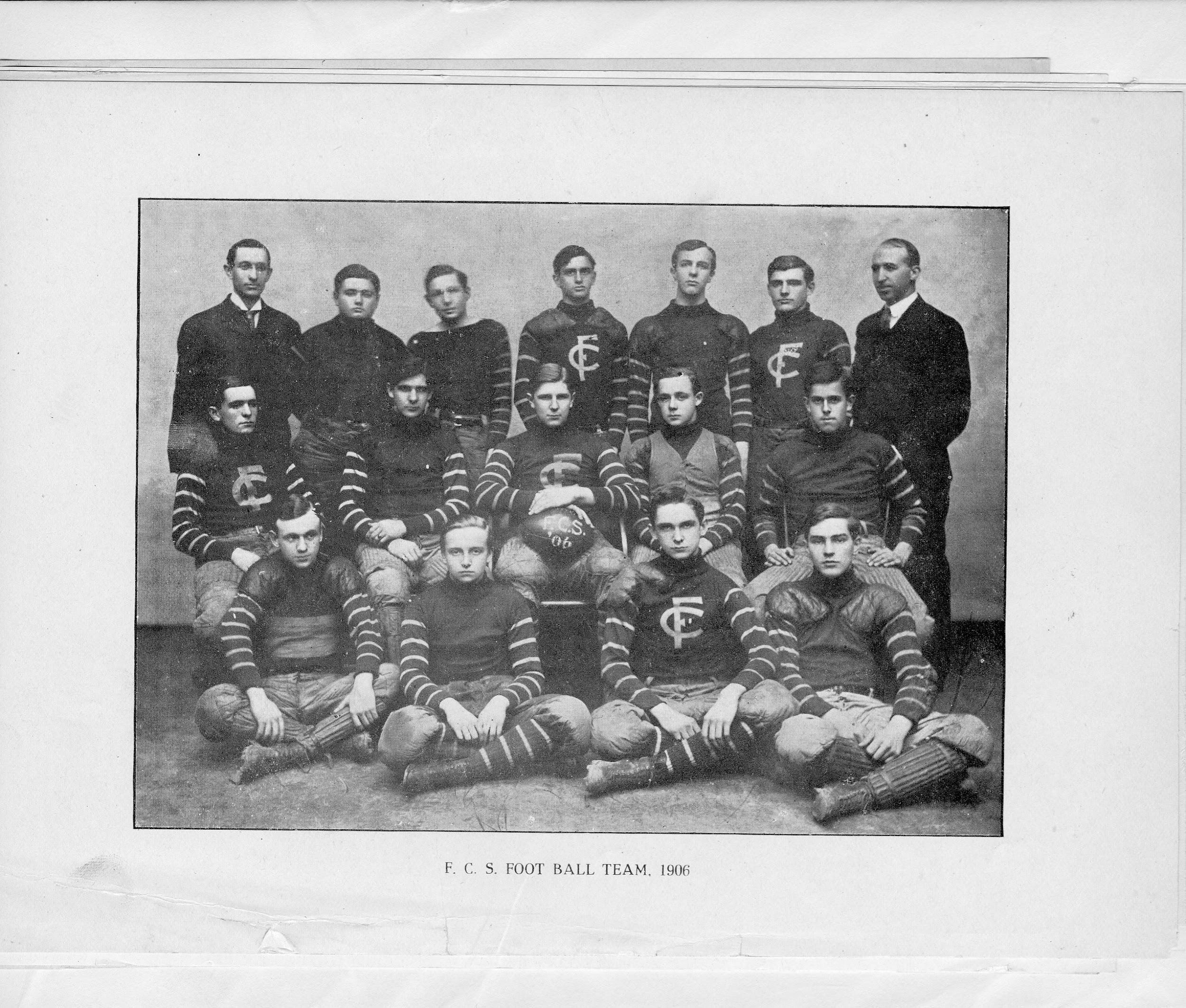
F. C. S. FOOT BALL TEAM. 1906
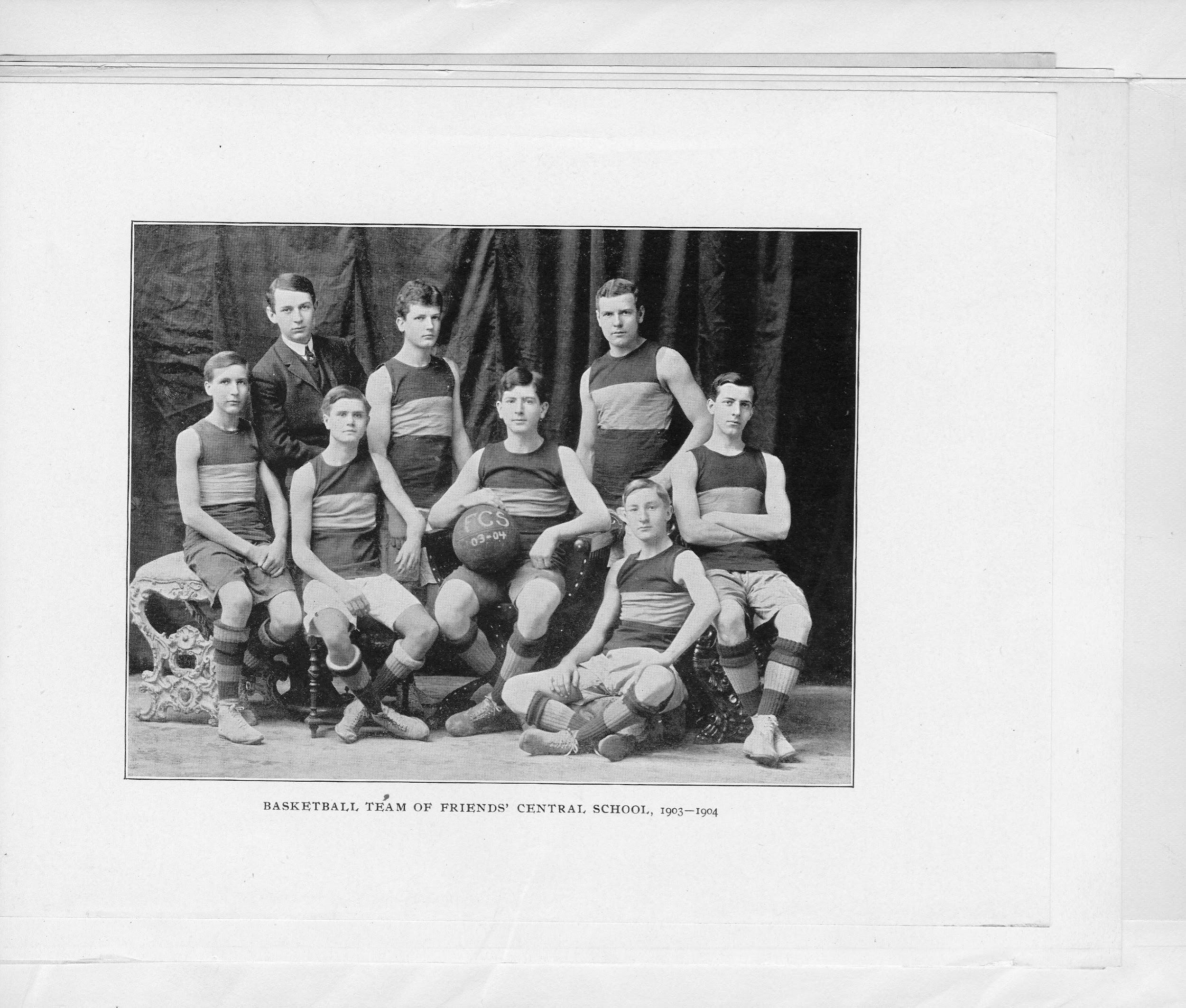
BASKETBALL TEAM OF FRIENDS' CENTRAL SCHOOL, 1903—1904
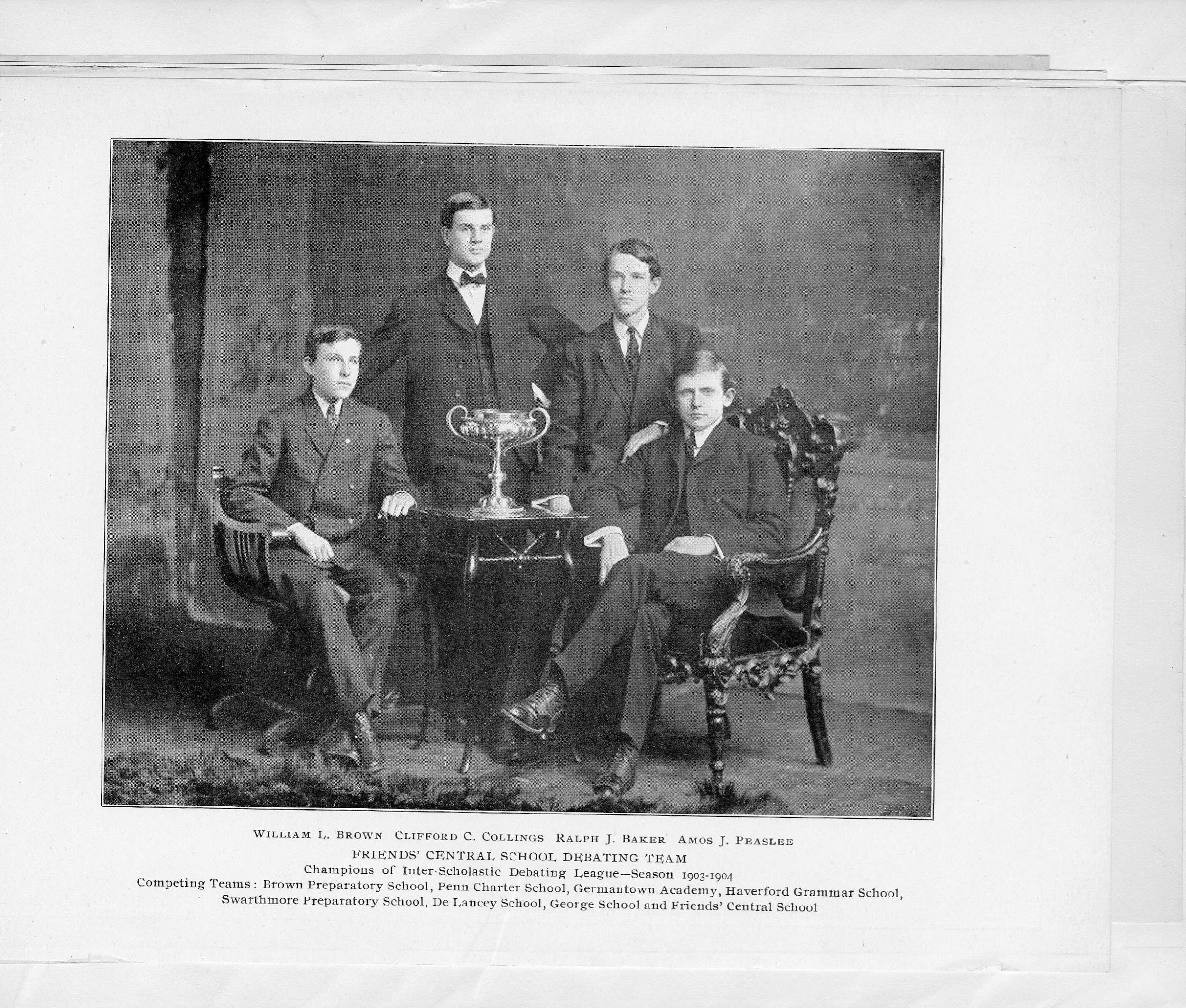
FRIENDS' CENTRAL SCHOOL DEBATING TEAM
Champions of Inter-Scholastic Debating League—Season 1903-1904
Competing Teams : Brown Preparatory School penn Charter School, Germantown Academy, Haverford Grammar School, Swarthmore Preparatory School, De Lancey School, George School and Friends' Central School
WILLIAM L. BROWN CLIFFORD C. COLLINGS RALPH J. BAKER AMOS J. PEASLEE

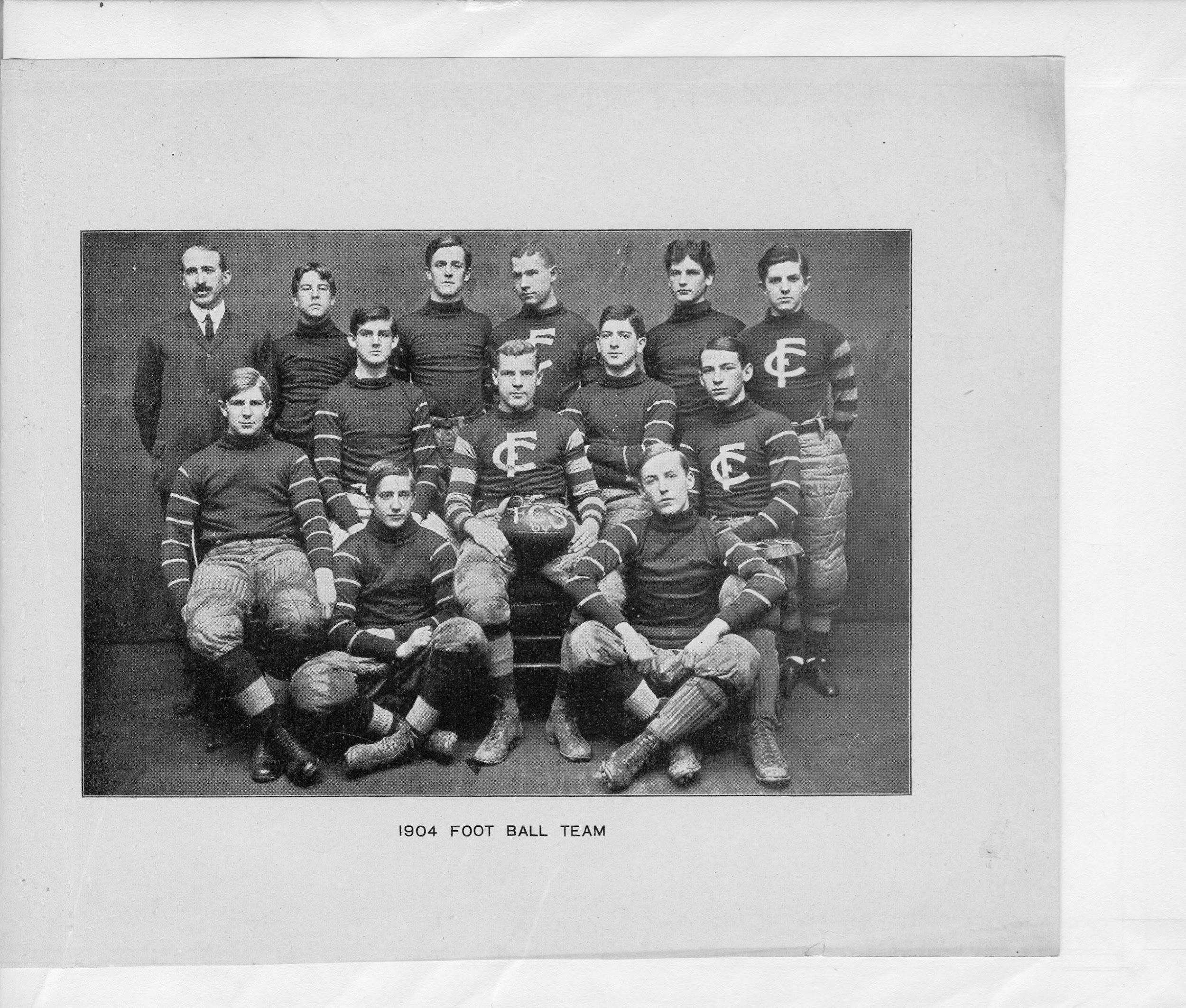
1904 FOOT BALL TEAM

